Shows
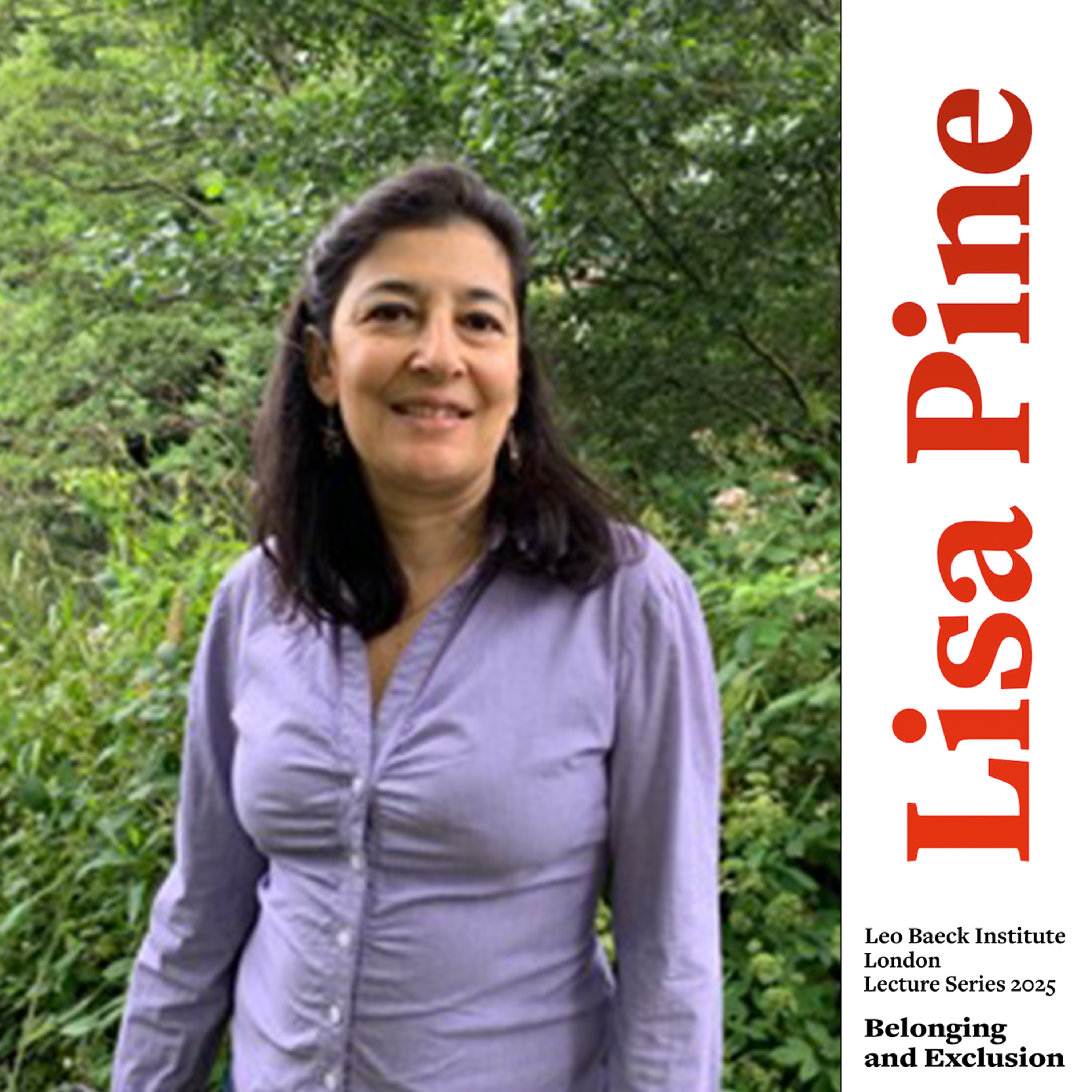 Leo Baeck Institute LondonHitler’s Mein Kampf: Reflections 100 Years OnLisa PineInstitute of Historical Research, School of Advanced Study, University of LondonHitler and the history of the Nazis remain extremely popular topics and ones that never cease to attract people’s interest, even fascination. It is crucial to comprehend the nature of Mein Kampf, the mindset of its author, Adolf Hitler, and the ideology he espoused that brought untold tragedy to millions of people – death, destruction, genocide and war. The book presents a dangerous set of ideas, regrettably ones that still have followers today, one hundred years after Mein Kampf was...2025-07-111h 30
Leo Baeck Institute LondonHitler’s Mein Kampf: Reflections 100 Years OnLisa PineInstitute of Historical Research, School of Advanced Study, University of LondonHitler and the history of the Nazis remain extremely popular topics and ones that never cease to attract people’s interest, even fascination. It is crucial to comprehend the nature of Mein Kampf, the mindset of its author, Adolf Hitler, and the ideology he espoused that brought untold tragedy to millions of people – death, destruction, genocide and war. The book presents a dangerous set of ideas, regrettably ones that still have followers today, one hundred years after Mein Kampf was...2025-07-111h 30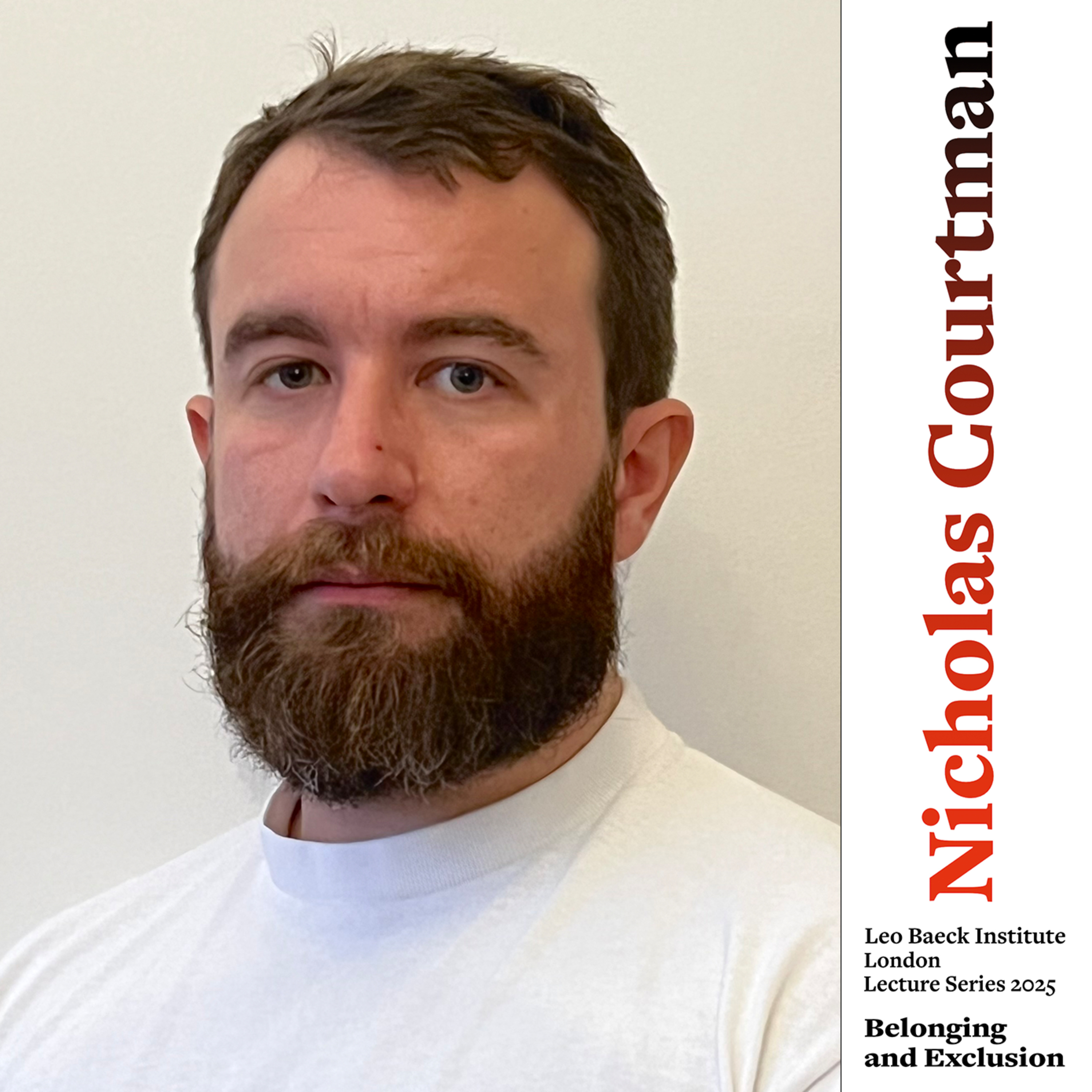 Leo Baeck Institute London(Un)Welcome Returns? Re-Naturalisation Rights of German Jews in GermanyNicholas CourtmanKing’s College LondonSince 1949, the Federal Republic of Germany has allowed former citizens, whose citizenship was revoked by the Nazis due to their Jewish faith or ‘race’, to reclaim it. Yet, over the past 75 years, there have been significant changes regarding which German Jews – and which descendants – can enjoy that right. This talk tracks those developments, from the restrictive, often antisemitic decisions made in the 1950s, to attempts to uphold those regulations in the following decades, through to the 2021 reform of the German Nationality Act that finally redressed such exclusions.Nicholas Courtman is a Postdoctoral Research Fellow in History an...2025-06-061h 22
Leo Baeck Institute London(Un)Welcome Returns? Re-Naturalisation Rights of German Jews in GermanyNicholas CourtmanKing’s College LondonSince 1949, the Federal Republic of Germany has allowed former citizens, whose citizenship was revoked by the Nazis due to their Jewish faith or ‘race’, to reclaim it. Yet, over the past 75 years, there have been significant changes regarding which German Jews – and which descendants – can enjoy that right. This talk tracks those developments, from the restrictive, often antisemitic decisions made in the 1950s, to attempts to uphold those regulations in the following decades, through to the 2021 reform of the German Nationality Act that finally redressed such exclusions.Nicholas Courtman is a Postdoctoral Research Fellow in History an...2025-06-061h 22 New Books in HistoryStefanie Fischer and Kim Wünschmann, "Oberbrechen: a German Village Confronts Its Nazi Past" (Oxford UP, 2024)Oberbrechen: A German Village Confronts Its Nazi Past (Oxford UP, 2024) is a new title in OUP's Graphic History Series that chronicles the events of the Holocaust and its aftermath in a small village in rural Germany. Based on meticulous research and using powerful visual storytelling, the book provides a multilayered narrative that explores the experiences of both Jewish and non-Jewish villagers from the First World War to the present. Its focus on how "ordinary" people experienced this time offers a new and illuminating insight into everyday life and the processes of violence, rupture, and reconciliation that characterized the history of...2025-04-1257 min
New Books in HistoryStefanie Fischer and Kim Wünschmann, "Oberbrechen: a German Village Confronts Its Nazi Past" (Oxford UP, 2024)Oberbrechen: A German Village Confronts Its Nazi Past (Oxford UP, 2024) is a new title in OUP's Graphic History Series that chronicles the events of the Holocaust and its aftermath in a small village in rural Germany. Based on meticulous research and using powerful visual storytelling, the book provides a multilayered narrative that explores the experiences of both Jewish and non-Jewish villagers from the First World War to the present. Its focus on how "ordinary" people experienced this time offers a new and illuminating insight into everyday life and the processes of violence, rupture, and reconciliation that characterized the history of...2025-04-1257 min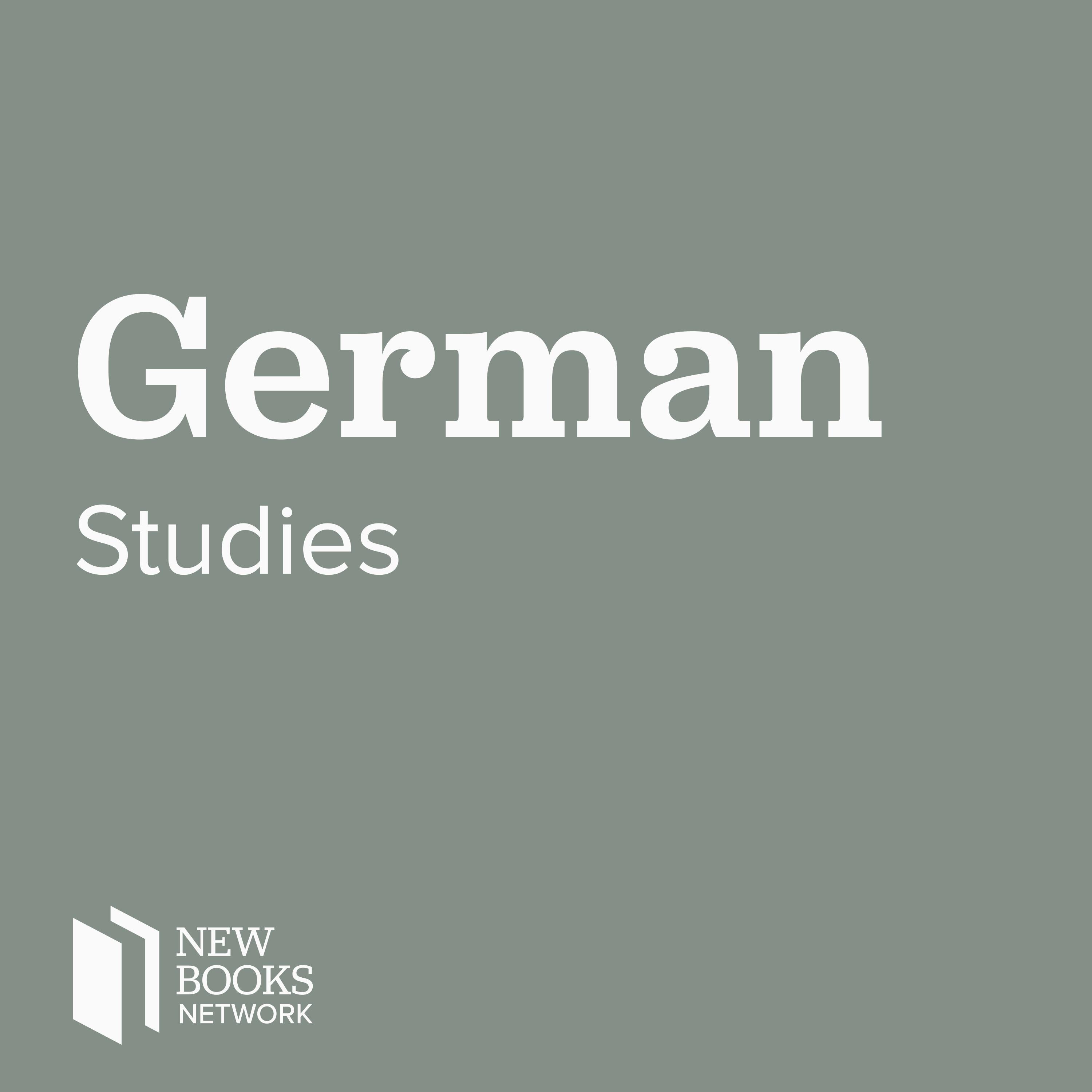 New Books in German StudiesStefanie Fischer and Kim Wünschmann, "Oberbrechen: a German Village Confronts Its Nazi Past" (Oxford UP, 2024)Oberbrechen: A German Village Confronts Its Nazi Past (Oxford UP, 2024) is a new title in OUP's Graphic History Series that chronicles the events of the Holocaust and its aftermath in a small village in rural Germany. Based on meticulous research and using powerful visual storytelling, the book provides a multilayered narrative that explores the experiences of both Jewish and non-Jewish villagers from the First World War to the present. Its focus on how "ordinary" people experienced this time offers a new and illuminating insight into everyday life and the processes of violence, rupture, and reconciliation that characterized the history of...2025-04-0757 min
New Books in German StudiesStefanie Fischer and Kim Wünschmann, "Oberbrechen: a German Village Confronts Its Nazi Past" (Oxford UP, 2024)Oberbrechen: A German Village Confronts Its Nazi Past (Oxford UP, 2024) is a new title in OUP's Graphic History Series that chronicles the events of the Holocaust and its aftermath in a small village in rural Germany. Based on meticulous research and using powerful visual storytelling, the book provides a multilayered narrative that explores the experiences of both Jewish and non-Jewish villagers from the First World War to the present. Its focus on how "ordinary" people experienced this time offers a new and illuminating insight into everyday life and the processes of violence, rupture, and reconciliation that characterized the history of...2025-04-0757 min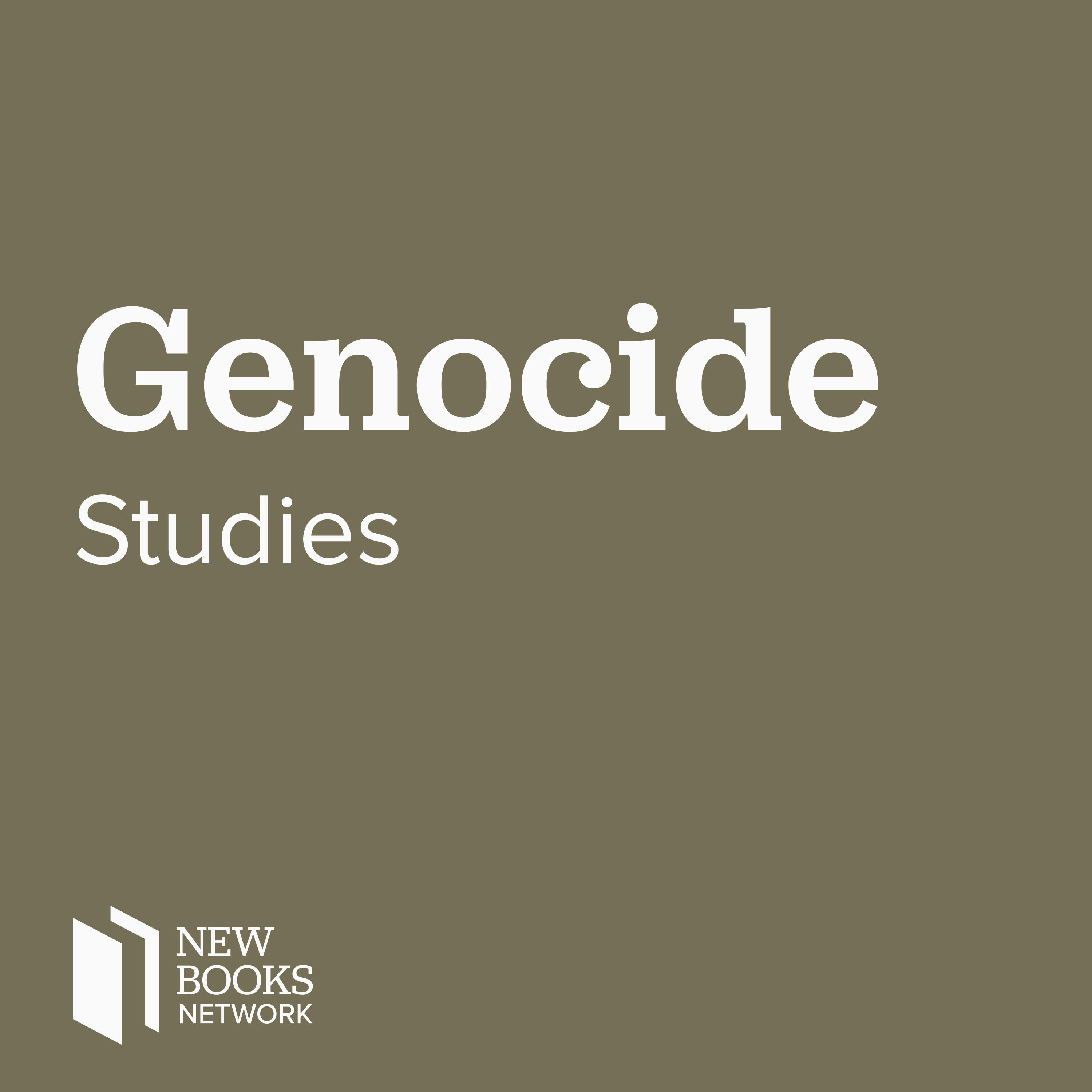 New Books in Genocide StudiesStefanie Fischer and Kim Wünschmann, "Oberbrechen: a German Village Confronts Its Nazi Past" (Oxford UP, 2024)Oberbrechen: A German Village Confronts Its Nazi Past (Oxford UP, 2024) is a new title in OUP's Graphic History Series that chronicles the events of the Holocaust and its aftermath in a small village in rural Germany. Based on meticulous research and using powerful visual storytelling, the book provides a multilayered narrative that explores the experiences of both Jewish and non-Jewish villagers from the First World War to the present. Its focus on how "ordinary" people experienced this time offers a new and illuminating insight into everyday life and the processes of violence, rupture, and reconciliation that characterized the history of...2025-04-0757 min
New Books in Genocide StudiesStefanie Fischer and Kim Wünschmann, "Oberbrechen: a German Village Confronts Its Nazi Past" (Oxford UP, 2024)Oberbrechen: A German Village Confronts Its Nazi Past (Oxford UP, 2024) is a new title in OUP's Graphic History Series that chronicles the events of the Holocaust and its aftermath in a small village in rural Germany. Based on meticulous research and using powerful visual storytelling, the book provides a multilayered narrative that explores the experiences of both Jewish and non-Jewish villagers from the First World War to the present. Its focus on how "ordinary" people experienced this time offers a new and illuminating insight into everyday life and the processes of violence, rupture, and reconciliation that characterized the history of...2025-04-0757 min New Books in Comics and Graphic NovelsStefanie Fischer and Kim Wünschmann, "Oberbrechen: a German Village Confronts Its Nazi Past" (Oxford UP, 2024)Oberbrechen: A German Village Confronts Its Nazi Past (Oxford UP, 2024) is a new title in OUP's Graphic History Series that chronicles the events of the Holocaust and its aftermath in a small village in rural Germany. Based on meticulous research and using powerful visual storytelling, the book provides a multilayered narrative that explores the experiences of both Jewish and non-Jewish villagers from the First World War to the present. Its focus on how "ordinary" people experienced this time offers a new and illuminating insight into everyday life and the processes of violence, rupture, and reconciliation that characterized the history of...2025-04-071h 00
New Books in Comics and Graphic NovelsStefanie Fischer and Kim Wünschmann, "Oberbrechen: a German Village Confronts Its Nazi Past" (Oxford UP, 2024)Oberbrechen: A German Village Confronts Its Nazi Past (Oxford UP, 2024) is a new title in OUP's Graphic History Series that chronicles the events of the Holocaust and its aftermath in a small village in rural Germany. Based on meticulous research and using powerful visual storytelling, the book provides a multilayered narrative that explores the experiences of both Jewish and non-Jewish villagers from the First World War to the present. Its focus on how "ordinary" people experienced this time offers a new and illuminating insight into everyday life and the processes of violence, rupture, and reconciliation that characterized the history of...2025-04-071h 00 In Conversation: An OUP PodcastStefanie Fischer and Kim Wünschmann, "Oberbrechen: a German Village Confronts Its Nazi Past" (Oxford UP, 2024)Oberbrechen: A German Village Confronts Its Nazi Past (Oxford UP, 2024) is a new title in OUP's Graphic History Series that chronicles the events of the Holocaust and its aftermath in a small village in rural Germany. Based on meticulous research and using powerful visual storytelling, the book provides a multilayered narrative that explores the experiences of both Jewish and non-Jewish villagers from the First World War to the present. Its focus on how "ordinary" people experienced this time offers a new and illuminating insight into everyday life and the processes of violence, rupture, and reconciliation that characterized the history of...2025-04-071h 00
In Conversation: An OUP PodcastStefanie Fischer and Kim Wünschmann, "Oberbrechen: a German Village Confronts Its Nazi Past" (Oxford UP, 2024)Oberbrechen: A German Village Confronts Its Nazi Past (Oxford UP, 2024) is a new title in OUP's Graphic History Series that chronicles the events of the Holocaust and its aftermath in a small village in rural Germany. Based on meticulous research and using powerful visual storytelling, the book provides a multilayered narrative that explores the experiences of both Jewish and non-Jewish villagers from the First World War to the present. Its focus on how "ordinary" people experienced this time offers a new and illuminating insight into everyday life and the processes of violence, rupture, and reconciliation that characterized the history of...2025-04-071h 00 StolpertexteFolge 4: Dass wir noch da sind, ist doch ein WunderGaukönigshofen in Franken ist 19 Jahre lang das Zuhause des jungen Juden Werner Kleemann. Ein scheinbar harmonisches Dorf, in dem jeder jeden kennt und Juden und Nichtjuden in friedlicher Koexistenz leben. Das ändert sich mit der Machtergreifung der Nazis. Werner wird von der Schule geworfen, später darf er keine Geschäfte oder Cafés mehr betreten, noch nicht einmal auf Parkbänken sitzen. Während der Novemberpogrome 1938 wird Werner verhaftet und in das Konzentrationslager Dachau deportiert. Nur mit Glück kommt er wenig später frei und versucht in London und später in New York, ein neues Leben zu b...2025-03-2126 min
StolpertexteFolge 4: Dass wir noch da sind, ist doch ein WunderGaukönigshofen in Franken ist 19 Jahre lang das Zuhause des jungen Juden Werner Kleemann. Ein scheinbar harmonisches Dorf, in dem jeder jeden kennt und Juden und Nichtjuden in friedlicher Koexistenz leben. Das ändert sich mit der Machtergreifung der Nazis. Werner wird von der Schule geworfen, später darf er keine Geschäfte oder Cafés mehr betreten, noch nicht einmal auf Parkbänken sitzen. Während der Novemberpogrome 1938 wird Werner verhaftet und in das Konzentrationslager Dachau deportiert. Nur mit Glück kommt er wenig später frei und versucht in London und später in New York, ein neues Leben zu b...2025-03-2126 min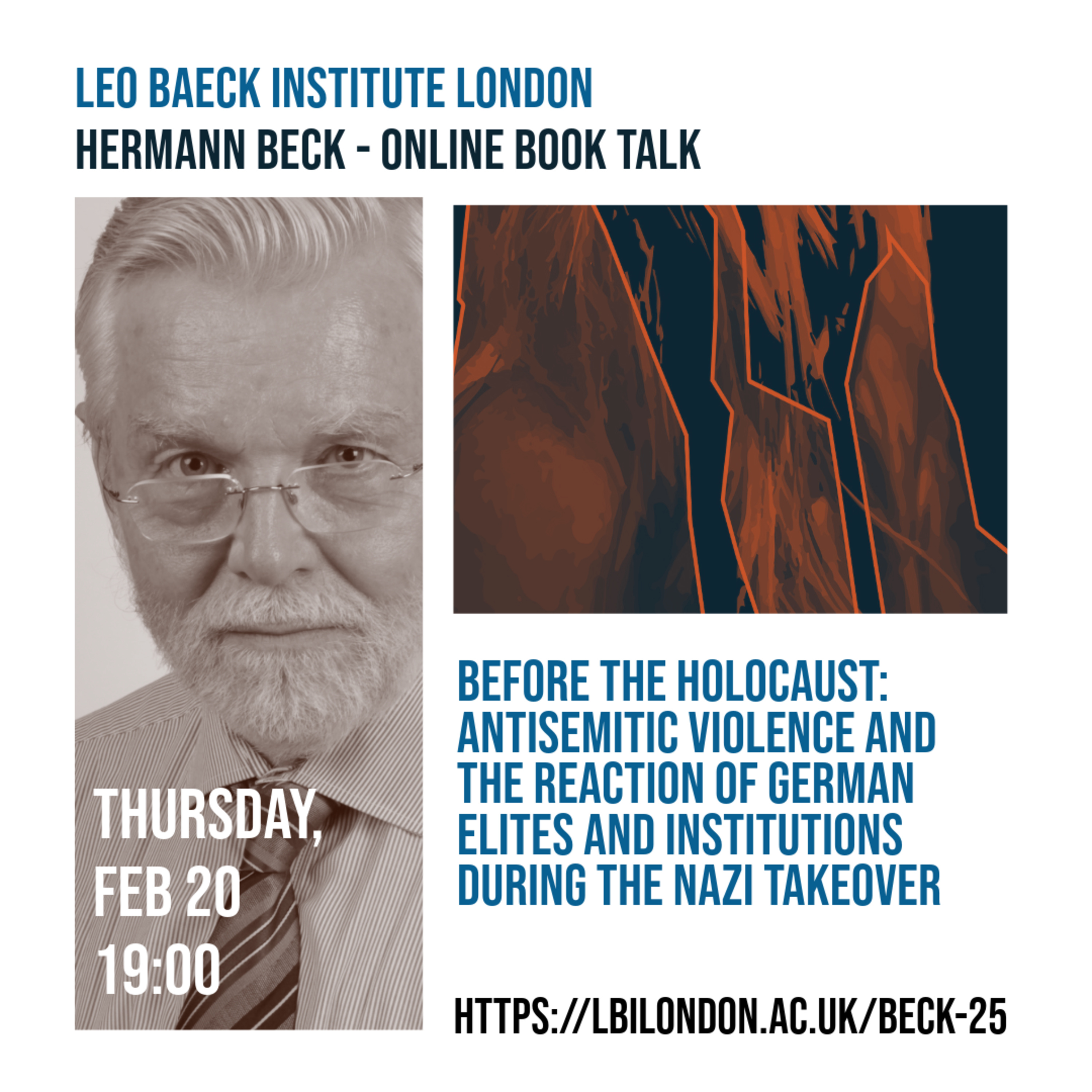 Leo Baeck Institute LondonHermann Beck - Online Book TalkBefore the Holocaust: Antisemitic Violence and the Reaction of German Elites and Institutions during the Nazi TakeoverSpeaker: Hermann BeckHermann Beck has just been announced winner of the Yad Vashem Book Prize 2024 for his book Before the Holocaust: Antisemitic Violence and the Reaction of German Elites and Institutions during the Nazi Takeover.Historians have traditionally argued that antisemitic violence in Nazi Germany rose gradually, from low levels during the first years of Hitler's rule to a high point in the Reich-wide pogrom of November 1938. Before the Holocaust, based on research in more than twenty German archives, demonstrates that this long-held...2025-02-211h 16
Leo Baeck Institute LondonHermann Beck - Online Book TalkBefore the Holocaust: Antisemitic Violence and the Reaction of German Elites and Institutions during the Nazi TakeoverSpeaker: Hermann BeckHermann Beck has just been announced winner of the Yad Vashem Book Prize 2024 for his book Before the Holocaust: Antisemitic Violence and the Reaction of German Elites and Institutions during the Nazi Takeover.Historians have traditionally argued that antisemitic violence in Nazi Germany rose gradually, from low levels during the first years of Hitler's rule to a high point in the Reich-wide pogrom of November 1938. Before the Holocaust, based on research in more than twenty German archives, demonstrates that this long-held...2025-02-211h 16 ExileEpisode 20: From Cradle to GraveJacob Jacobson dedicates his life to archiving the history of Jews in Germany. For years, nobody pays much attention—until the Nazis take power. Suddenly, Jacobson’s meticulous research is being used to destroy the people whose history he wanted to preserve. Unwittingly, Jacobson has also become an invaluable asset to the Nazis. Can he protect himself without betraying his community? One of the most extensive collections in the LBI Archives, the Jacob Jacobson collection includes former holdings of the Gesamtarchiv der Deutschen Juden – birth, death, and marriage records, mohel books, and administrative records from Jewish communities across...2025-01-2831 min
ExileEpisode 20: From Cradle to GraveJacob Jacobson dedicates his life to archiving the history of Jews in Germany. For years, nobody pays much attention—until the Nazis take power. Suddenly, Jacobson’s meticulous research is being used to destroy the people whose history he wanted to preserve. Unwittingly, Jacobson has also become an invaluable asset to the Nazis. Can he protect himself without betraying his community? One of the most extensive collections in the LBI Archives, the Jacob Jacobson collection includes former holdings of the Gesamtarchiv der Deutschen Juden – birth, death, and marriage records, mohel books, and administrative records from Jewish communities across...2025-01-2831 min All Else is CommentaryDevorah and Yael - with Student Rabbi Yael TischlerAll Else Is Commentary is a new podcast of Jewish ideas from a curious, progressive and critical perspective, hosted by Rabbi Elliott Karstadt.In this episode, Elliott is once again joined by Kohenet Yael Tischler, who is a student rabbi in her fourth year at Leo Baeck College in London. After the last two episodes, Elliott asked Yael if they could talk about some women who fought back. Yael thought about it, and these were the two women she chose: Devorah and Yael.Click here for a source sheet with the texts they...2025-01-2047 min
All Else is CommentaryDevorah and Yael - with Student Rabbi Yael TischlerAll Else Is Commentary is a new podcast of Jewish ideas from a curious, progressive and critical perspective, hosted by Rabbi Elliott Karstadt.In this episode, Elliott is once again joined by Kohenet Yael Tischler, who is a student rabbi in her fourth year at Leo Baeck College in London. After the last two episodes, Elliott asked Yael if they could talk about some women who fought back. Yael thought about it, and these were the two women she chose: Devorah and Yael.Click here for a source sheet with the texts they...2025-01-2047 min All Else is CommentaryShe'ilah bat Yiftach - with Student Rabbi Yael TischlerAll Else Is Commentary is a new podcast of Jewish ideas from a curious, progressive and critical perspective, hosted by Rabbi Elliott Karstadt.In this episode, Elliott is once again joined by Kohenet Yael Tischler, who is a student rabbi in her fourth year at Leo Baeck College in London. They discuss the story of She'ilah, the daughter of Yiftach, who is sacrificed by her own father after he makes a frivilous vow to God. They talk about the way in which her story has been told and retold, and why it’s important to us to...2025-01-1351 min
All Else is CommentaryShe'ilah bat Yiftach - with Student Rabbi Yael TischlerAll Else Is Commentary is a new podcast of Jewish ideas from a curious, progressive and critical perspective, hosted by Rabbi Elliott Karstadt.In this episode, Elliott is once again joined by Kohenet Yael Tischler, who is a student rabbi in her fourth year at Leo Baeck College in London. They discuss the story of She'ilah, the daughter of Yiftach, who is sacrificed by her own father after he makes a frivilous vow to God. They talk about the way in which her story has been told and retold, and why it’s important to us to...2025-01-1351 min All Else is CommentaryShelomit bat Dibri - with Student Rabbi Yael TischlerAll Else Is Commentary is a new podcast of Jewish ideas from a curious, progressive and critical perspective, hosted by Rabbi Elliott Karstadt.In this episode, Elliott is joined by Kohenet Yael Tischler, who is a student rabbi in her fourth year at Leo Baeck College in London. They discuss the story of Shelomit bat Dibri, the only woman to be named in the book of Leviticus. They talk about the way in which her story has been told and retold, and why it’s important to us today.Click here for a so...2025-01-0644 min
All Else is CommentaryShelomit bat Dibri - with Student Rabbi Yael TischlerAll Else Is Commentary is a new podcast of Jewish ideas from a curious, progressive and critical perspective, hosted by Rabbi Elliott Karstadt.In this episode, Elliott is joined by Kohenet Yael Tischler, who is a student rabbi in her fourth year at Leo Baeck College in London. They discuss the story of Shelomit bat Dibri, the only woman to be named in the book of Leviticus. They talk about the way in which her story has been told and retold, and why it’s important to us today.Click here for a so...2025-01-0644 min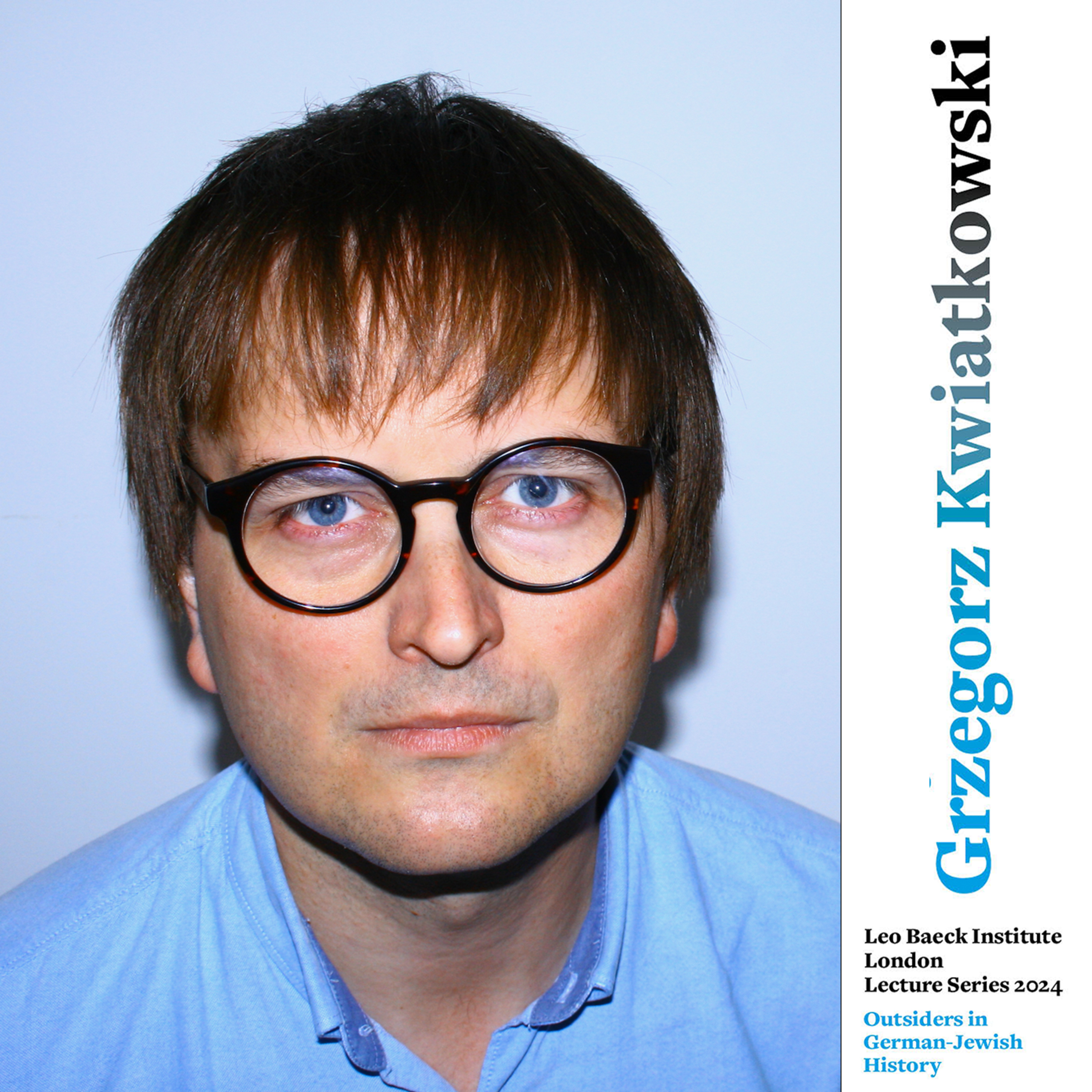 Leo Baeck Institute LondonGrzegorz Kwiatkowski: More Light – Art Against HateMore Light – Art Against Hate: Fighting Holocaust Denial and The Rise of Right-Wing Nationalism In Poland
Grzegorz Kwiatkowski
The ability to accurately describe the past is not confined to historians alone. Artists use their creative expression to explore the cruelties of history, aiming to shape a more ethical present and future. In the case of Grzegorz Kwiatkowski, art is also mixed with activism and active efforts to preserve the memory of the victims and their cultural heritage. Kwiatkowski, whose grandfather was a prisoner of the Stutthof concentration camp, and whose wife’s Jewi...2024-11-291h 15
Leo Baeck Institute LondonGrzegorz Kwiatkowski: More Light – Art Against HateMore Light – Art Against Hate: Fighting Holocaust Denial and The Rise of Right-Wing Nationalism In Poland
Grzegorz Kwiatkowski
The ability to accurately describe the past is not confined to historians alone. Artists use their creative expression to explore the cruelties of history, aiming to shape a more ethical present and future. In the case of Grzegorz Kwiatkowski, art is also mixed with activism and active efforts to preserve the memory of the victims and their cultural heritage. Kwiatkowski, whose grandfather was a prisoner of the Stutthof concentration camp, and whose wife’s Jewi...2024-11-291h 15 Leo Baeck Institute LondonA German-Jewish Athlete During The Age of Extremes: Alex Natan (1906–71)Prof. Kay Schiller
University of Durham, UK
As a gay high-performance runner, antifascist intellectual and sportswriter, Alex Natan was a quintessential outsider in Weimar Berlin. His marginal status also remained a constant during his forced emigration to Britain, as a precarious refugee in pre-war London, as a long-time internee during World War II, as well as a schoolteacher in the Midlands and author and journalist in post-war Britain and West Germany. This lecture will demonstrate how an unusual German Jew was affected by the ‘age of extremes’, making his life story quite typical of the pred...2024-10-111h 21
Leo Baeck Institute LondonA German-Jewish Athlete During The Age of Extremes: Alex Natan (1906–71)Prof. Kay Schiller
University of Durham, UK
As a gay high-performance runner, antifascist intellectual and sportswriter, Alex Natan was a quintessential outsider in Weimar Berlin. His marginal status also remained a constant during his forced emigration to Britain, as a precarious refugee in pre-war London, as a long-time internee during World War II, as well as a schoolteacher in the Midlands and author and journalist in post-war Britain and West Germany. This lecture will demonstrate how an unusual German Jew was affected by the ‘age of extremes’, making his life story quite typical of the pred...2024-10-111h 21 Leo Baeck Institute LondonLBI London Summer Lecture: Psychologists in Auschwitz: Accounting for SurvivalProf Dan Stone
The writings of Dutch Auschwitz survivors Eddy de Wind, Elie Cohen and Louis Micheels merit analysis not only because they anticipated what later became known as PTSD and much of the underpinnings of trauma theory. They also advocated a theory of survival that offers a compelling contrast to well-known “self-help” theories put forward by Bruno Bettelheim and, especially, Viktor Frankl. This lecture traces the ways in which this theory of survival challenged these simplistic narratives, explains how their work informed the changing field of psychiatry after the war, and considers its relevance for the historiography of the...2024-07-121h 25
Leo Baeck Institute LondonLBI London Summer Lecture: Psychologists in Auschwitz: Accounting for SurvivalProf Dan Stone
The writings of Dutch Auschwitz survivors Eddy de Wind, Elie Cohen and Louis Micheels merit analysis not only because they anticipated what later became known as PTSD and much of the underpinnings of trauma theory. They also advocated a theory of survival that offers a compelling contrast to well-known “self-help” theories put forward by Bruno Bettelheim and, especially, Viktor Frankl. This lecture traces the ways in which this theory of survival challenged these simplistic narratives, explains how their work informed the changing field of psychiatry after the war, and considers its relevance for the historiography of the...2024-07-121h 25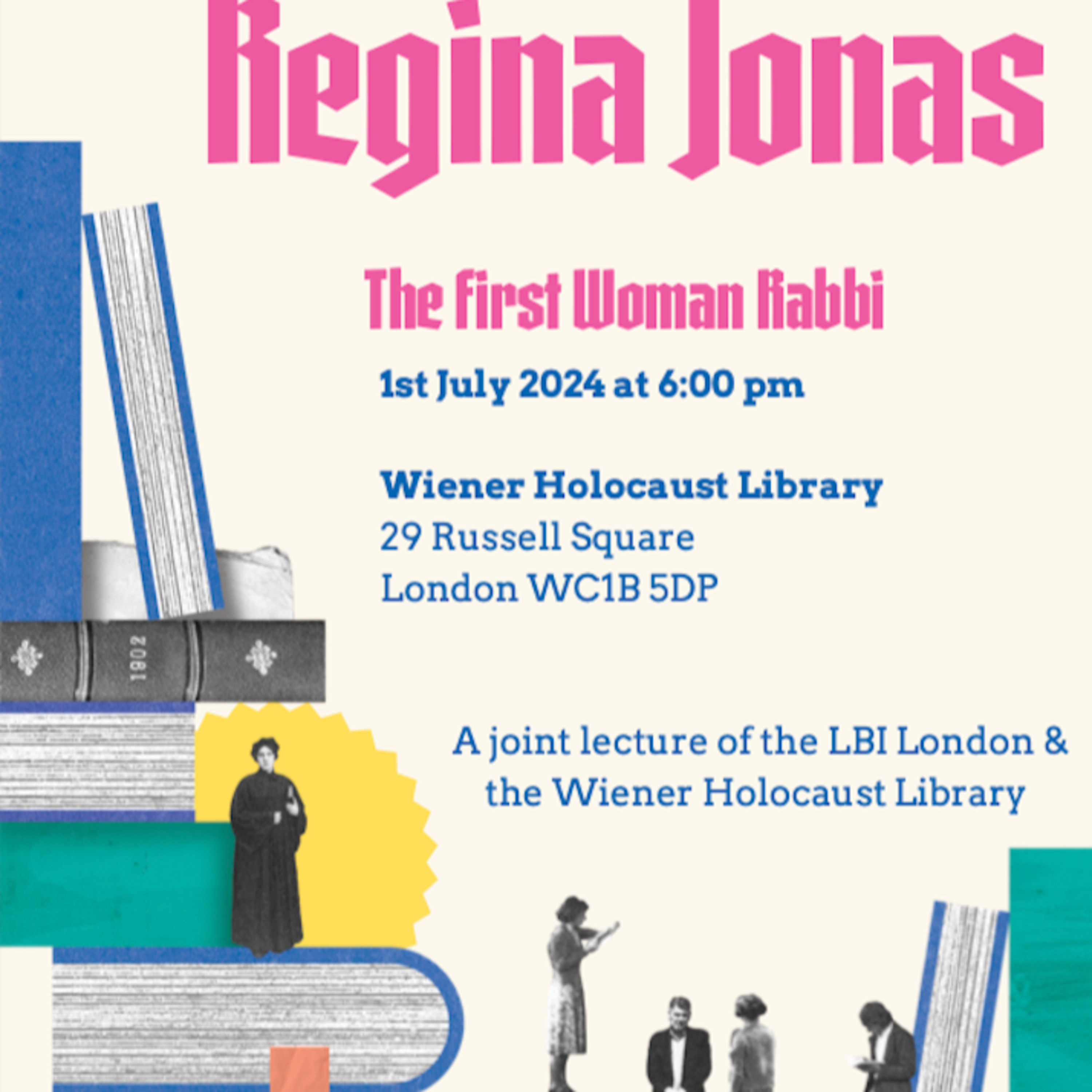 Leo Baeck Institute LondonRegina Jonas – The First Woman RabbiRabbi Prof Dr Elisa Klapheck
Wiener Holocaust Library
Can women hold rabbinical office? This was one of the questions discussed at the Higher Institute for Jewish Studies, Berlin, in the 1920s and 1930s. And no one was better suited to provide an answer to this than Regina Jonas, a student at the Higher Institute who became the first female rabbi in the world in 1935. Prior to her ordination, Jonas answered the question about women’s access to the rabbinate in a halachic treatise that she submitted in 1930 as her final halachic project. Her biographer, Rabbi Prof Dr Elisa Klapheck, wi...2024-07-081h 13
Leo Baeck Institute LondonRegina Jonas – The First Woman RabbiRabbi Prof Dr Elisa Klapheck
Wiener Holocaust Library
Can women hold rabbinical office? This was one of the questions discussed at the Higher Institute for Jewish Studies, Berlin, in the 1920s and 1930s. And no one was better suited to provide an answer to this than Regina Jonas, a student at the Higher Institute who became the first female rabbi in the world in 1935. Prior to her ordination, Jonas answered the question about women’s access to the rabbinate in a halachic treatise that she submitted in 1930 as her final halachic project. Her biographer, Rabbi Prof Dr Elisa Klapheck, wi...2024-07-081h 13 Leo Baeck Institute LondonJewish Life In Contemporary GermanyProf Dani Kranz
Germany is home to Europe’s third largest Jewish community. Yet surprisingly little is known about them. After the Shoah, about 15,000 German Jews returned to Germany or emerged from hiding. The growth of the Jewish population in Germany after 1945 was due entirely to immigration, which is somewhat counter intuitive. Who are the Jews who live in contemporary Germany? How do they live out their Jewishness? What Jewish cultures did they bring with them, and what kind of Jewish culture is forming in Germany?
Dani Kranz is the incumbent DAAD Humboldt chair at El C...2024-06-141h 28
Leo Baeck Institute LondonJewish Life In Contemporary GermanyProf Dani Kranz
Germany is home to Europe’s third largest Jewish community. Yet surprisingly little is known about them. After the Shoah, about 15,000 German Jews returned to Germany or emerged from hiding. The growth of the Jewish population in Germany after 1945 was due entirely to immigration, which is somewhat counter intuitive. Who are the Jews who live in contemporary Germany? How do they live out their Jewishness? What Jewish cultures did they bring with them, and what kind of Jewish culture is forming in Germany?
Dani Kranz is the incumbent DAAD Humboldt chair at El C...2024-06-141h 28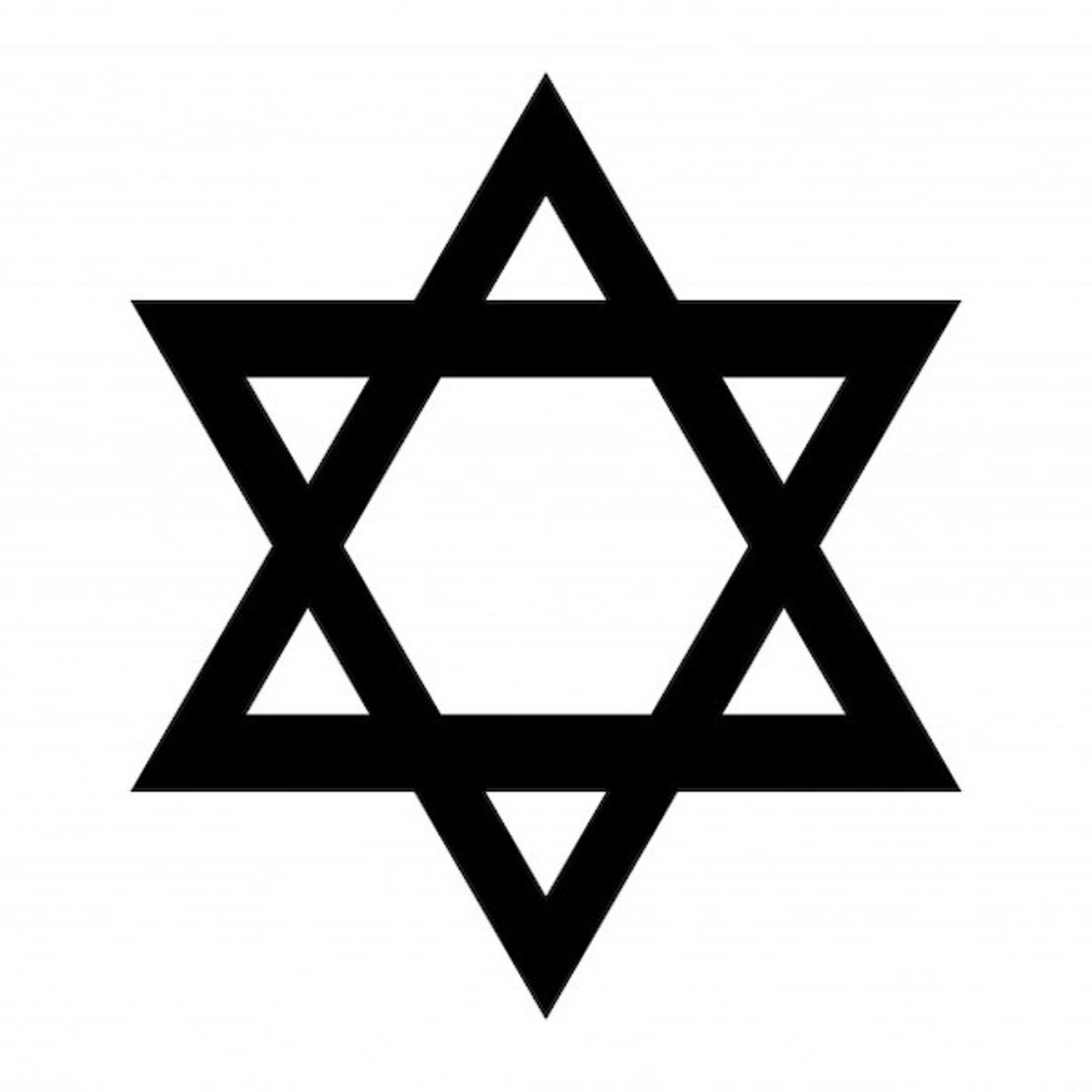 The Messianic Jewish ExpositorTestimony of Rabbi Harold VallinsRabbi Harold VallinsOCTOBER 4, 2012 BY MARTIN ROTHby Martin Roth – published by permissionWhat happens when a modern-day Jewish Rabbi accepts Jesus into his life? For Rabbi Harold Vallins of Melbourne it caused great suffering–the loss of his wife, his congregation and many of his friends.Yet it has also brought about the deep-seated feeling that through taking Jesus as his Messiah his Judaism has been fulfilled. And he has found his suffering and loneliness more than offset by the love of Jesus. “I now have more friends than ever before,”...2024-05-2217 min
The Messianic Jewish ExpositorTestimony of Rabbi Harold VallinsRabbi Harold VallinsOCTOBER 4, 2012 BY MARTIN ROTHby Martin Roth – published by permissionWhat happens when a modern-day Jewish Rabbi accepts Jesus into his life? For Rabbi Harold Vallins of Melbourne it caused great suffering–the loss of his wife, his congregation and many of his friends.Yet it has also brought about the deep-seated feeling that through taking Jesus as his Messiah his Judaism has been fulfilled. And he has found his suffering and loneliness more than offset by the love of Jesus. “I now have more friends than ever before,”...2024-05-2217 min The Church UncoveredEp.2 Fit For A King, Biblical Perspectives on the RiteEpisode 2 Biblical Perspectives on the Rite For the Podcast: Rabbi Baroness (Julia) Neuberger DBEA regular broadcaster, on BBC Radio 2 and Radio 4, Julia was the first woman Rabbi to have her own Synagogue. Following studies in Cambridge and Leo Baeck College, she then taught at Len Baeck from 1977-1997. She was Chief Executive of the King’s Fund from 1997-2004. From 2011 to 2020 she was Senior Rabbi of the West London (Reform) Synagogue. In 2004 she was made a life-peer, and she now sits as a Crossbencher. Her many publications cover a variety of areas, not least heal...2024-05-0537 min
The Church UncoveredEp.2 Fit For A King, Biblical Perspectives on the RiteEpisode 2 Biblical Perspectives on the Rite For the Podcast: Rabbi Baroness (Julia) Neuberger DBEA regular broadcaster, on BBC Radio 2 and Radio 4, Julia was the first woman Rabbi to have her own Synagogue. Following studies in Cambridge and Leo Baeck College, she then taught at Len Baeck from 1977-1997. She was Chief Executive of the King’s Fund from 1997-2004. From 2011 to 2020 she was Senior Rabbi of the West London (Reform) Synagogue. In 2004 she was made a life-peer, and she now sits as a Crossbencher. Her many publications cover a variety of areas, not least heal...2024-05-0537 min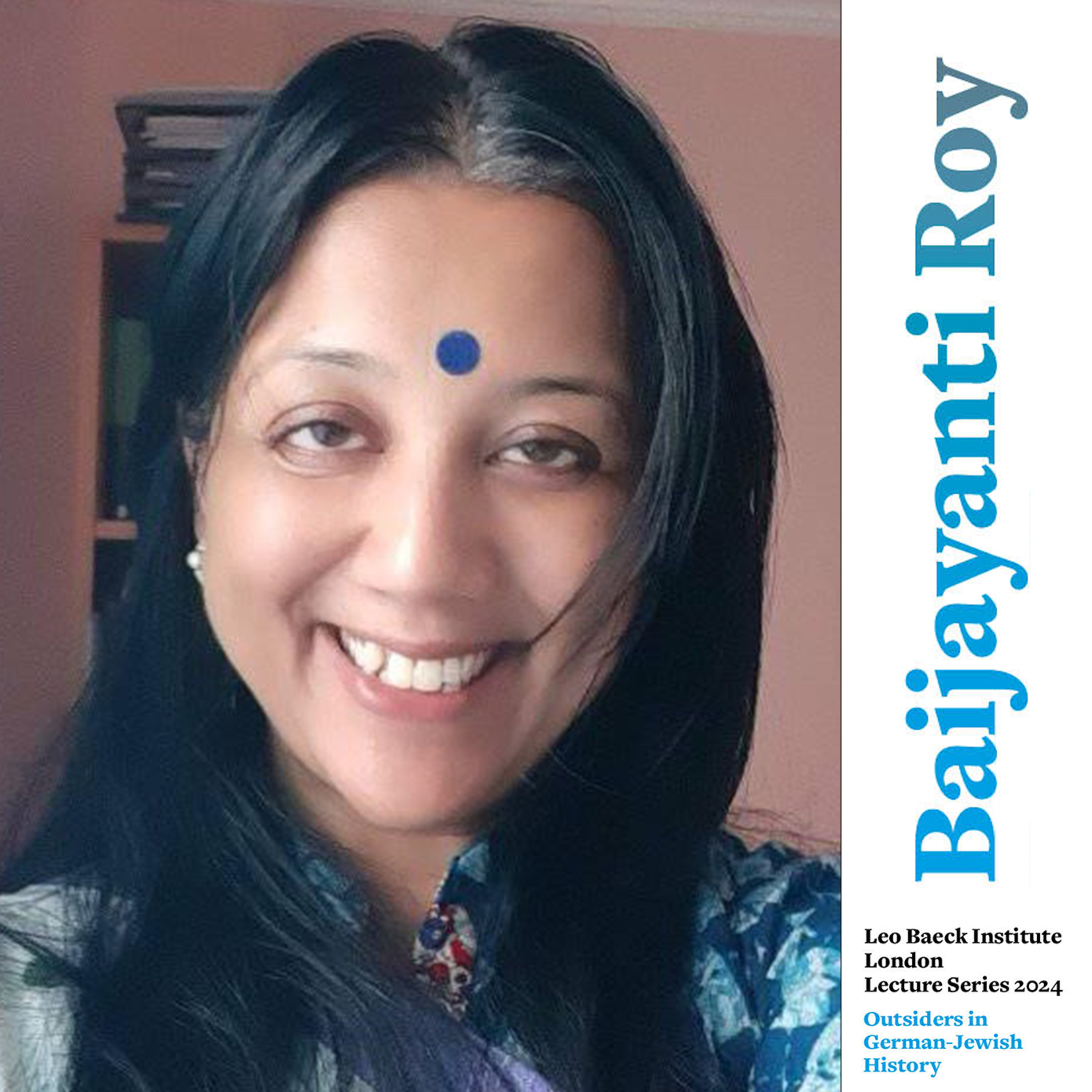 Leo Baeck Institute LondonHeinrich Zimmer, Nazi Racial Politics and The University of Heidelberg, 1933–1938Dr. Baijayanti Roy
University of Frankfurt
This talk examines the grey zones that exist between the established paradigms of persecution and exile in the ‘Third Reich’, as demonstrated by the trajectory of the Indologist Heinrich Zimmer (1890–1943). Zimmer, who taught at the University of Heidelberg, lost his teaching license in 1938 since his wife Christiane was classified as a Mischling (mixed race) by the Nazi regime. He tried to battle his fate by offering diverse political capital to the Nazi political establishment and by counting on some sympathetic colleagues. Zimmer was able to flee German...2024-05-031h 11
Leo Baeck Institute LondonHeinrich Zimmer, Nazi Racial Politics and The University of Heidelberg, 1933–1938Dr. Baijayanti Roy
University of Frankfurt
This talk examines the grey zones that exist between the established paradigms of persecution and exile in the ‘Third Reich’, as demonstrated by the trajectory of the Indologist Heinrich Zimmer (1890–1943). Zimmer, who taught at the University of Heidelberg, lost his teaching license in 1938 since his wife Christiane was classified as a Mischling (mixed race) by the Nazi regime. He tried to battle his fate by offering diverse political capital to the Nazi political establishment and by counting on some sympathetic colleagues. Zimmer was able to flee German...2024-05-031h 11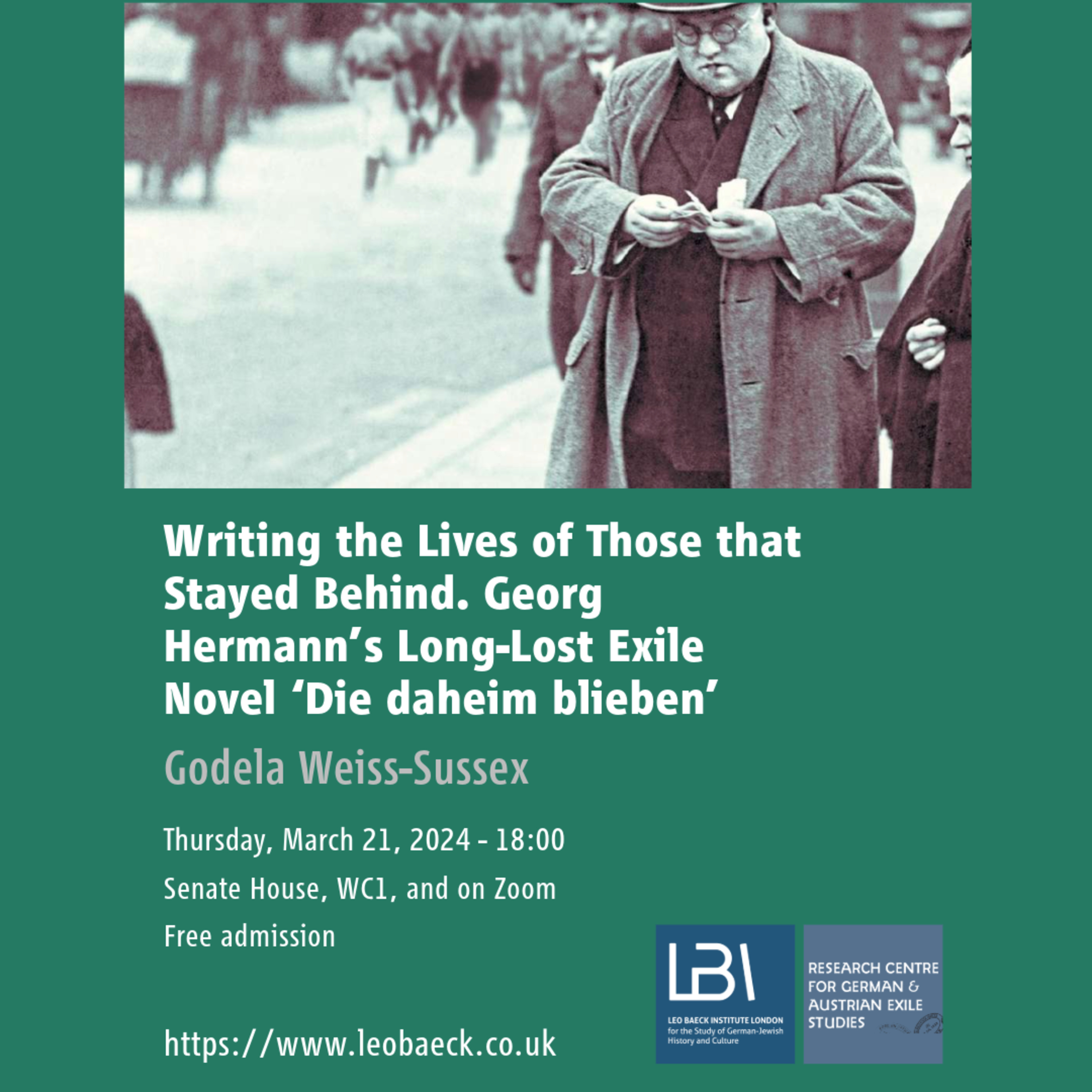 Leo Baeck Institute LondonWriting The Lives of Those That Stayed Behind. Georg Hermann’s Long-Lost Exile Novel ‘Die Daheim Blieben’Godela Weiss-Sussex
ILCS (University of London)
In the winter of 1939–40, exiled in the Dutch city of Hilversum, Georg Hermann was working on a novel that he regarded as one of his most important. Entitled Die daheim blieben (Those that Stayed Behind), it was to be composed of four parts and tell the story of a large, diverse German-Jewish family in Berlin from March 1933 to November 1938. He was unable to complete the novel or see it published, and it was long thought to have been lost. Recently, however, the manuscripts of the first two parts were disc...2024-04-301h 18
Leo Baeck Institute LondonWriting The Lives of Those That Stayed Behind. Georg Hermann’s Long-Lost Exile Novel ‘Die Daheim Blieben’Godela Weiss-Sussex
ILCS (University of London)
In the winter of 1939–40, exiled in the Dutch city of Hilversum, Georg Hermann was working on a novel that he regarded as one of his most important. Entitled Die daheim blieben (Those that Stayed Behind), it was to be composed of four parts and tell the story of a large, diverse German-Jewish family in Berlin from March 1933 to November 1938. He was unable to complete the novel or see it published, and it was long thought to have been lost. Recently, however, the manuscripts of the first two parts were disc...2024-04-301h 18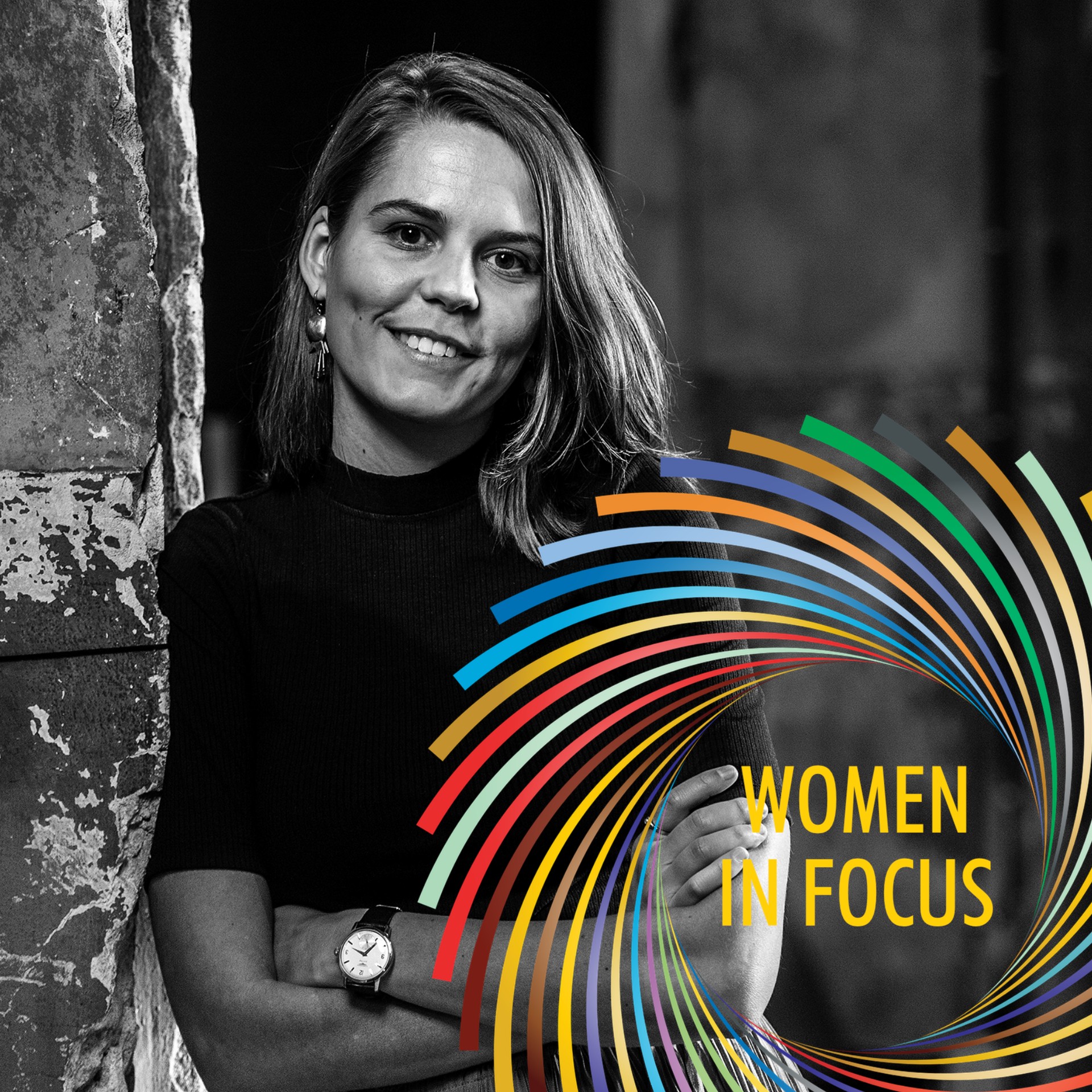 Czech Centre LondonWomen in Focus: Kamila KopřivováEvent took place on TUE 16 APR 2024 at the Czech Centre, Czech Embassy Cinema, London.
Czech Centre's Women in Focus series continues with a talk by Kamila Kopřivová, the first Czech female rabbi. She will share the story of her journey to the rabbinate moving through Berlin, Jerusalem and London and how she became one of the rabbis of the synagogue that exactly 60 years ago became the home of more than 1500 Torah scrolls from the Czech Republic. What are the challenges of modern clergy and how is it to be a woman in this position?
AB...2024-04-261h 04
Czech Centre LondonWomen in Focus: Kamila KopřivováEvent took place on TUE 16 APR 2024 at the Czech Centre, Czech Embassy Cinema, London.
Czech Centre's Women in Focus series continues with a talk by Kamila Kopřivová, the first Czech female rabbi. She will share the story of her journey to the rabbinate moving through Berlin, Jerusalem and London and how she became one of the rabbis of the synagogue that exactly 60 years ago became the home of more than 1500 Torah scrolls from the Czech Republic. What are the challenges of modern clergy and how is it to be a woman in this position?
AB...2024-04-261h 04 Leo Baeck Institute LondonInternational Women's Day 2024: Pauline PauckerFor International Women's Day 2024, LBI Director Joseph Cronin interviews Pauline Paucker at her home about her memories of the Institute, her work editing the Yearbook, and her husband Arno Paucker, former director of the Institute.
Her testimony is a personal reminiscence, and the views expressed therein do not necessarily reflect those of the Institute.
https://www.leobaeck.co.uk/events/interviews/international-womens-day-2024-pauline-paucker
2024-03-081h 02
Leo Baeck Institute LondonInternational Women's Day 2024: Pauline PauckerFor International Women's Day 2024, LBI Director Joseph Cronin interviews Pauline Paucker at her home about her memories of the Institute, her work editing the Yearbook, and her husband Arno Paucker, former director of the Institute.
Her testimony is a personal reminiscence, and the views expressed therein do not necessarily reflect those of the Institute.
https://www.leobaeck.co.uk/events/interviews/international-womens-day-2024-pauline-paucker
2024-03-081h 02 Leo Baeck Institute LondonWho was Fritz Kittel? A German Railway Worker Decides, 1933–2022Reading: Esther Dischereit together with Jonny Ball.
In 2023, Esther Dischereit created an exhibition in cooperation with Deutsche Bahn to honour the railroad worker Fritz Kittel. In 1944 and 1945, he hid her mother Hella and sister Hannelore, who as Jews were persecuted by the Gestapo and threatened with death in Germany under National Socialism. They were liberated by U.S. troops in 1945. Dischereit began to search for the family of the rescuer and found them in 2019. Fritz Kittel had not told his own family about his courageous act throughout his life.
Esther Dischereit's literary response in 17 text...2024-02-071h 31
Leo Baeck Institute LondonWho was Fritz Kittel? A German Railway Worker Decides, 1933–2022Reading: Esther Dischereit together with Jonny Ball.
In 2023, Esther Dischereit created an exhibition in cooperation with Deutsche Bahn to honour the railroad worker Fritz Kittel. In 1944 and 1945, he hid her mother Hella and sister Hannelore, who as Jews were persecuted by the Gestapo and threatened with death in Germany under National Socialism. They were liberated by U.S. troops in 1945. Dischereit began to search for the family of the rescuer and found them in 2019. Fritz Kittel had not told his own family about his courageous act throughout his life.
Esther Dischereit's literary response in 17 text...2024-02-071h 31 Leo Baeck Institute LondonDressing Eve: Re-drawing Biblical Women through ComicsDr Sarah Lightman
Jewish women have been at the forefront of feminist autobiographical comics since the 1970’s as they challenged sexism in popular culture. But how have they revised misogynistic images and stories closer to home? Sarah Lightman will illustrate how Sharon Rudahl in her bildungsroman ‘The Star Sapphire’, Miriam Katin in her Holocaust memoir, We Are on Our Own, and her own graphic novel, The Book of Sarah, transform biblical narratives and images to reflect their own, lived, experiences.
Sarah Lightman is an artist, writer and Faculty at The Ro...2023-12-011h 13
Leo Baeck Institute LondonDressing Eve: Re-drawing Biblical Women through ComicsDr Sarah Lightman
Jewish women have been at the forefront of feminist autobiographical comics since the 1970’s as they challenged sexism in popular culture. But how have they revised misogynistic images and stories closer to home? Sarah Lightman will illustrate how Sharon Rudahl in her bildungsroman ‘The Star Sapphire’, Miriam Katin in her Holocaust memoir, We Are on Our Own, and her own graphic novel, The Book of Sarah, transform biblical narratives and images to reflect their own, lived, experiences.
Sarah Lightman is an artist, writer and Faculty at The Ro...2023-12-011h 13 Leo Baeck Institute LondonThe Shoah and the Tragedy of Assimilation: Lessons from one German-Jewish familySimon May
Thursday, October 26, 2023 - 18:30
Between 1933 and 1941, Simon May’s mother and her two sisters pushed the boundaries of assimilation among German Jews to their limits. They resorted to conversion, aristocratic marriages, and ‘Aryan’ certificates, which likely saved them from the death camps. However, this marked the defeat of the hope that such strategies would secure acceptance for Jews in German and European society. It led to a unique vulnerability, as these three women – and many others like them – distanced themselves from their cultural roots, leaving them emotionally defenceless when disaster struck. This self-inflicted psychic violence p...2023-10-291h 33
Leo Baeck Institute LondonThe Shoah and the Tragedy of Assimilation: Lessons from one German-Jewish familySimon May
Thursday, October 26, 2023 - 18:30
Between 1933 and 1941, Simon May’s mother and her two sisters pushed the boundaries of assimilation among German Jews to their limits. They resorted to conversion, aristocratic marriages, and ‘Aryan’ certificates, which likely saved them from the death camps. However, this marked the defeat of the hope that such strategies would secure acceptance for Jews in German and European society. It led to a unique vulnerability, as these three women – and many others like them – distanced themselves from their cultural roots, leaving them emotionally defenceless when disaster struck. This self-inflicted psychic violence p...2023-10-291h 33 Leo Baeck Institute LondonWhat a shayna punim!: Cute Jews, Photography, and Jewish RegenerationProf Daniel Magilow
Jüdische Kinder in Erez Israel, a collection of twenty-one photographs of adorable Jewish children in Mandatory Palestine, was the last overtly Jewish-themed photobook published in Germany before the Holocaust. Yet its propaganda mission transcended its diminutive size and surface superficiality. This talk examines how this photobook creates an allegory of Jewish vulnerability by eliciting responses associated with the minor aesthetic category of ‘cuteness.’ In so doing, it broadens our understanding of how photobooks helped expand the visual lexicon and aesthetic strategies central to Jewish cultural and political regeneration.
Daniel H. Magilow is Professor of German at th...2023-10-131h 09
Leo Baeck Institute LondonWhat a shayna punim!: Cute Jews, Photography, and Jewish RegenerationProf Daniel Magilow
Jüdische Kinder in Erez Israel, a collection of twenty-one photographs of adorable Jewish children in Mandatory Palestine, was the last overtly Jewish-themed photobook published in Germany before the Holocaust. Yet its propaganda mission transcended its diminutive size and surface superficiality. This talk examines how this photobook creates an allegory of Jewish vulnerability by eliciting responses associated with the minor aesthetic category of ‘cuteness.’ In so doing, it broadens our understanding of how photobooks helped expand the visual lexicon and aesthetic strategies central to Jewish cultural and political regeneration.
Daniel H. Magilow is Professor of German at th...2023-10-131h 09 The Jewish Education Experience Podcast92: Meaning-Mining with Your Students with Aviva LauerAviva Lauer is the Director of the Pardes Center for Jewish Educators. She majored in Jewish Studies at Yeshiva University’s Stern College for Women, and earned a Master’s degree in Midrash at the Schechter Institute of Jewish Studies. Aviva is a Jewish educator with 25 years of experience in curriculum development, classroom teaching, school administration and educational consulting. Upon making Aliyah in 1996, Aviva developed formal and informal educational materials for Melitz and at the Leo Baeck Education Center, where she also gained experience in teaching pluralistic Judaism. She then served as the head of the department of Jewish Stud...2023-07-3033 min
The Jewish Education Experience Podcast92: Meaning-Mining with Your Students with Aviva LauerAviva Lauer is the Director of the Pardes Center for Jewish Educators. She majored in Jewish Studies at Yeshiva University’s Stern College for Women, and earned a Master’s degree in Midrash at the Schechter Institute of Jewish Studies. Aviva is a Jewish educator with 25 years of experience in curriculum development, classroom teaching, school administration and educational consulting. Upon making Aliyah in 1996, Aviva developed formal and informal educational materials for Melitz and at the Leo Baeck Education Center, where she also gained experience in teaching pluralistic Judaism. She then served as the head of the department of Jewish Stud...2023-07-3033 min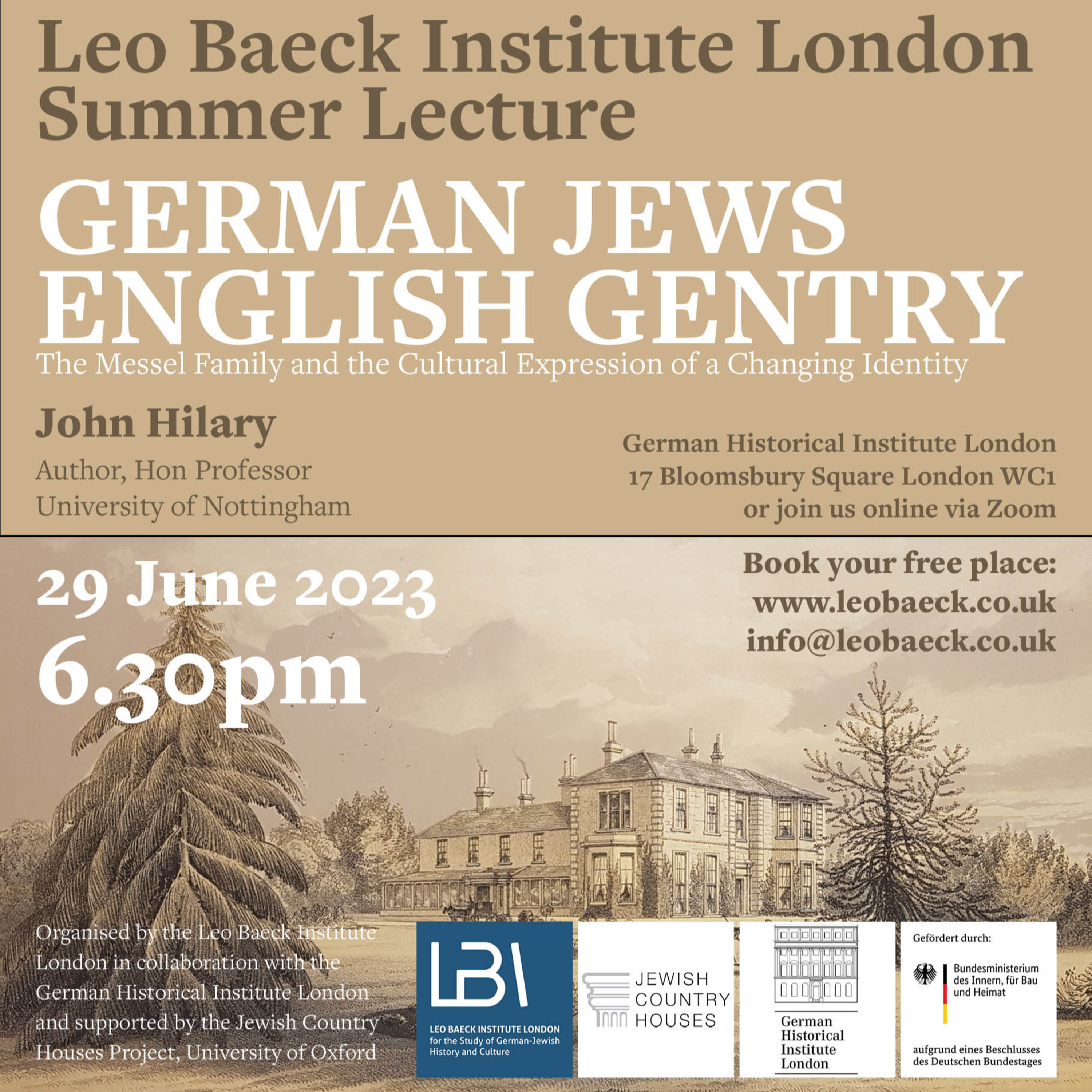 Leo Baeck Institute LondonGerman Jews, English Gentry: The Messel Family and the Cultural Expression of a Changing IdentityLeo Baeck Institute London Summer Lecture
Speaker: John Hilary, honorary professor at the University of Nottingham
The conspicuous set of German-Jewish financiers who made their homes in late Victorian and Edwardian Britain brought with them a rich cultural inheritance that reflected the historical journey of German Jewry towards emancipation. As they established themselves in their new environment, they faced the challenge of being at one and the same time German, Jewish, British and English, and the crisis of having to choose between allegiances in the dark days of the First World War.
This lecture explores the diverse ways in...2023-06-301h 29
Leo Baeck Institute LondonGerman Jews, English Gentry: The Messel Family and the Cultural Expression of a Changing IdentityLeo Baeck Institute London Summer Lecture
Speaker: John Hilary, honorary professor at the University of Nottingham
The conspicuous set of German-Jewish financiers who made their homes in late Victorian and Edwardian Britain brought with them a rich cultural inheritance that reflected the historical journey of German Jewry towards emancipation. As they established themselves in their new environment, they faced the challenge of being at one and the same time German, Jewish, British and English, and the crisis of having to choose between allegiances in the dark days of the First World War.
This lecture explores the diverse ways in...2023-06-301h 29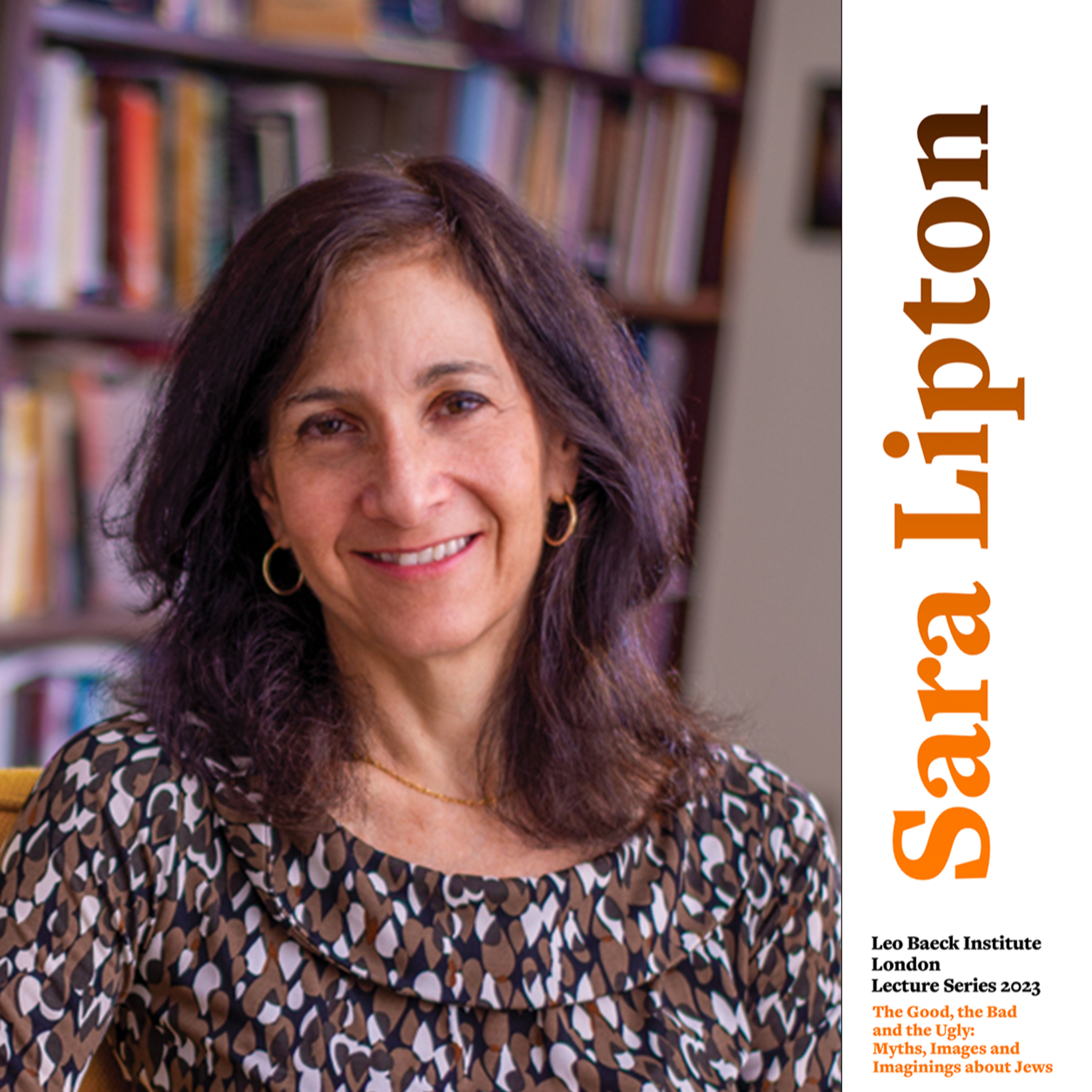 Leo Baeck Institute LondonMarked Off in the Eyes of the Public: Anti-Jewish Imagery and the Politics of PrejudiceSara Lipton
Stony Brook University, NY, USA
Art can be a powerful force in shaping the way we see and think about the world: pictures craft our ideas of beauty and ugliness, good and bad, power and weakness. This lecture traces how medieval Christian images of Jews, originally designed to aid religious devotions, made Christians look at Jews with new curiosity and interest, and drew their attention to previously unnoticed aspects of Jewish life and looks. As images of Jews evolved from benign but outdated Hebrews to caricatured usurers and demonic sorcerers, Christian society developed new – and in...2023-06-201h 25
Leo Baeck Institute LondonMarked Off in the Eyes of the Public: Anti-Jewish Imagery and the Politics of PrejudiceSara Lipton
Stony Brook University, NY, USA
Art can be a powerful force in shaping the way we see and think about the world: pictures craft our ideas of beauty and ugliness, good and bad, power and weakness. This lecture traces how medieval Christian images of Jews, originally designed to aid religious devotions, made Christians look at Jews with new curiosity and interest, and drew their attention to previously unnoticed aspects of Jewish life and looks. As images of Jews evolved from benign but outdated Hebrews to caricatured usurers and demonic sorcerers, Christian society developed new – and in...2023-06-201h 25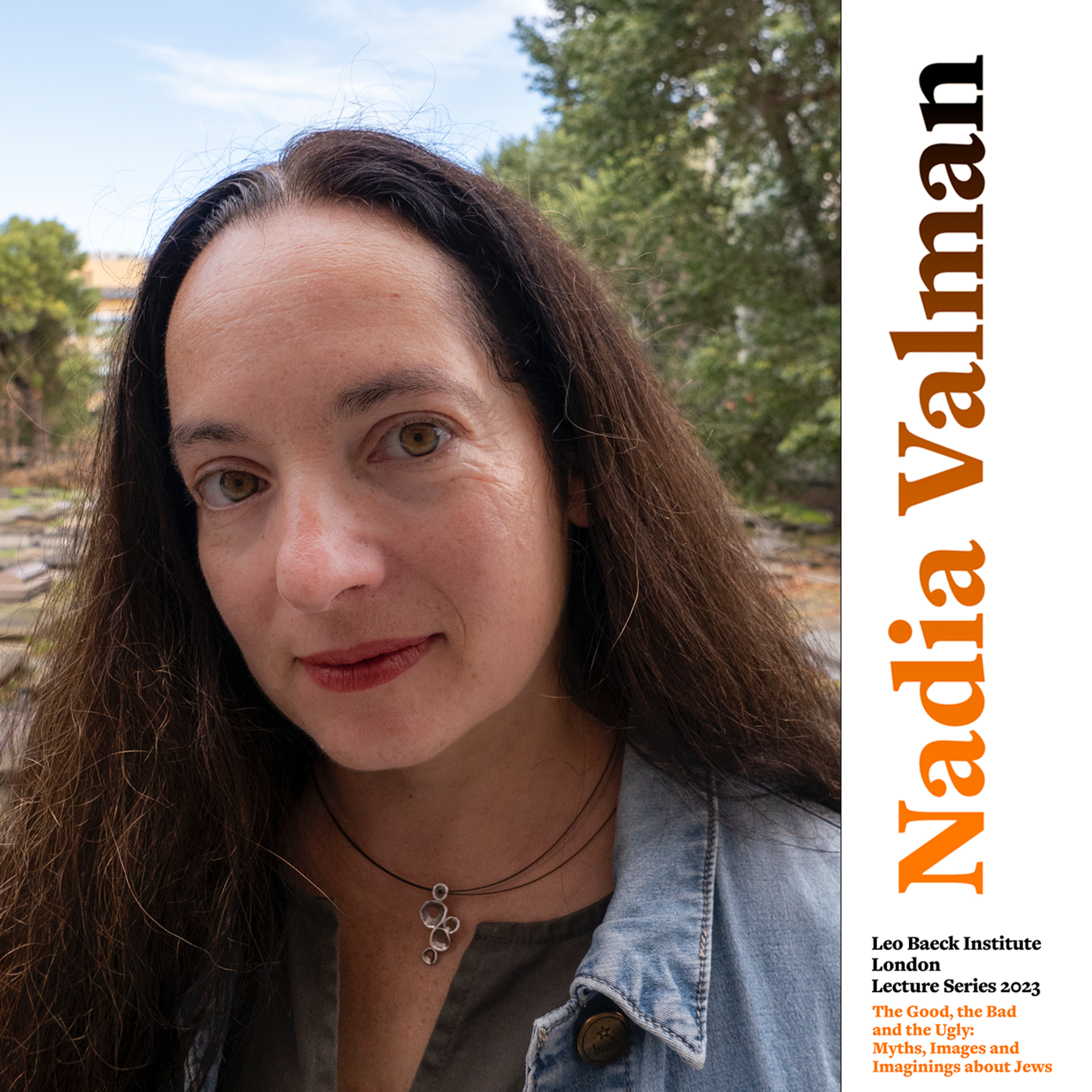 Leo Baeck Institute LondonThe Virtuous JewessNadia Valman
Queen Mary University of London, UK
British culture has always been fascinated by the figure of the Jewess. This lecture will explore its roots in nineteenth-century theology, and its popularisation through literature. In contrast to the more well- known stereotypes of Fagin and Shylock, the virtuous Jewess was an emblem of the privileged status accorded to both women and Jews in Victorian Protestant culture and demonstrates that Jews could function not simply as an ‘other’ within modern cultures, but also, simultaneously, an ideal self.
Nadia Valman is Professor of Urban Literature at Queen Mary, University of London. She...2023-05-051h 25
Leo Baeck Institute LondonThe Virtuous JewessNadia Valman
Queen Mary University of London, UK
British culture has always been fascinated by the figure of the Jewess. This lecture will explore its roots in nineteenth-century theology, and its popularisation through literature. In contrast to the more well- known stereotypes of Fagin and Shylock, the virtuous Jewess was an emblem of the privileged status accorded to both women and Jews in Victorian Protestant culture and demonstrates that Jews could function not simply as an ‘other’ within modern cultures, but also, simultaneously, an ideal self.
Nadia Valman is Professor of Urban Literature at Queen Mary, University of London. She...2023-05-051h 25 Military Historians are People, Too!S3 Bonus Brian K. Feltman - Georgia Southern UniversityBy popular demand, we are finally interviewing each other! Today, Bill convinced Brian to sit down with him in Bill's American Military Experience class at Georgia Southern University for a live recording, in front of students no less!
Brian K. Feltman, not to be confused with the notorious other Brian Feltman from Georgia, is Professor of History (newly promoted!) at Georgia Southern University. He is a scholar of Modern Germany and the First World War and teaches courses on the same at Georgia Southern. He earned his BA and MA from Clemson University and his PhD from...2023-03-3056 min
Military Historians are People, Too!S3 Bonus Brian K. Feltman - Georgia Southern UniversityBy popular demand, we are finally interviewing each other! Today, Bill convinced Brian to sit down with him in Bill's American Military Experience class at Georgia Southern University for a live recording, in front of students no less!
Brian K. Feltman, not to be confused with the notorious other Brian Feltman from Georgia, is Professor of History (newly promoted!) at Georgia Southern University. He is a scholar of Modern Germany and the First World War and teaches courses on the same at Georgia Southern. He earned his BA and MA from Clemson University and his PhD from...2023-03-3056 min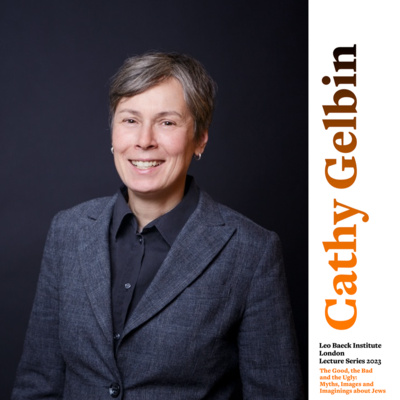 Leo Baeck Institute LondonGender, Sex and Jewishness in Weimar Cinema’s MonstersProf Cathy Gelbin
University of Manchester, UK
Leo Baeck Institute London Lecture Series 2023
The monstrous Jew of popular imagination found perhaps his most salient expression in Weimar cinema’s love of the uncanny. These films derive their lasting fascination from the often-ironic interplay of their separate and yet related gendered, sexualized and racialized portrayals. The talk explores how spectatorial pleasure can arise from the emerging gaps where the incoherence of these categories, presumed to be absolute in the biologized discourses of modernity, is playfully made visible and ridiculed.
Cathy Gelbin is Pr...2023-03-101h 26
Leo Baeck Institute LondonGender, Sex and Jewishness in Weimar Cinema’s MonstersProf Cathy Gelbin
University of Manchester, UK
Leo Baeck Institute London Lecture Series 2023
The monstrous Jew of popular imagination found perhaps his most salient expression in Weimar cinema’s love of the uncanny. These films derive their lasting fascination from the often-ironic interplay of their separate and yet related gendered, sexualized and racialized portrayals. The talk explores how spectatorial pleasure can arise from the emerging gaps where the incoherence of these categories, presumed to be absolute in the biologized discourses of modernity, is playfully made visible and ridiculed.
Cathy Gelbin is Pr...2023-03-101h 26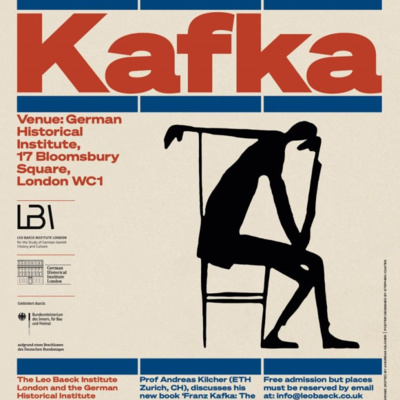 Leo Baeck Institute LondonImages of the Grotesque and Arabesque: The Discovery of Kafka’s drawingsOver 100 completely unknown drawings by Franz Kafka of fascinating figures, shifting from the realistic to the fantastic, the grotesque, the uncanny and the carnivalesque have been made accessible in Prof Andreas Kilcher’s highly acclaimed book Franz Kafka: The Drawings. The drawings illuminate a previously unknown side of the quintessential modernist author. Three fascinating stories can be told about Kafka’s drawings: the story of their transmission, the story of Kafka as a draftsman, and the story of his drawing in relation to his writing.
Hosted at the German Historical Institute London, 17 Bloomsbury Square, London WC1A 2NJ an...2023-02-281h 37
Leo Baeck Institute LondonImages of the Grotesque and Arabesque: The Discovery of Kafka’s drawingsOver 100 completely unknown drawings by Franz Kafka of fascinating figures, shifting from the realistic to the fantastic, the grotesque, the uncanny and the carnivalesque have been made accessible in Prof Andreas Kilcher’s highly acclaimed book Franz Kafka: The Drawings. The drawings illuminate a previously unknown side of the quintessential modernist author. Three fascinating stories can be told about Kafka’s drawings: the story of their transmission, the story of Kafka as a draftsman, and the story of his drawing in relation to his writing.
Hosted at the German Historical Institute London, 17 Bloomsbury Square, London WC1A 2NJ an...2023-02-281h 37 Leo Baeck Institute LondonMarx and the Jewish QuestionProf Etienne Balibar
The lecture looks at the ambiguity of the term “Jewish Question”, which refers to both the historical attitude of Marx with respect to the condition of the Jewish communities in 19th century Europe, and to the philosophical developments reflected in the 1844 article for the Deutsch-Französische Jahrbücher, “Zur Judenfrage”. Here, in reply to Bruno Bauer’s homonymous brochure, Marx would propose his first analysis of the value and limitations of bourgeois “juridical universality”. The lecture deals with the tension in Marx’s theory between a “secular” theory of the political in terms of radical democratic ema...2023-01-012h 39
Leo Baeck Institute LondonMarx and the Jewish QuestionProf Etienne Balibar
The lecture looks at the ambiguity of the term “Jewish Question”, which refers to both the historical attitude of Marx with respect to the condition of the Jewish communities in 19th century Europe, and to the philosophical developments reflected in the 1844 article for the Deutsch-Französische Jahrbücher, “Zur Judenfrage”. Here, in reply to Bruno Bauer’s homonymous brochure, Marx would propose his first analysis of the value and limitations of bourgeois “juridical universality”. The lecture deals with the tension in Marx’s theory between a “secular” theory of the political in terms of radical democratic ema...2023-01-012h 39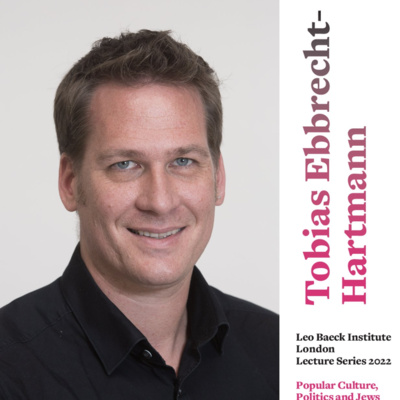 Leo Baeck Institute LondonIn our Image: Meeting our Ultraorthodox Other on NetflixDr Tobias Ebbrecht-Hartmann
Hebrew University of Jerusalem, Israel
In our Image: Meeting our Ultraorthodox Other on Netflix 6.30pm, Thursday, November 17th 2022 In recent years, streaming networks have offered new encounters with the lives and traditions of ultraorthodox Judaism through means of pop cultural representations. While some praised the accuracy with which series such as Shtisel (2013-2021) or Unorthodox (2020) presented ultraorthodox customs, others identified problematic anti-Semitic stereotypes in those depictions. This lecture examines how far the representations in either series serve as a distancing mirror of our own societies and looks at them in comparison to mod...2022-11-171h 40
Leo Baeck Institute LondonIn our Image: Meeting our Ultraorthodox Other on NetflixDr Tobias Ebbrecht-Hartmann
Hebrew University of Jerusalem, Israel
In our Image: Meeting our Ultraorthodox Other on Netflix 6.30pm, Thursday, November 17th 2022 In recent years, streaming networks have offered new encounters with the lives and traditions of ultraorthodox Judaism through means of pop cultural representations. While some praised the accuracy with which series such as Shtisel (2013-2021) or Unorthodox (2020) presented ultraorthodox customs, others identified problematic anti-Semitic stereotypes in those depictions. This lecture examines how far the representations in either series serve as a distancing mirror of our own societies and looks at them in comparison to mod...2022-11-171h 40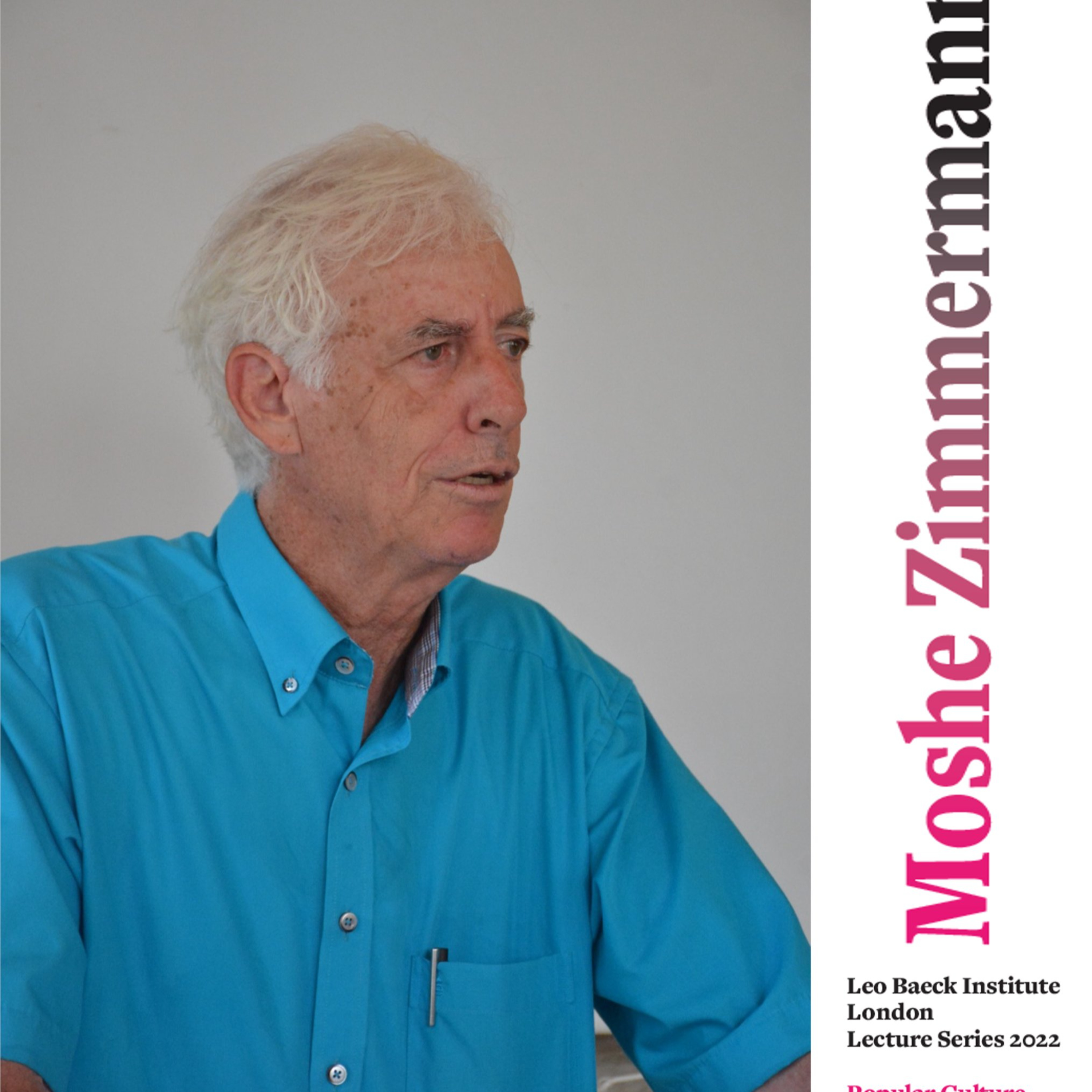 Leo Baeck Institute LondonPost-Holocaust German-Jewish Symbiosis: Ephraim Kishon and the GermansProf Moshe Zimmermann
Hebrew University of Jerusalem, Israel
Post-Holocaust German-Jewish Symbiosis: Ephraim Kishon and the Germans 6.30pm, Thursday, October 13th 2022 The bon mot 'A German joke is no laughing matter' is attributed to Mark Twain. Improvising on Adorno's dictum 'writing poetry after Auschwitz is barbaric' one might consider writing humour in the German language after Auschwitz a contradiction in terms. Yet, this was the gap into which the Israeli Author Ephraim Kishon, a Holocaust survivor from Hungary, stepped. The most successful humourist of the Federal Republic, his humour was rooted in the everyday life of Isr...2022-10-131h 24
Leo Baeck Institute LondonPost-Holocaust German-Jewish Symbiosis: Ephraim Kishon and the GermansProf Moshe Zimmermann
Hebrew University of Jerusalem, Israel
Post-Holocaust German-Jewish Symbiosis: Ephraim Kishon and the Germans 6.30pm, Thursday, October 13th 2022 The bon mot 'A German joke is no laughing matter' is attributed to Mark Twain. Improvising on Adorno's dictum 'writing poetry after Auschwitz is barbaric' one might consider writing humour in the German language after Auschwitz a contradiction in terms. Yet, this was the gap into which the Israeli Author Ephraim Kishon, a Holocaust survivor from Hungary, stepped. The most successful humourist of the Federal Republic, his humour was rooted in the everyday life of Isr...2022-10-131h 24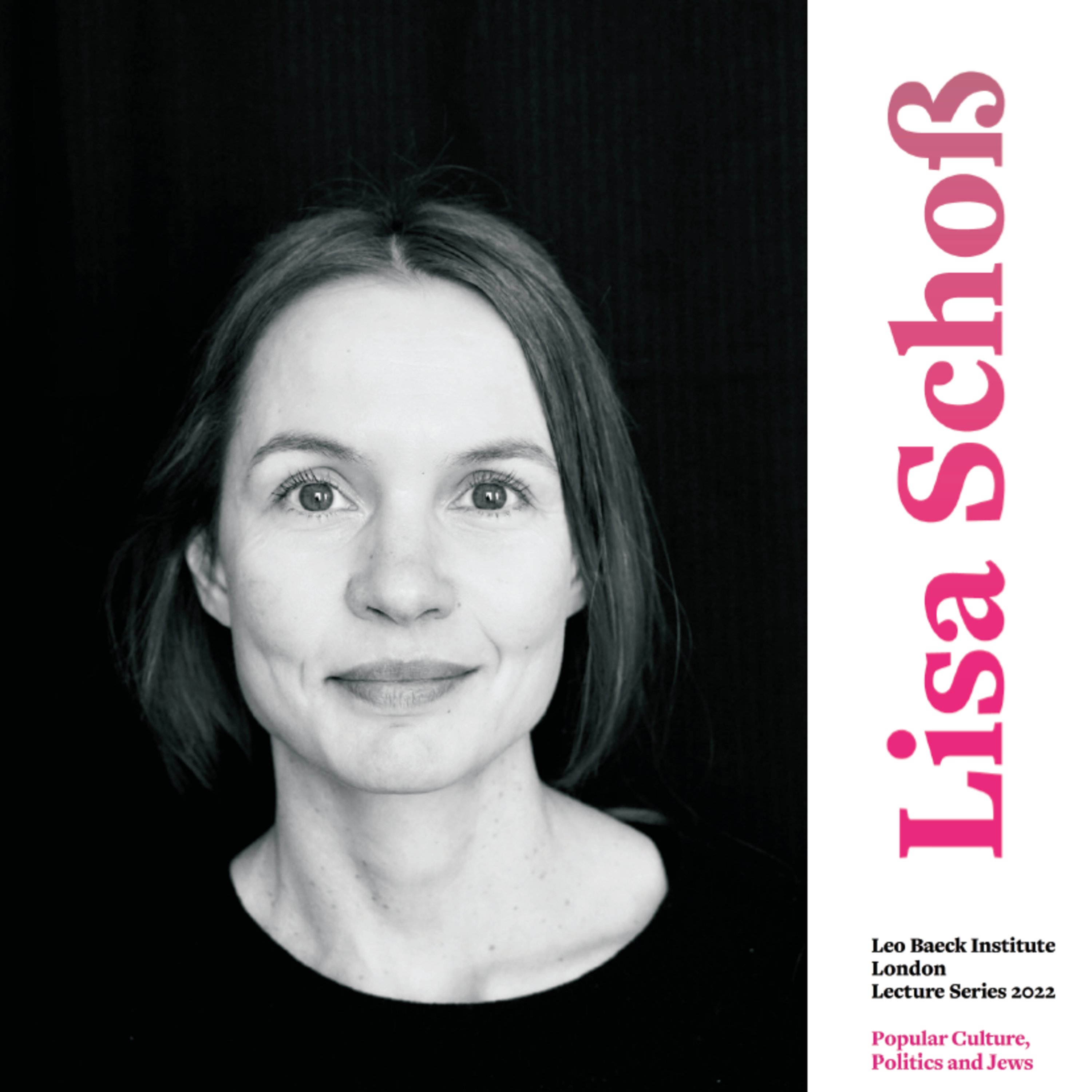 Leo Baeck Institute LondonA Story of Ambivalences. Jewish Topics and Characters in East German TelevisionDr Lisa Schoß (Selma Stern Centre for Jewish Studies, Berlin, Germany)
6.30pm, May 5th 2022
In general, East German television attempted to combine so-called ‘political-operational cultural work’ with attractive programming. The same balancing act can also be observed in the presentation of Jewish topics and characters on TV. This talk covers so-called anti-fascist films about the Nazi era; campaign films against the West, e.g. courtroom dramas and crime movies; the aspect of ‘Jewish heritage’; Yiddish music; and Jewish contributions to entertainment shows.
Dr des Lisa Schoß is a scholar of film and literature. Her monogr...2022-05-051h 23
Leo Baeck Institute LondonA Story of Ambivalences. Jewish Topics and Characters in East German TelevisionDr Lisa Schoß (Selma Stern Centre for Jewish Studies, Berlin, Germany)
6.30pm, May 5th 2022
In general, East German television attempted to combine so-called ‘political-operational cultural work’ with attractive programming. The same balancing act can also be observed in the presentation of Jewish topics and characters on TV. This talk covers so-called anti-fascist films about the Nazi era; campaign films against the West, e.g. courtroom dramas and crime movies; the aspect of ‘Jewish heritage’; Yiddish music; and Jewish contributions to entertainment shows.
Dr des Lisa Schoß is a scholar of film and literature. Her monogr...2022-05-051h 23 Jewish Quest32 - Achrei Mot with Rabbi Dr. Charles MiddleburghRabbi Dr Charles Middleburgh discusses the laws concerning the scapegoat and their possible application for our times. Dr Charles Middleburgh is founder rabbi of Congregation Shir HaTzaphon in Copenhagen and Dean and Director of Jewish Studies at the Leo Baeck College in London. Rabbi Middleburgh has lectured at Leo Baeck College since 1984 and has taught, over the years, Bible, Parshanut, Rabbinic Literature, Aramaic and Practical Rabbinics. He is now Reader in Bible and Liturgy.Rabbi Middleburgh has a BA Hons in Ancient and Medieval Hebrew with Aramaic and Syriac and a PhD in Targumic Studies f...2022-04-2414 min
Jewish Quest32 - Achrei Mot with Rabbi Dr. Charles MiddleburghRabbi Dr Charles Middleburgh discusses the laws concerning the scapegoat and their possible application for our times. Dr Charles Middleburgh is founder rabbi of Congregation Shir HaTzaphon in Copenhagen and Dean and Director of Jewish Studies at the Leo Baeck College in London. Rabbi Middleburgh has lectured at Leo Baeck College since 1984 and has taught, over the years, Bible, Parshanut, Rabbinic Literature, Aramaic and Practical Rabbinics. He is now Reader in Bible and Liturgy.Rabbi Middleburgh has a BA Hons in Ancient and Medieval Hebrew with Aramaic and Syriac and a PhD in Targumic Studies f...2022-04-2414 min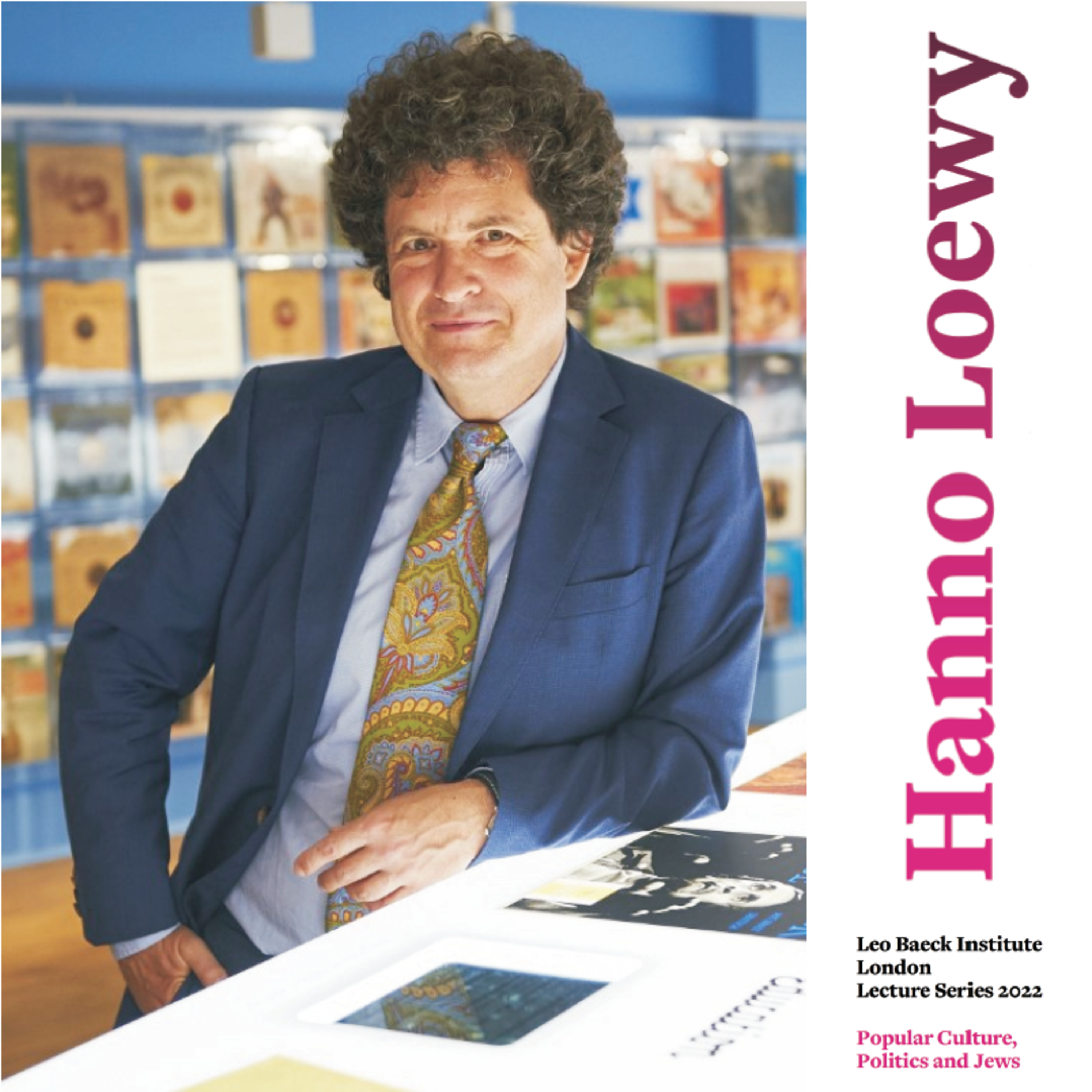 Leo Baeck Institute LondonJukebox? Jewkbox!Hanno Loewy - Jüdisches Museum Hohenems, Austria
6.30pm, 17 March 2022
The history of ‘Pop’ is a history of music, migration and transcultural exchange. Following the invention of recording technologies and the worldwide production and distribution of records at the end of the 19th century, the new music industry created a new global culture. Jews were prominently involved in that process on all planes, from the creation of the Shellac record and the Gramophone by Emil Berliner, to the pioneers of the music industry and Tin Pan Alley. They were composers of musicals and popular songs and po...2022-03-171h 43
Leo Baeck Institute LondonJukebox? Jewkbox!Hanno Loewy - Jüdisches Museum Hohenems, Austria
6.30pm, 17 March 2022
The history of ‘Pop’ is a history of music, migration and transcultural exchange. Following the invention of recording technologies and the worldwide production and distribution of records at the end of the 19th century, the new music industry created a new global culture. Jews were prominently involved in that process on all planes, from the creation of the Shellac record and the Gramophone by Emil Berliner, to the pioneers of the music industry and Tin Pan Alley. They were composers of musicals and popular songs and po...2022-03-171h 43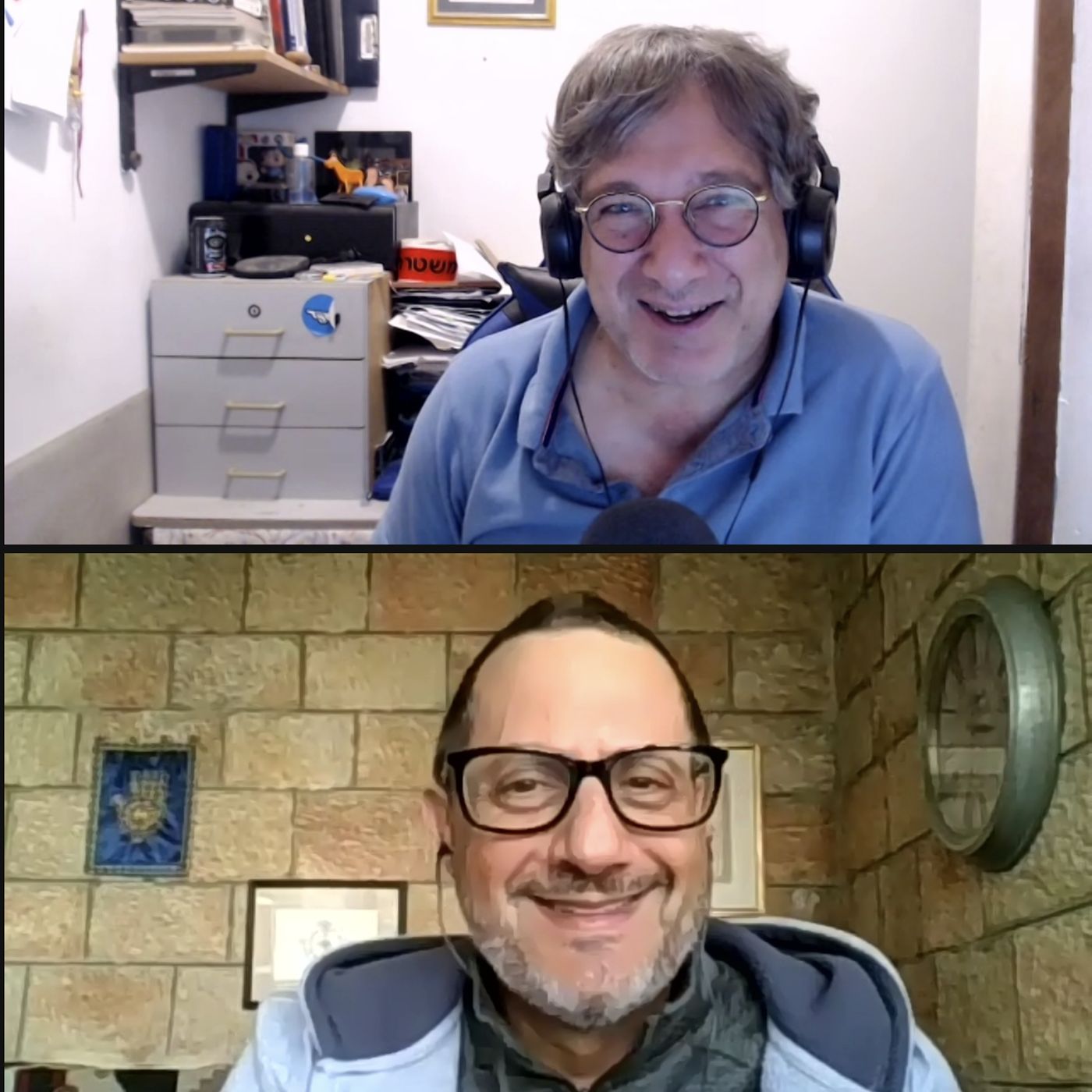 Bereaved But Still MeA Duet of Joy and Sorrow with Alden SolovyIn this episode, “A Duet of Joy and Sorrow with Alden Solovy” we’ll be taking a look at some of the issues surrounding that very challenge.Alden Solovy spreads joy and excitement for prayer. An American Israeli liturgist, poet, lyricist, author, and educator, Alden is the Liturgist-in-Residence for the Pardes Institute of Jewish Studies in Jerusalem. His writing was transformed by multiple tragedies, marked in 2009 by the sudden death of his wife from a catastrophic brain injury. His teaching spans from Hebrew Union College-Jewish Institute of Religion and the Conservative Yeshiva in Jerusalem to synagogues throughout North Americ...2021-12-0728 min
Bereaved But Still MeA Duet of Joy and Sorrow with Alden SolovyIn this episode, “A Duet of Joy and Sorrow with Alden Solovy” we’ll be taking a look at some of the issues surrounding that very challenge.Alden Solovy spreads joy and excitement for prayer. An American Israeli liturgist, poet, lyricist, author, and educator, Alden is the Liturgist-in-Residence for the Pardes Institute of Jewish Studies in Jerusalem. His writing was transformed by multiple tragedies, marked in 2009 by the sudden death of his wife from a catastrophic brain injury. His teaching spans from Hebrew Union College-Jewish Institute of Religion and the Conservative Yeshiva in Jerusalem to synagogues throughout North Americ...2021-12-0728 min Bereaved But Still MeA Duet of Joy and Sorrow with Alden SolovySend us a textIn this episode, “A Duet of Joy and Sorrow with Alden Solovy” we’ll be taking a look at some of the issues surrounding that very challenge.Alden Solovy spreads joy and excitement for prayer. An American Israeli liturgist, poet, lyricist, author, and educator, Alden is the Liturgist-in-Residence for the Pardes Institute of Jewish Studies in Jerusalem. His writing was transformed by multiple tragedies, marked in 2009 by the sudden death of his wife from a catastrophic brain injury. His teaching spans from Hebrew Union College-Jewish Institute of Religion and the...2021-12-0228 min
Bereaved But Still MeA Duet of Joy and Sorrow with Alden SolovySend us a textIn this episode, “A Duet of Joy and Sorrow with Alden Solovy” we’ll be taking a look at some of the issues surrounding that very challenge.Alden Solovy spreads joy and excitement for prayer. An American Israeli liturgist, poet, lyricist, author, and educator, Alden is the Liturgist-in-Residence for the Pardes Institute of Jewish Studies in Jerusalem. His writing was transformed by multiple tragedies, marked in 2009 by the sudden death of his wife from a catastrophic brain injury. His teaching spans from Hebrew Union College-Jewish Institute of Religion and the...2021-12-0228 min Leo Baeck Institute LondonFrom Heartland to Homeland? – German-Jewish Émigré Artists in Britain, ca. 1933-45Sarah MacDougall (Ben Uri Gallery and Museum, London, UK)
From Heartland to Homeland? – German-Jewish Émigré Artists in Britain, ca. 1933-45
6.30pm, November 11th 2021
Founded as an arts society in 1915 in London’s East End, Ben Uri’s collection, exhibition history and programming were significantly impacted from the 1930s onwards by the artistic influx of the so-called ‘Hitler émigrés’. This lecture examines the conception of Heimat in relation to the lives and work of German-Jewish artists from this cohort, among them Frank Auerbach and Eva Frankfurther, as they navigated their new host culture, touching on no...2021-11-111h 34
Leo Baeck Institute LondonFrom Heartland to Homeland? – German-Jewish Émigré Artists in Britain, ca. 1933-45Sarah MacDougall (Ben Uri Gallery and Museum, London, UK)
From Heartland to Homeland? – German-Jewish Émigré Artists in Britain, ca. 1933-45
6.30pm, November 11th 2021
Founded as an arts society in 1915 in London’s East End, Ben Uri’s collection, exhibition history and programming were significantly impacted from the 1930s onwards by the artistic influx of the so-called ‘Hitler émigrés’. This lecture examines the conception of Heimat in relation to the lives and work of German-Jewish artists from this cohort, among them Frank Auerbach and Eva Frankfurther, as they navigated their new host culture, touching on no...2021-11-111h 34 Progressively JewishS3E2 Rosh Chodesh Kislev: Remembering the ForemothersHost: Rabbi Richard Jacobi (East London & Essex Liberal Synagogue)
Guests: Rabbi Leah Jordan (Kehillah North London) & Kohenet Yael Tischler, Rabbinical Student, Leo Baeck College (LBC)2021-11-0529 min
Progressively JewishS3E2 Rosh Chodesh Kislev: Remembering the ForemothersHost: Rabbi Richard Jacobi (East London & Essex Liberal Synagogue)
Guests: Rabbi Leah Jordan (Kehillah North London) & Kohenet Yael Tischler, Rabbinical Student, Leo Baeck College (LBC)2021-11-0529 min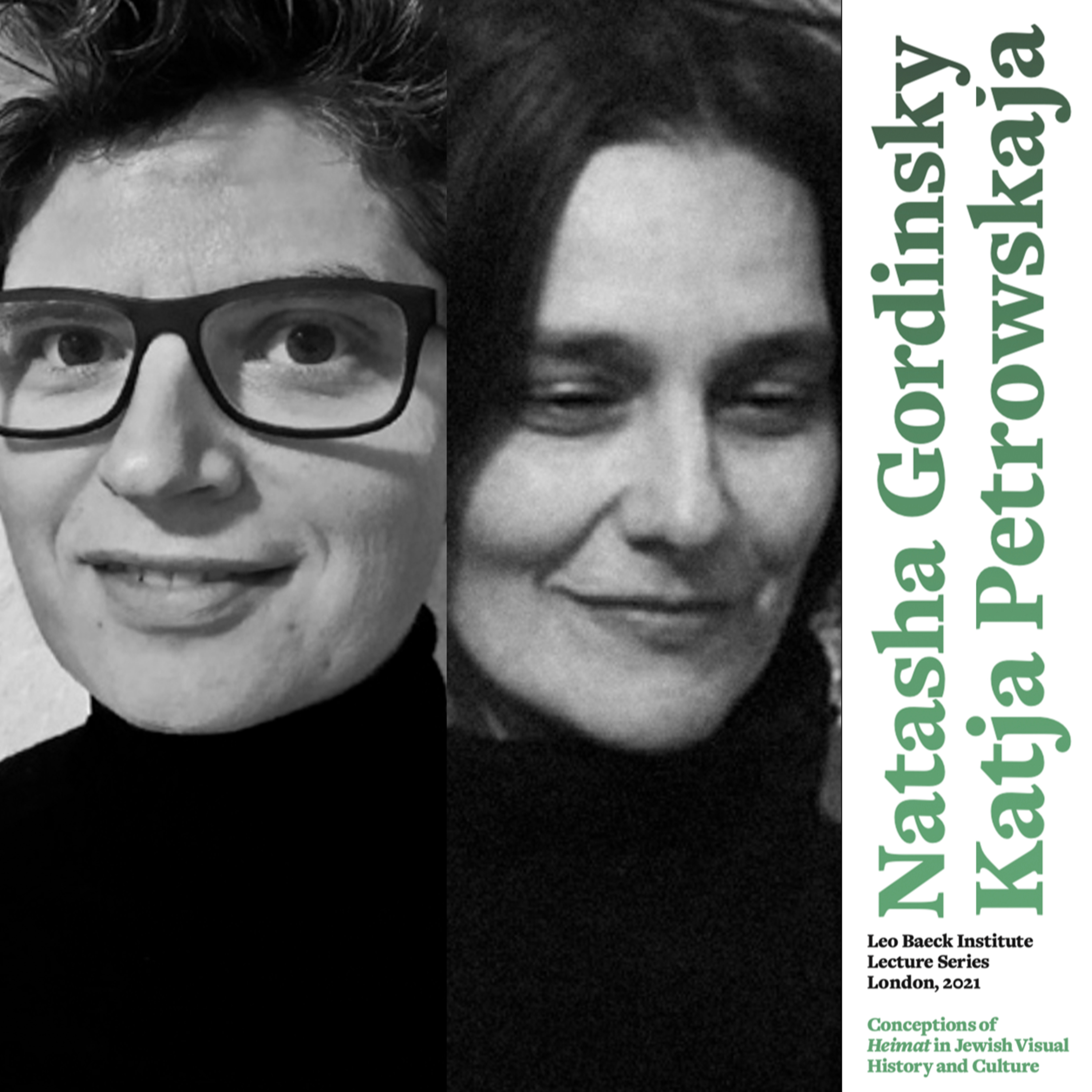 Leo Baeck Institute London‘Your Heimat is our Nightmare?’: Post-Soviet Poetic Interventions in German CultureDr Natasha Gordinsky Haifa, Israel
Dr Katja Petrowskaja Berlin, Germany
‘Your Heimat is our Nightmare?’: Post-Soviet Poetic Interventions in German Culture
6.30pm, October 14th 2021
In the past decade post-Soviet Jewish writers, poets and artists who live and work in Germany have played a crucial role in the ongoing debate on the various forms of migrant belonging in contemporary German culture. This lecture seeks to grasp the poetics of (non) belonging. Natasha Gordinsky will explore how different artists represent and de-stabilize performatively the meaning of Heimat, and reflect on this highly charged conc...2021-10-141h 29
Leo Baeck Institute London‘Your Heimat is our Nightmare?’: Post-Soviet Poetic Interventions in German CultureDr Natasha Gordinsky Haifa, Israel
Dr Katja Petrowskaja Berlin, Germany
‘Your Heimat is our Nightmare?’: Post-Soviet Poetic Interventions in German Culture
6.30pm, October 14th 2021
In the past decade post-Soviet Jewish writers, poets and artists who live and work in Germany have played a crucial role in the ongoing debate on the various forms of migrant belonging in contemporary German culture. This lecture seeks to grasp the poetics of (non) belonging. Natasha Gordinsky will explore how different artists represent and de-stabilize performatively the meaning of Heimat, and reflect on this highly charged conc...2021-10-141h 29 Progressively JewishS2E46 Simchat Torah Special - Season 2 Finale!Hosts: Rabbi Debbie-Young-Somers (Edgware and Hendon Reform Synagogue), Rabbi Richard Jacobi (East London & Essex Liberal Synagogue) & David-Yehuda Stern, Rabbinical Student (Leo Baeck College).2021-09-2324 min
Progressively JewishS2E46 Simchat Torah Special - Season 2 Finale!Hosts: Rabbi Debbie-Young-Somers (Edgware and Hendon Reform Synagogue), Rabbi Richard Jacobi (East London & Essex Liberal Synagogue) & David-Yehuda Stern, Rabbinical Student (Leo Baeck College).2021-09-2324 min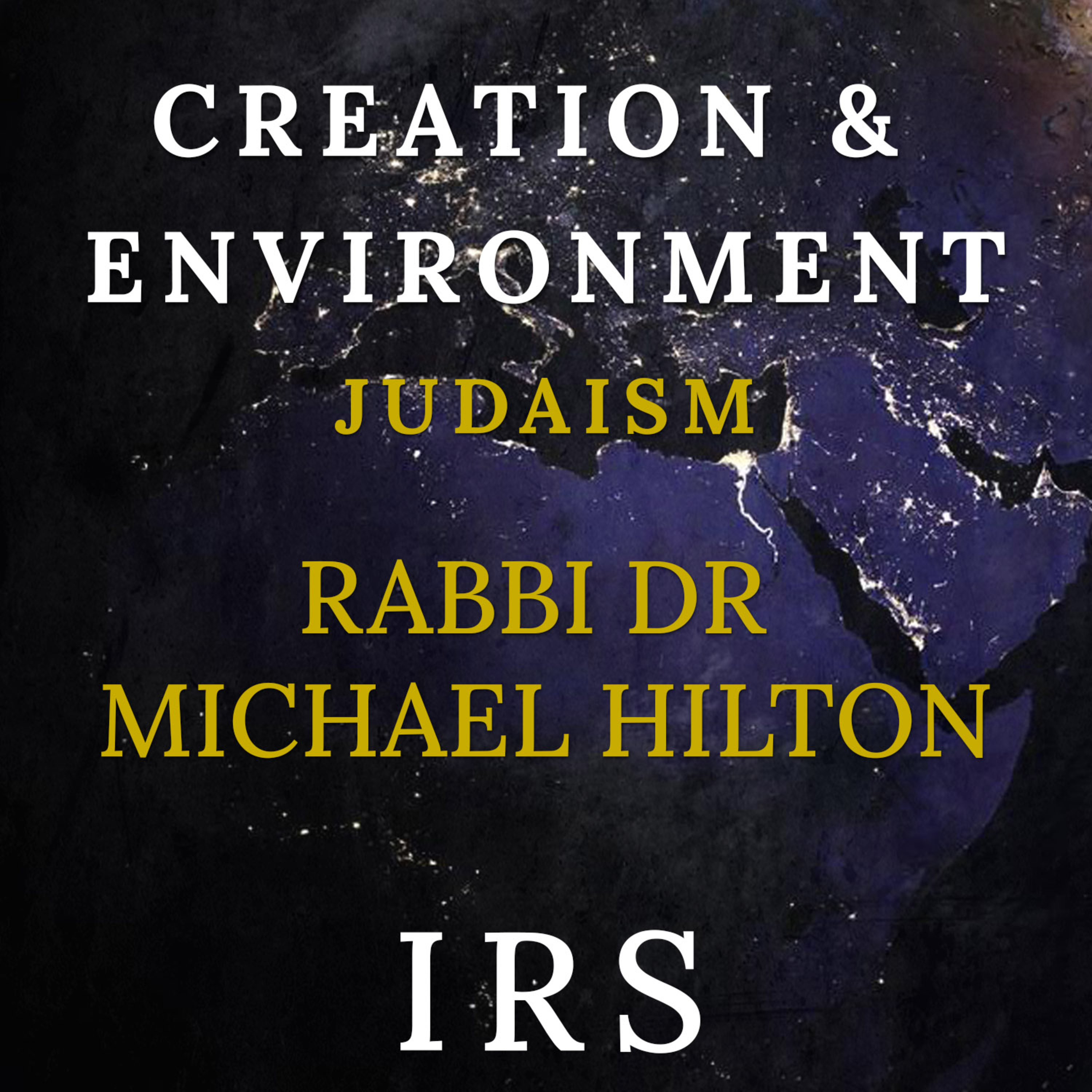 Al-Mahdi Institute PodcastsIRS | Creation and the environment in Judaism | Rabbi Dr Michael Hilton (1 of 3)Panel One: Presentation by Rabbi Dr Michael Hilton on the creation and the environment in Judaism (Part 1 of 3).
Rabbi Michael began by explaining that the exchange of ideas on foundational issues amongst the three faith traditions is not a novel occurrence. Whilst in the past forums like the IRS which bring together intellectuals of Christianity, Islam, and Judaism for scholarly discussions did not necessarily exist, reading and replying to the scholarly works of other faiths was not uncommon. Thus, IRS continues a tradition of debating and learning from one another. His presentation comprised of two parts; firstly...2021-06-3036 min
Al-Mahdi Institute PodcastsIRS | Creation and the environment in Judaism | Rabbi Dr Michael Hilton (1 of 3)Panel One: Presentation by Rabbi Dr Michael Hilton on the creation and the environment in Judaism (Part 1 of 3).
Rabbi Michael began by explaining that the exchange of ideas on foundational issues amongst the three faith traditions is not a novel occurrence. Whilst in the past forums like the IRS which bring together intellectuals of Christianity, Islam, and Judaism for scholarly discussions did not necessarily exist, reading and replying to the scholarly works of other faiths was not uncommon. Thus, IRS continues a tradition of debating and learning from one another. His presentation comprised of two parts; firstly...2021-06-3036 min Progressively JewishS2E31 Korach - ControversyHost: David-Yehuda Stern, Rabbinical Student, Leo Baeck College (LBC)
Guests: Rabbi Leah Jordan (Kehillah North London) and Student Rabbi Gabriel Kanter-Webber (LBC)2021-06-1036 min
Progressively JewishS2E31 Korach - ControversyHost: David-Yehuda Stern, Rabbinical Student, Leo Baeck College (LBC)
Guests: Rabbi Leah Jordan (Kehillah North London) and Student Rabbi Gabriel Kanter-Webber (LBC)2021-06-1036 min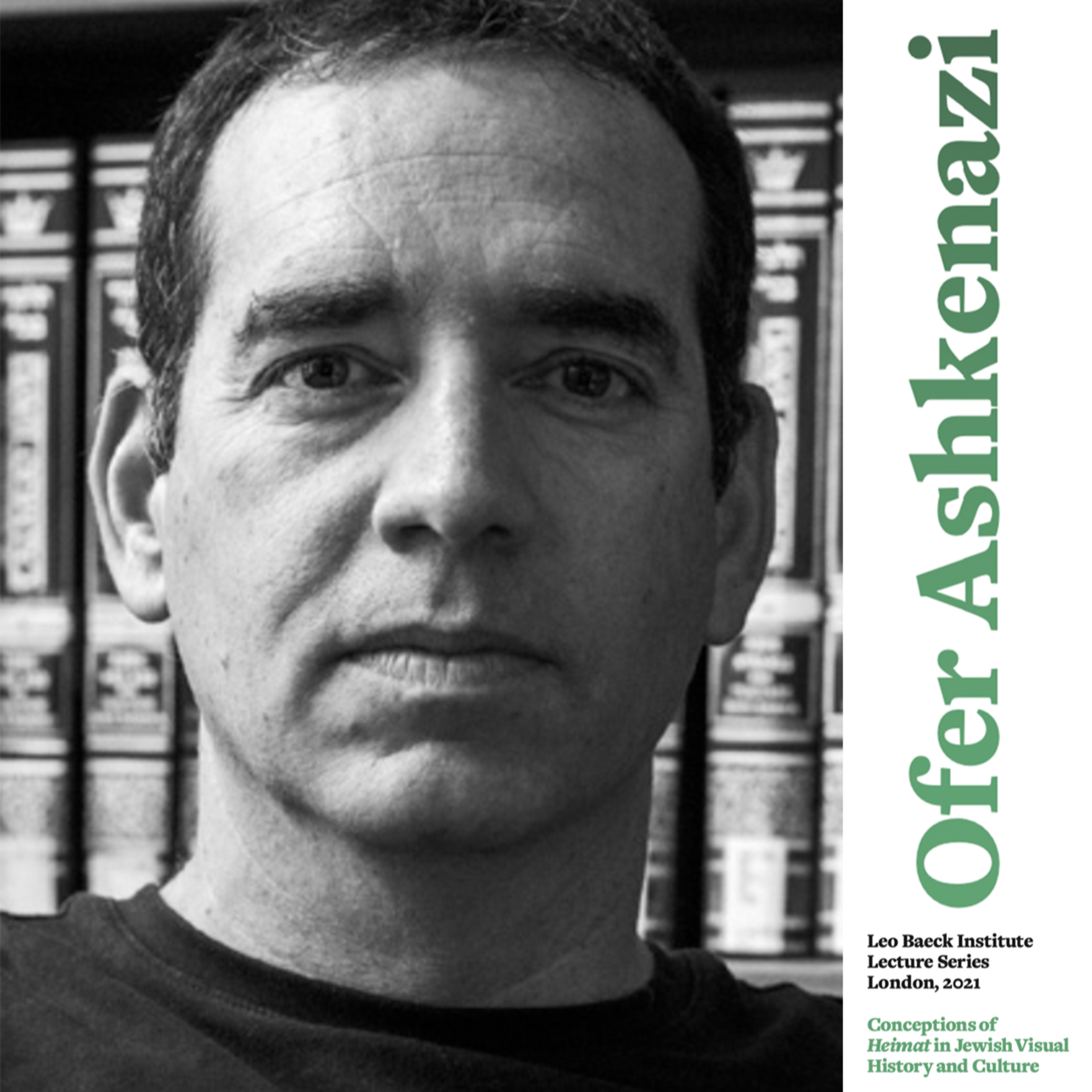 Leo Baeck Institute LondonHeimat as a Shelter from NazismOfer Ashkenazi
(Hebrew University of Jerusalem, Israel)
6.30pm, 22 April 2021
This talk analyses the presence of generic Heimat imagery in German-Jewish family albums from the 1930s and highlights two major tendencies: the appropriation of Heimat iconography in photographs of the Jewish home, and the endeavour to situate Jewish family members within generic Heimat scenes. In both cases, Heimat iconography alluded to an alternative notion of German identity – and of belonging in the German landscape – which allowed and encouraged the integration of Jews within it. Consequently, in Jewish family albums, Heimat imagery provided an imagined lands...2021-04-221h 20
Leo Baeck Institute LondonHeimat as a Shelter from NazismOfer Ashkenazi
(Hebrew University of Jerusalem, Israel)
6.30pm, 22 April 2021
This talk analyses the presence of generic Heimat imagery in German-Jewish family albums from the 1930s and highlights two major tendencies: the appropriation of Heimat iconography in photographs of the Jewish home, and the endeavour to situate Jewish family members within generic Heimat scenes. In both cases, Heimat iconography alluded to an alternative notion of German identity – and of belonging in the German landscape – which allowed and encouraged the integration of Jews within it. Consequently, in Jewish family albums, Heimat imagery provided an imagined lands...2021-04-221h 20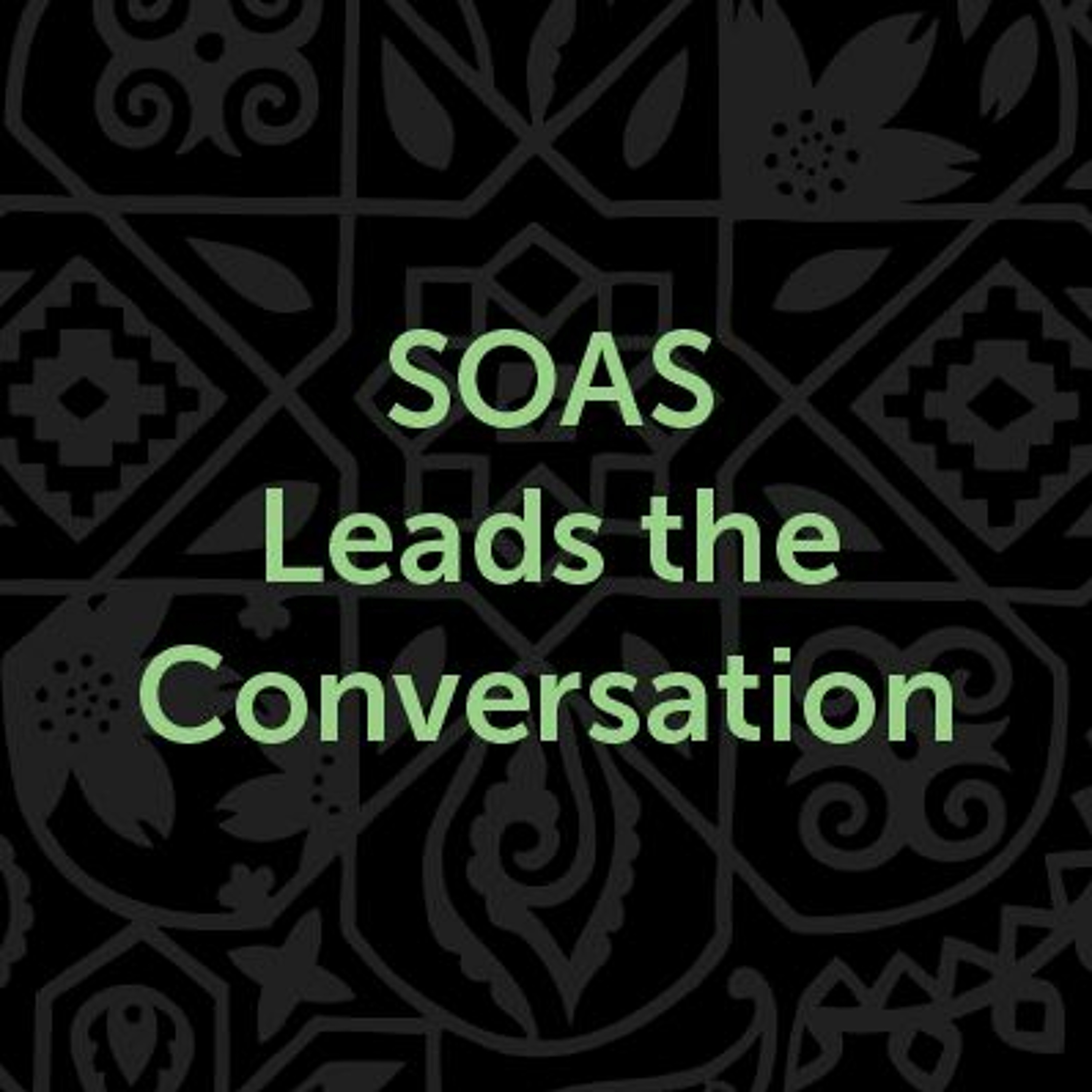 SOAS RadioSOAS Leads the Conversation: COVID-19 in UK Jewish CommunitiesIn this episode we were fortunate to have Catherine Hezser, professor of Jewish Studies at SOAS, lead an episode discussing Jews and Coronavirus. She will be talking to Dr. Daniel Staetsky, Senior Research Fellow at the Institute for Jewish Policy Research, Dr. Keith Kahn Harris, Senior Lecturer and course team leader at Leo Baeck College, and Dr Michael Marks, Associate Professor at the London School of Hygiene and tropical medicine. We will also be joined by Mr Eli Spitzer, headmaster at the Talmud Torah Tiferes Shlomo boys’ school , an Orthodox school in North London. They discuss how Jewish communities have fa...2021-03-3047 min
SOAS RadioSOAS Leads the Conversation: COVID-19 in UK Jewish CommunitiesIn this episode we were fortunate to have Catherine Hezser, professor of Jewish Studies at SOAS, lead an episode discussing Jews and Coronavirus. She will be talking to Dr. Daniel Staetsky, Senior Research Fellow at the Institute for Jewish Policy Research, Dr. Keith Kahn Harris, Senior Lecturer and course team leader at Leo Baeck College, and Dr Michael Marks, Associate Professor at the London School of Hygiene and tropical medicine. We will also be joined by Mr Eli Spitzer, headmaster at the Talmud Torah Tiferes Shlomo boys’ school , an Orthodox school in North London. They discuss how Jewish communities have fa...2021-03-3047 min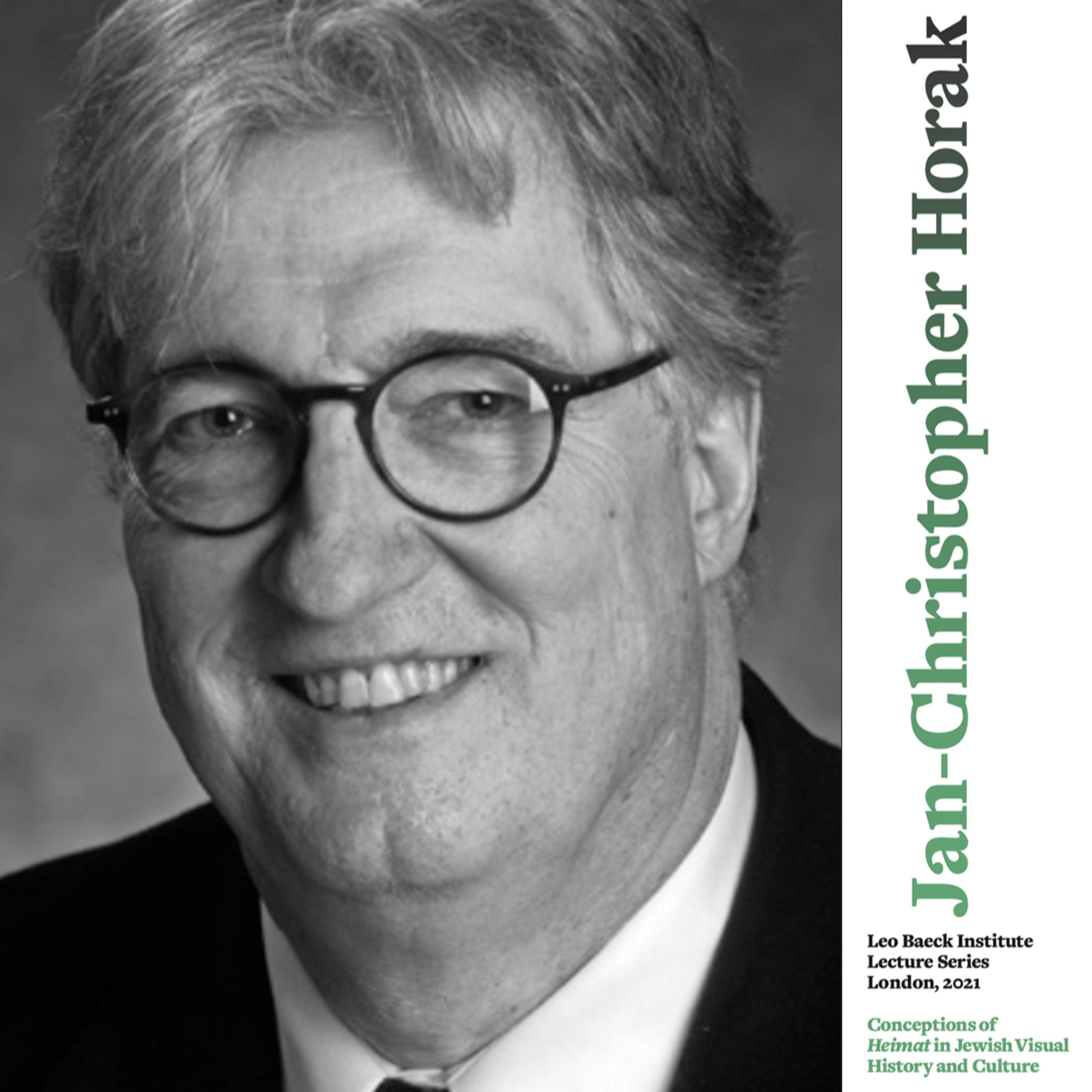 Leo Baeck Institute LondonHelmar Lerski between the Diaspora and a Jewish HomelandJan-Christopher Horak
(UCLA, Los Angeles, USA)
6.30pm, 18 March 2021
The nomadic photographer and filmmaker Helmar Lerski was born in Alsace, raised in Switzerland, began his professional career in Milwaukee, moved to Germany, travelled to Erez Israel and ultimately retired in Switzerland. Aesthetically, Lerski sought to communicate timeless values through the manipulation of light and the physiognomy of the human face in extreme close-ups. His photo project ‘Jewish Heads’ started his search for a distinct Jewish identity. While advocating a Jewish homeland as a Zionist filmmaker, Lerski remained loyal to his artistic vision. This dichotomy betw...2021-03-181h 28
Leo Baeck Institute LondonHelmar Lerski between the Diaspora and a Jewish HomelandJan-Christopher Horak
(UCLA, Los Angeles, USA)
6.30pm, 18 March 2021
The nomadic photographer and filmmaker Helmar Lerski was born in Alsace, raised in Switzerland, began his professional career in Milwaukee, moved to Germany, travelled to Erez Israel and ultimately retired in Switzerland. Aesthetically, Lerski sought to communicate timeless values through the manipulation of light and the physiognomy of the human face in extreme close-ups. His photo project ‘Jewish Heads’ started his search for a distinct Jewish identity. While advocating a Jewish homeland as a Zionist filmmaker, Lerski remained loyal to his artistic vision. This dichotomy betw...2021-03-181h 28 Beth Shalom Podcast 2024Gespräch mit Rabbiner BrandtZum Gedenktag für die Opfer des Nationalsozialismus 2021 Rabbiner Dr. Henry G. Brandt wurde 1927 als Heinz Georg in München geboren. Er war Zeuge des von den NS-Machthabern angeordneten Abrisses der Münchner (liberalen) Hauptsynagoge im Juni 1938, die er mit seinen Eltern regelmäßig besucht hatte. 1939 konnte er mit seiner Familie über England nach Palästina emigrieren. Während des Unabhängigkeitskrieges von 1948 diente er als Offizier in der Marine der israelischen Armee. Von 1951 bis 1955 studierte er in Nordirland Wirtschaftswissenschaften und wurde Marktanalytiker bei Ford in London. 1957 nahm er das Rabbinerstudium am Leo Baeck College in London...2021-03-1151 min
Beth Shalom Podcast 2024Gespräch mit Rabbiner BrandtZum Gedenktag für die Opfer des Nationalsozialismus 2021 Rabbiner Dr. Henry G. Brandt wurde 1927 als Heinz Georg in München geboren. Er war Zeuge des von den NS-Machthabern angeordneten Abrisses der Münchner (liberalen) Hauptsynagoge im Juni 1938, die er mit seinen Eltern regelmäßig besucht hatte. 1939 konnte er mit seiner Familie über England nach Palästina emigrieren. Während des Unabhängigkeitskrieges von 1948 diente er als Offizier in der Marine der israelischen Armee. Von 1951 bis 1955 studierte er in Nordirland Wirtschaftswissenschaften und wurde Marktanalytiker bei Ford in London. 1957 nahm er das Rabbinerstudium am Leo Baeck College in London...2021-03-1151 min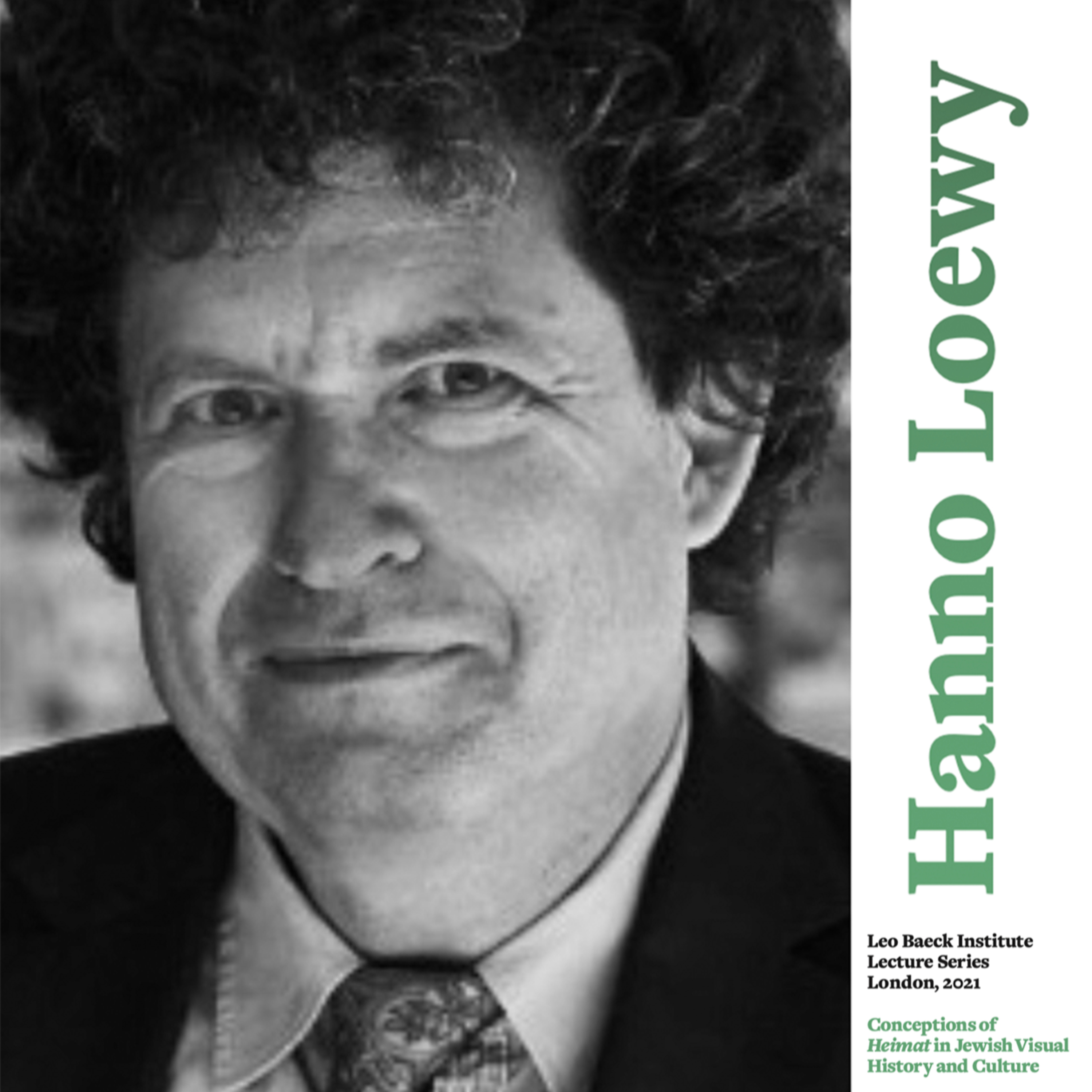 Leo Baeck Institute LondonUnrewarded Love: Alpine Clubs, Ski-Tourism, Folklore and the JewsHanno Loewy
(Jüdisches Museum Hohenems, Austria)
6.30pm, 11 February 2021
Among the pioneers turning the Alps into the playground of Europe, the urban Jewish middle class played a crucial role. While cities like Vienna, Berlin or Prague offered Jews access to secular culture, industry or higher education, the domesticated ‘wilderness’ of the mountains provided ‘innocence’ of togetherness and belonging beyond confines of class, religion and ethnicity. Jewish climbers, environmentalists and pioneers of tourism were among the first to organize Alpine clubs, while others reinvented folklore dressing. All of them lost faith in the Alpine pastorale...2021-02-111h 38
Leo Baeck Institute LondonUnrewarded Love: Alpine Clubs, Ski-Tourism, Folklore and the JewsHanno Loewy
(Jüdisches Museum Hohenems, Austria)
6.30pm, 11 February 2021
Among the pioneers turning the Alps into the playground of Europe, the urban Jewish middle class played a crucial role. While cities like Vienna, Berlin or Prague offered Jews access to secular culture, industry or higher education, the domesticated ‘wilderness’ of the mountains provided ‘innocence’ of togetherness and belonging beyond confines of class, religion and ethnicity. Jewish climbers, environmentalists and pioneers of tourism were among the first to organize Alpine clubs, while others reinvented folklore dressing. All of them lost faith in the Alpine pastorale...2021-02-111h 38 Jewcy TalksMachloket & Mischpoke. Folge 13: Alan Posener im Gespräch mit Jo Frank.Der Journalist Alan Posener sitzt zwischen allen Stühlen und fühlt sich dort sehr wohl . Er ist Engländer und Deutscher, Sohn eines jüdischen Vaters, Journalist, Autor und Lehrer. Aufgewachsen in London, Kuala Lumpur und Deutschland erzählt Posener im Gespräch mit Jo Frank vom "Mangel an klaren Identitäten", der den Blick schärfen kann, der Begeisterung für multikulturelles Zusammenleben, vom Antisemitismus, Schweigen und Stolz der Nachkriegszeit und dem Marxismus als Sinnstifter. Der Podcast des Ernst Ludwig Ehrlich Studienwerks ist eine Initiative der Leo Baeck Foundation. | © 2021 Ernst Ludwig Ehrlich Studi...2021-01-081h 05
Jewcy TalksMachloket & Mischpoke. Folge 13: Alan Posener im Gespräch mit Jo Frank.Der Journalist Alan Posener sitzt zwischen allen Stühlen und fühlt sich dort sehr wohl . Er ist Engländer und Deutscher, Sohn eines jüdischen Vaters, Journalist, Autor und Lehrer. Aufgewachsen in London, Kuala Lumpur und Deutschland erzählt Posener im Gespräch mit Jo Frank vom "Mangel an klaren Identitäten", der den Blick schärfen kann, der Begeisterung für multikulturelles Zusammenleben, vom Antisemitismus, Schweigen und Stolz der Nachkriegszeit und dem Marxismus als Sinnstifter. Der Podcast des Ernst Ludwig Ehrlich Studienwerks ist eine Initiative der Leo Baeck Foundation. | © 2021 Ernst Ludwig Ehrlich Studi...2021-01-081h 05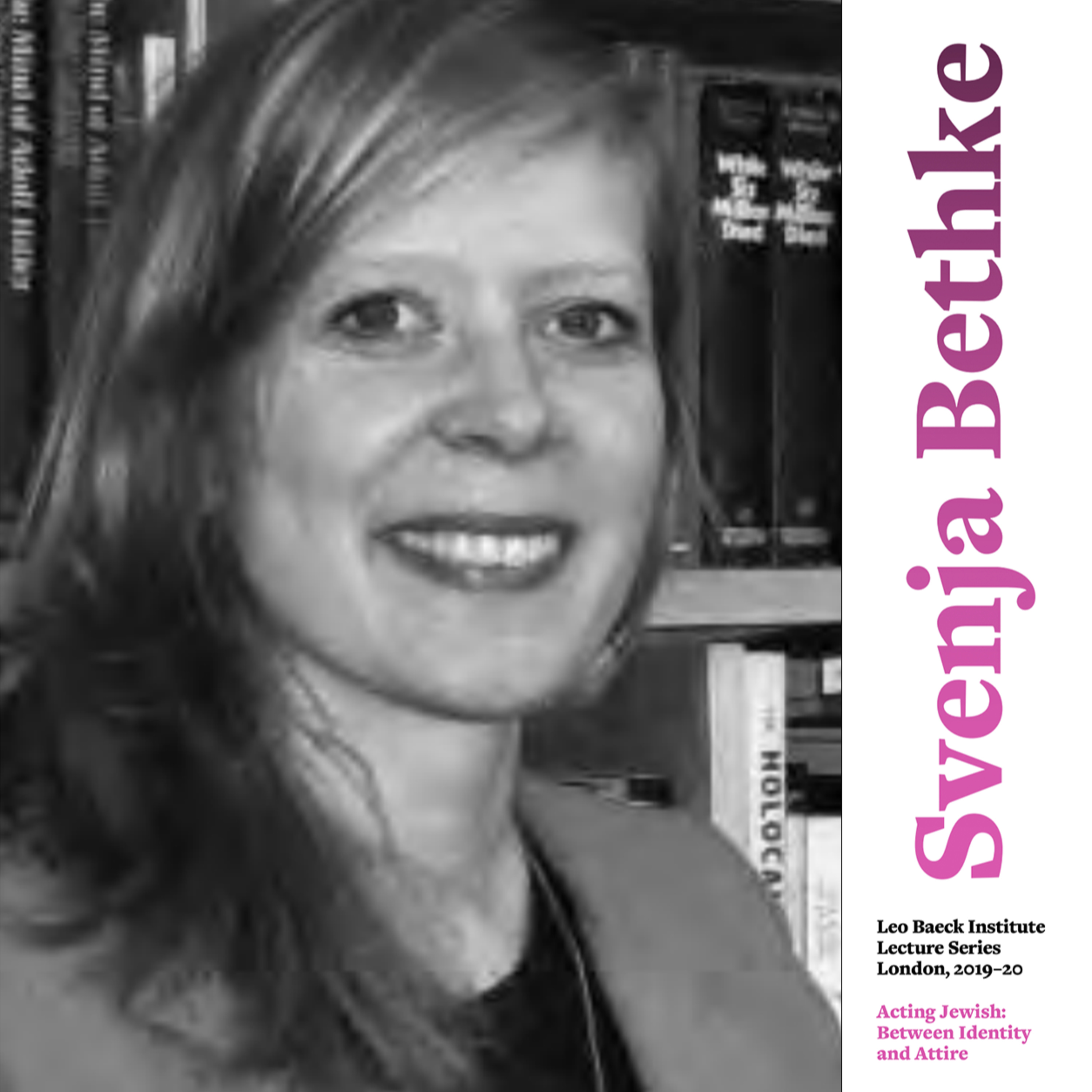 Leo Baeck Institute LondonHow to dress in Eretz Israel? Clothing, Fashion and Nation Building, 1880s – 1948Svenja Bethke
Lecturer in Modern European History University of Leicester, UK
How to dress in Eretz Israel? Clothing, Fashion and Nation Building, 1880s–1948
6.30pm, 19th November 2020
The identities of many Eastern European and German Jews who immigrated to Eretz Israel between the 1880s and the foundation of the Israeli state in 1948 oscillated between their roots and identification with the new Zionist project. This lecture explores how immigrants expressed social, cultural and political belonging through clothing and, focusing on gender and visual materials, offers fresh perspectives on how clothing became fashion, or ‘anti...2020-11-191h 14
Leo Baeck Institute LondonHow to dress in Eretz Israel? Clothing, Fashion and Nation Building, 1880s – 1948Svenja Bethke
Lecturer in Modern European History University of Leicester, UK
How to dress in Eretz Israel? Clothing, Fashion and Nation Building, 1880s–1948
6.30pm, 19th November 2020
The identities of many Eastern European and German Jews who immigrated to Eretz Israel between the 1880s and the foundation of the Israeli state in 1948 oscillated between their roots and identification with the new Zionist project. This lecture explores how immigrants expressed social, cultural and political belonging through clothing and, focusing on gender and visual materials, offers fresh perspectives on how clothing became fashion, or ‘anti...2020-11-191h 14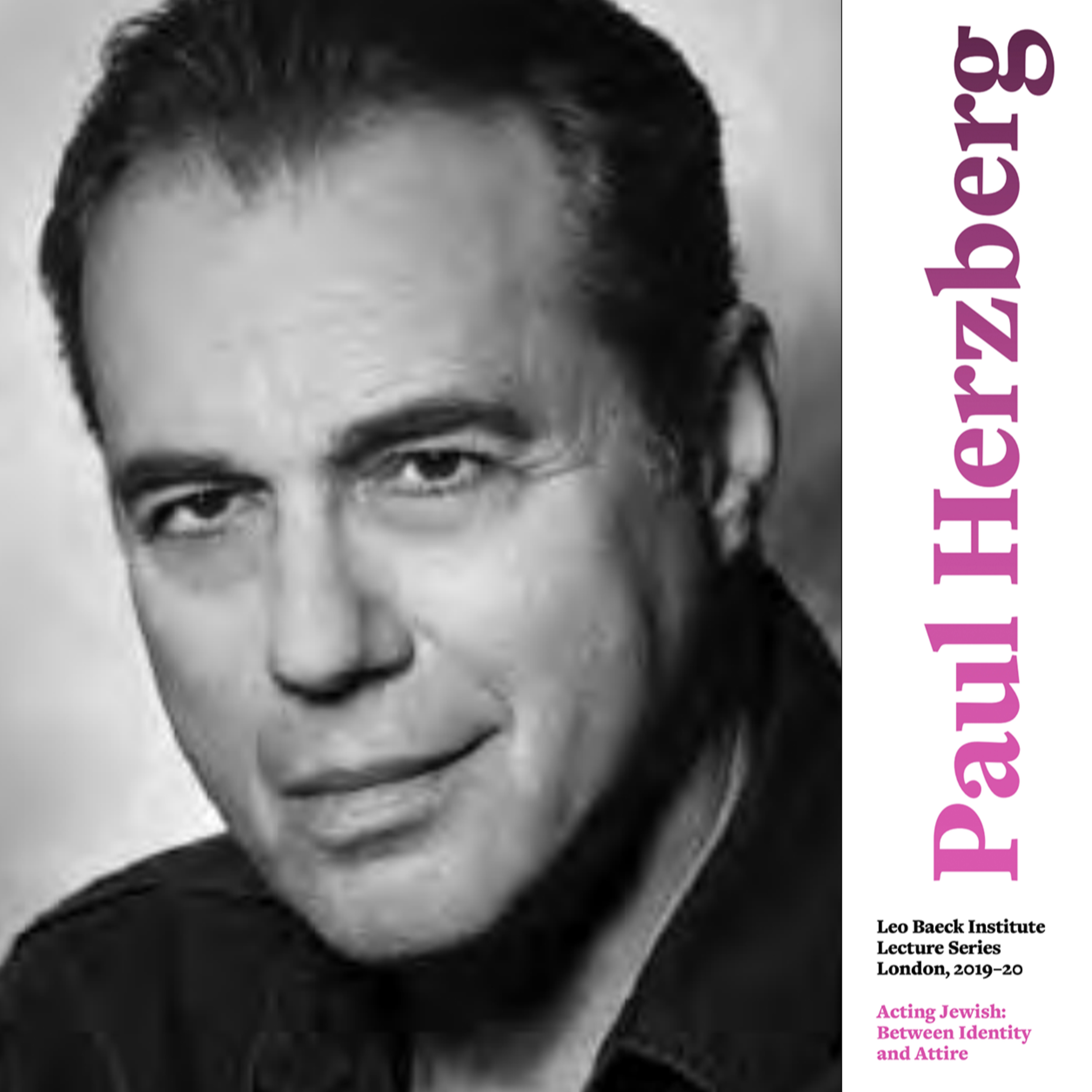 Leo Baeck Institute LondonActing Jewish: Perception and RealityPaul Herzberg
6.30pm, 8 October 2020 (Online event)
What does ‘acting Jewish’ really mean? Is it a style of performance drawing on the alleged traits of global Jewry? Or is it perhaps about ancient perceptions? Paul Herzberg offers a view, drawing on his four decades in the entertainment industry.
Paul Herzberg is an actor and writer. His most recent appearances as an actor were as John Vorster in Antony Sher’s ID at the Almeida; Shylock in The Merchant of Venice at The Arcola, at the RSC as Vincentio in The Taming of The Shrew; in 2017...2020-10-081h 26
Leo Baeck Institute LondonActing Jewish: Perception and RealityPaul Herzberg
6.30pm, 8 October 2020 (Online event)
What does ‘acting Jewish’ really mean? Is it a style of performance drawing on the alleged traits of global Jewry? Or is it perhaps about ancient perceptions? Paul Herzberg offers a view, drawing on his four decades in the entertainment industry.
Paul Herzberg is an actor and writer. His most recent appearances as an actor were as John Vorster in Antony Sher’s ID at the Almeida; Shylock in The Merchant of Venice at The Arcola, at the RSC as Vincentio in The Taming of The Shrew; in 2017...2020-10-081h 26 Jewcy TalksMachloket & Mischpoke. Folge 10: Black Jew*esses und Jew*esses of Colour, die Geschichte der Schwarz-Jüdischen-BeziehungenDer Afroamerikaner George Floyd wurde am 25. Mai 2020 bei einer brutalen Polizeiaktion in Minneapolis, USA, getötet. Sein Tod hat zu weltweiten Protesten gegen Rassismus und Polizeigewalt geführt. Auch in Deutschland gingen in den vergangenen Tagen Zehntausende gegen Rassismus auf die Straßen. In der 10. Folge von "Machloket und Mischpoke" beschäftigen wir uns mit der aktuellen Situation und fokussieren besonders Black Jew*esses und Jew*esses of Colour, die Geschichte der Schwarz-Jüdischen-Beziehungen sowie Fragen nach Intersektionalität und Allianzen. Unsere Gäste: Rebecca Ajnwojner studierte Psychologie, Dramaturgie und Regie in Heidelberg, Frankfurt...2020-06-301h 39
Jewcy TalksMachloket & Mischpoke. Folge 10: Black Jew*esses und Jew*esses of Colour, die Geschichte der Schwarz-Jüdischen-BeziehungenDer Afroamerikaner George Floyd wurde am 25. Mai 2020 bei einer brutalen Polizeiaktion in Minneapolis, USA, getötet. Sein Tod hat zu weltweiten Protesten gegen Rassismus und Polizeigewalt geführt. Auch in Deutschland gingen in den vergangenen Tagen Zehntausende gegen Rassismus auf die Straßen. In der 10. Folge von "Machloket und Mischpoke" beschäftigen wir uns mit der aktuellen Situation und fokussieren besonders Black Jew*esses und Jew*esses of Colour, die Geschichte der Schwarz-Jüdischen-Beziehungen sowie Fragen nach Intersektionalität und Allianzen. Unsere Gäste: Rebecca Ajnwojner studierte Psychologie, Dramaturgie und Regie in Heidelberg, Frankfurt...2020-06-301h 39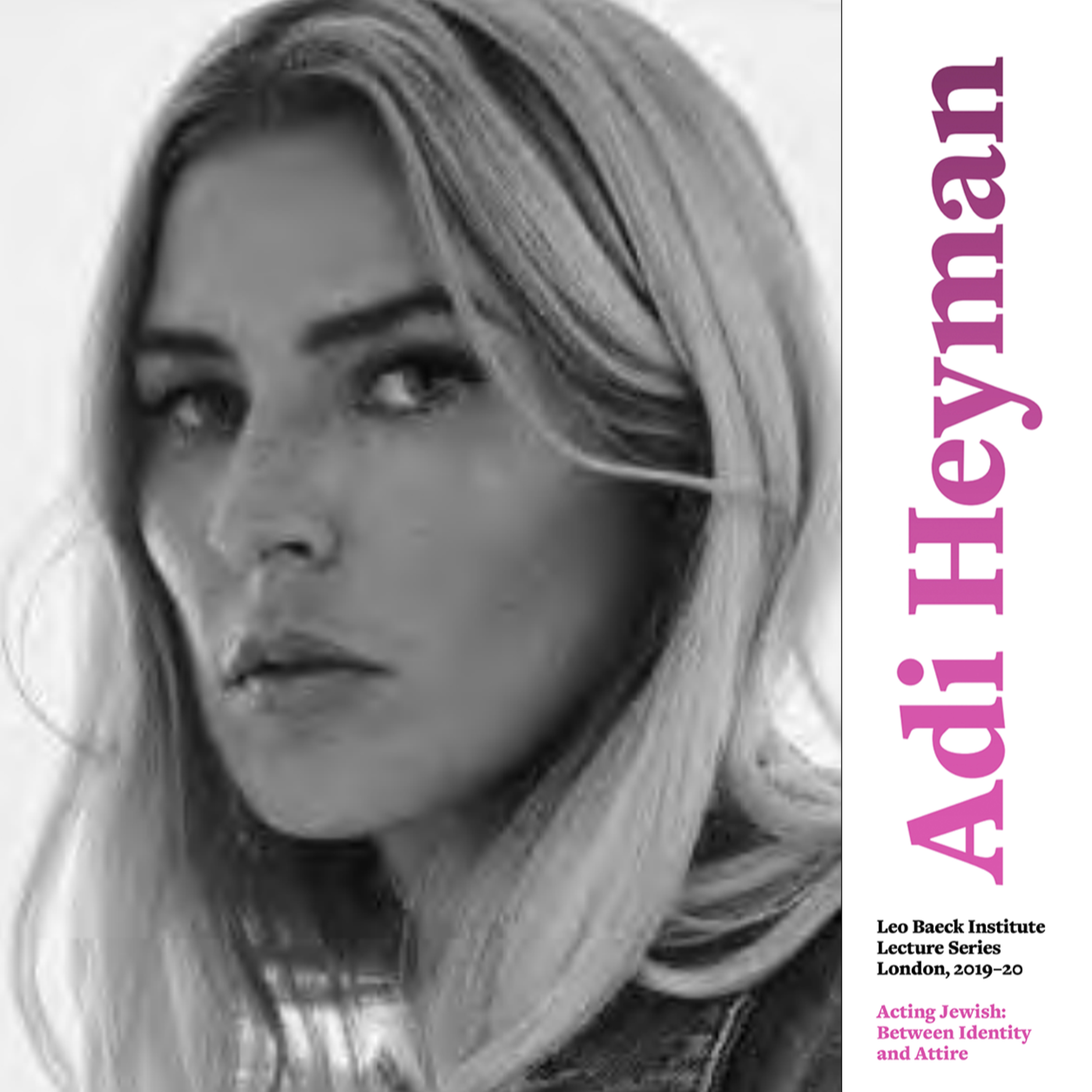 Leo Baeck Institute LondonThe Big Cover-Up: Modest FashionAdi Heyman
‘Modest Fashion’ blogger and founder of the ‘Jewish Fashion Council’, USA
The Big Cover-Up: Modest Fashion
6.30pm, 4th March 2020
What started out as religious niche has matured into a 250 billion-dollar industry largely pioneered by a group of diverse women embracing unique identities on social media. Fashion stylist turned blogger, Adi Heyman’s inspiration behind launching a Jewish fashion and lifestyle blog in 2010 stemmed from her personal and professional experience as an Orthodox Jew working in the fashion industry.
In her talk, Heyman explores the possibility of being an ‘Orthod...2020-03-041h 31
Leo Baeck Institute LondonThe Big Cover-Up: Modest FashionAdi Heyman
‘Modest Fashion’ blogger and founder of the ‘Jewish Fashion Council’, USA
The Big Cover-Up: Modest Fashion
6.30pm, 4th March 2020
What started out as religious niche has matured into a 250 billion-dollar industry largely pioneered by a group of diverse women embracing unique identities on social media. Fashion stylist turned blogger, Adi Heyman’s inspiration behind launching a Jewish fashion and lifestyle blog in 2010 stemmed from her personal and professional experience as an Orthodox Jew working in the fashion industry.
In her talk, Heyman explores the possibility of being an ‘Orthod...2020-03-041h 31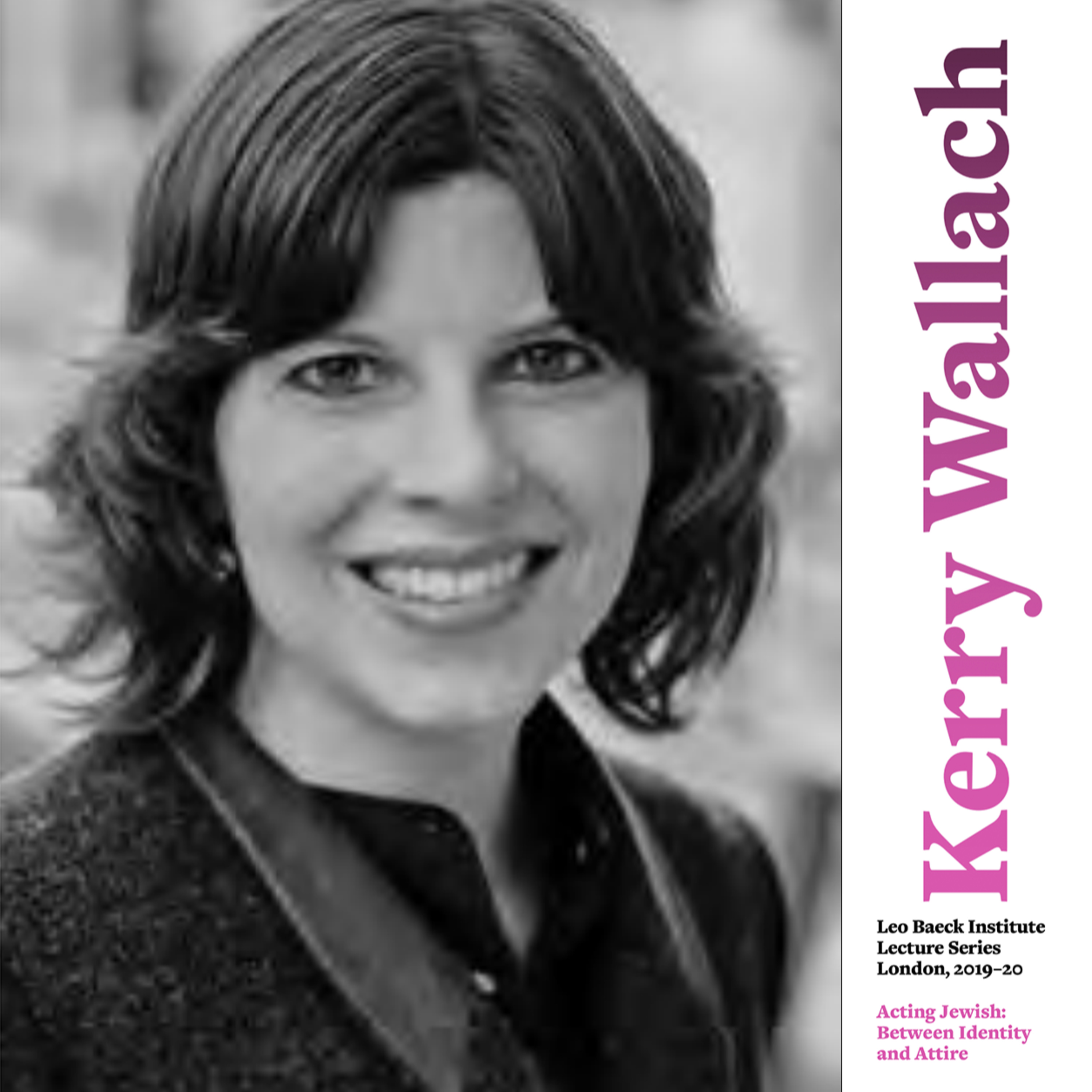 Leo Baeck Institute London‘Coming Out’ as Jewish in Weimar GermanyProf Kerry Wallach
(Gettysburg College, USA)
6.30pm, 23 January 2020
In the 1920s and early 1930s – as today – Jews in Germany were concerned about growing anti-Semitism, and many took precautions to conceal their Jewishness by dressing and behaving in certain ‘assimilated’ ways. Yet there were still occasions when it was beneficial to be openly Jewish. This lecture explores the tensions that came with being visible as a Jew – an identity play that often involved appearing simultaneously non-Jewish and Jewish. Drawing on a wide range of images and films, this presentation explores controversial aspects of German Jewish vis...2020-01-231h 29
Leo Baeck Institute London‘Coming Out’ as Jewish in Weimar GermanyProf Kerry Wallach
(Gettysburg College, USA)
6.30pm, 23 January 2020
In the 1920s and early 1930s – as today – Jews in Germany were concerned about growing anti-Semitism, and many took precautions to conceal their Jewishness by dressing and behaving in certain ‘assimilated’ ways. Yet there were still occasions when it was beneficial to be openly Jewish. This lecture explores the tensions that came with being visible as a Jew – an identity play that often involved appearing simultaneously non-Jewish and Jewish. Drawing on a wide range of images and films, this presentation explores controversial aspects of German Jewish vis...2020-01-231h 29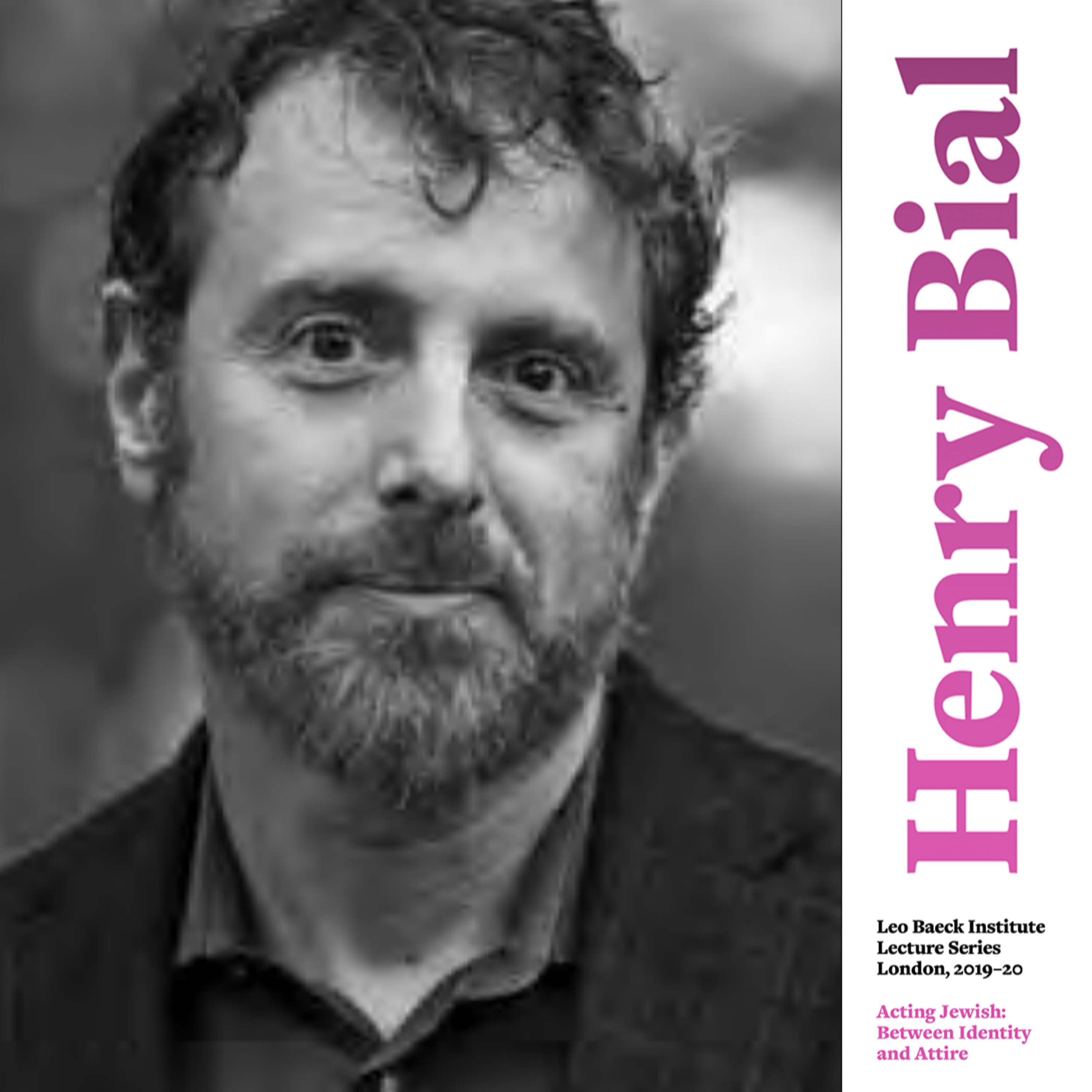 Leo Baeck Institute LondonJewish on Demand: Representation and Difference in the Streaming EraProf Henry Bial
(University of Kansas, USA)
6.30pm, 5 December 2019
Classic Jewish film and television, from The Jazz Singer to Seinfeld, was shaped by the economic need to reach the broadest possible audience, leading to creative strategies that minimized or downplayed the difference between Jews and the rest of society. As Netflix and other streaming services have made more specialized entertainment commercially viable, new ways of acting Jewish on screen have emerged that highlight the quirkier and more contested aspects of Jewish identity.
Henry Bial is Professor and Chair of the Department...2019-12-051h 36
Leo Baeck Institute LondonJewish on Demand: Representation and Difference in the Streaming EraProf Henry Bial
(University of Kansas, USA)
6.30pm, 5 December 2019
Classic Jewish film and television, from The Jazz Singer to Seinfeld, was shaped by the economic need to reach the broadest possible audience, leading to creative strategies that minimized or downplayed the difference between Jews and the rest of society. As Netflix and other streaming services have made more specialized entertainment commercially viable, new ways of acting Jewish on screen have emerged that highlight the quirkier and more contested aspects of Jewish identity.
Henry Bial is Professor and Chair of the Department...2019-12-051h 36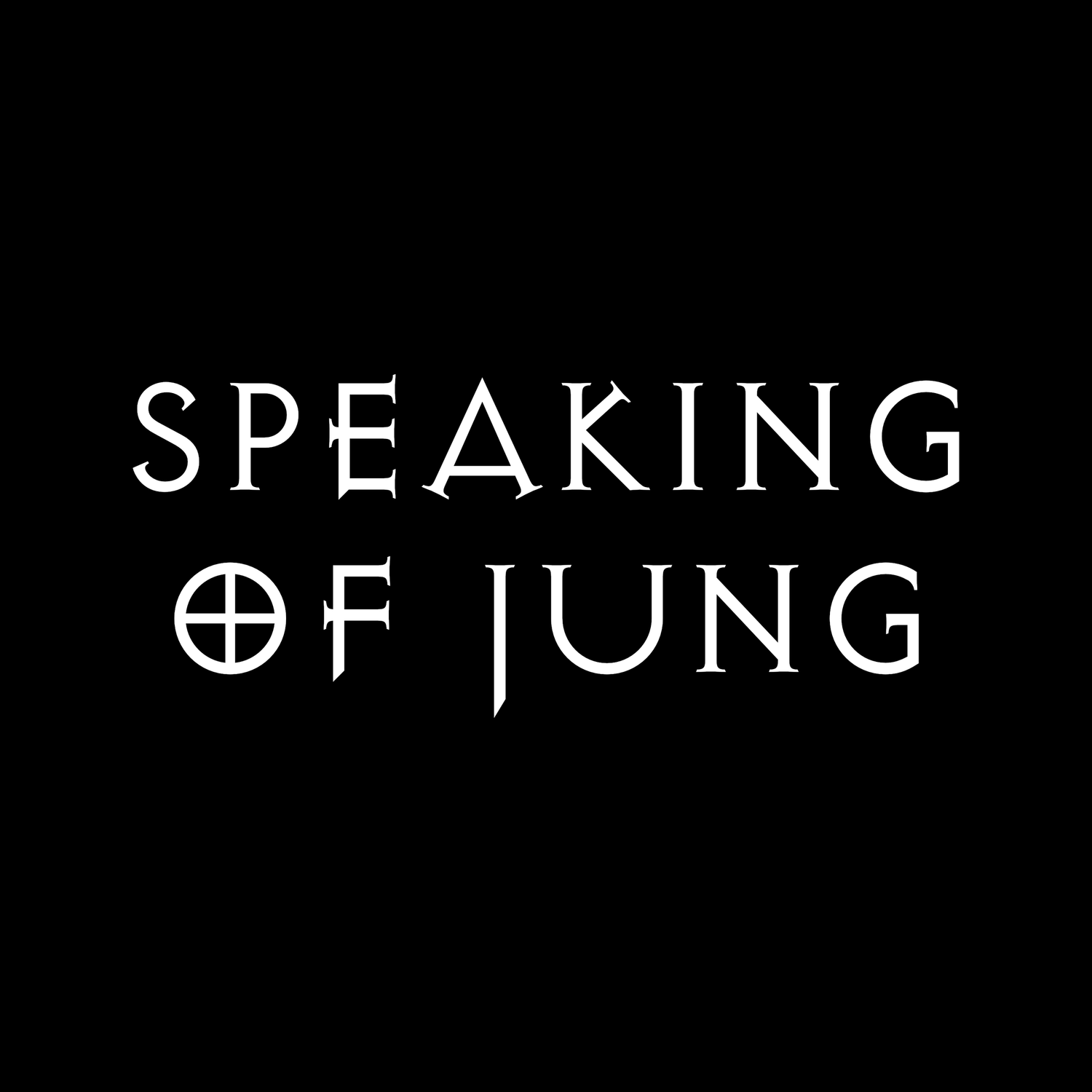 Speaking of Jung: Interviews with Jungian AnalystsThe Analyst and The RabbiWe are joined by co-writers Murray Stein, Ph.D. in Zürich and Henry Abramovitch, Ph.D. in Israel to discuss their new play, The Analyst and The Rabbi: C.G. Jung and Rabbi Leo Baeck, which addresses the anti-Semitic remarks made by Jung in 1934 and the accusation that he was a Nazi.2019-08-0759 min
Speaking of Jung: Interviews with Jungian AnalystsThe Analyst and The RabbiWe are joined by co-writers Murray Stein, Ph.D. in Zürich and Henry Abramovitch, Ph.D. in Israel to discuss their new play, The Analyst and The Rabbi: C.G. Jung and Rabbi Leo Baeck, which addresses the anti-Semitic remarks made by Jung in 1934 and the accusation that he was a Nazi.2019-08-0759 min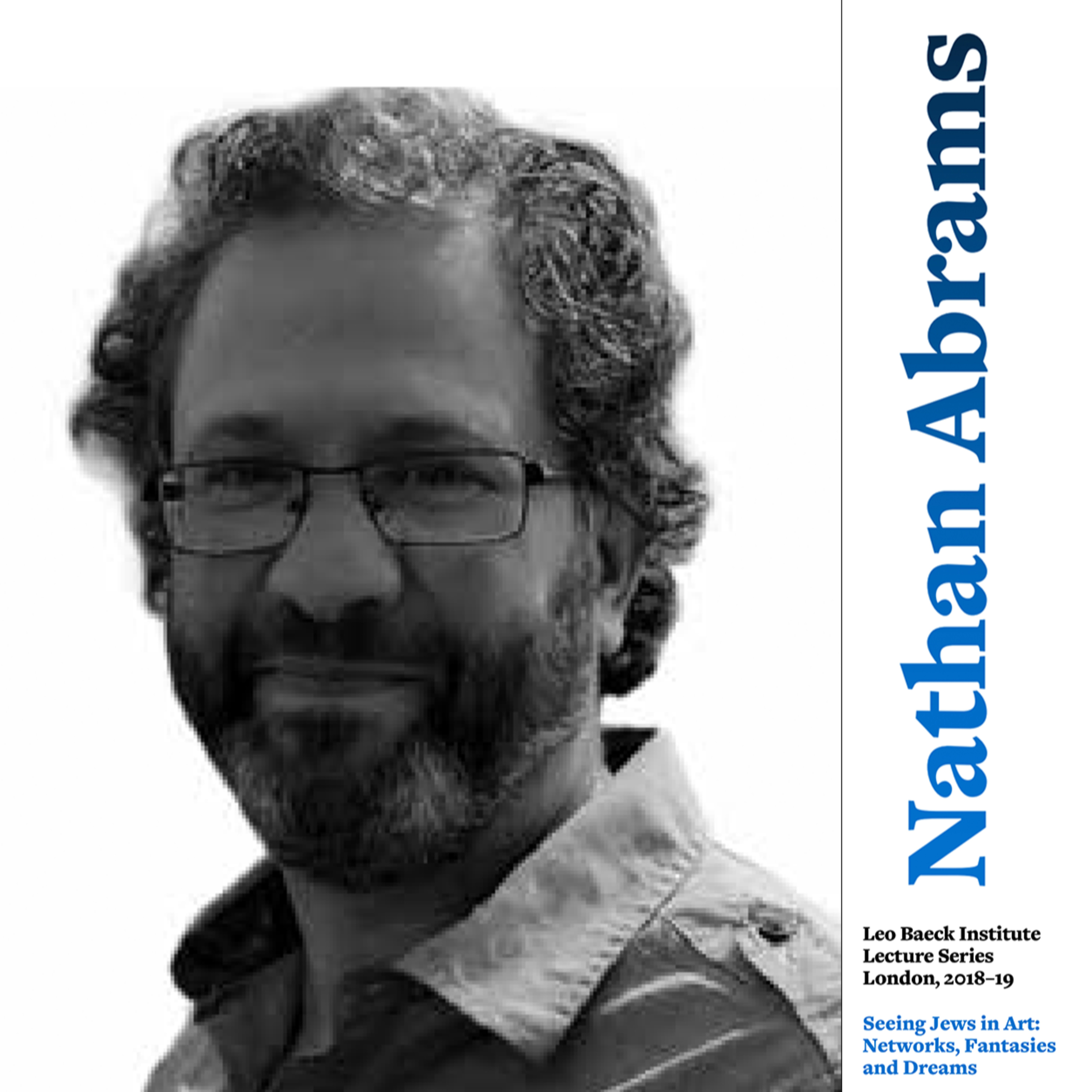 Leo Baeck Institute LondonTreyf Jews?: Jewish Gangsters in McMafia and Peaky BlindersProf Nathan Abrams
(Bangor University, UK)
6.30pm, 4 April 2019
In this illustrated lecture, professor Nathan Abrams will explore recent British representations of Jews on television focussing on the role of the Jewish gangster in McMafia and Peaky Blinders in particular.
Nathan Abrams is Professor in Film at Bangor University of Wales where he directs the Film Studies programme and the Centre for Film, Television and Screen Studies. He is the author of Stanley Kubrick: New York Jewish Intellectual (2018) and Eyes Wide Shut: Stanley Kubrick and the Making of His Final Film (2019) and co-fo...2019-04-041h 24
Leo Baeck Institute LondonTreyf Jews?: Jewish Gangsters in McMafia and Peaky BlindersProf Nathan Abrams
(Bangor University, UK)
6.30pm, 4 April 2019
In this illustrated lecture, professor Nathan Abrams will explore recent British representations of Jews on television focussing on the role of the Jewish gangster in McMafia and Peaky Blinders in particular.
Nathan Abrams is Professor in Film at Bangor University of Wales where he directs the Film Studies programme and the Centre for Film, Television and Screen Studies. He is the author of Stanley Kubrick: New York Jewish Intellectual (2018) and Eyes Wide Shut: Stanley Kubrick and the Making of His Final Film (2019) and co-fo...2019-04-041h 24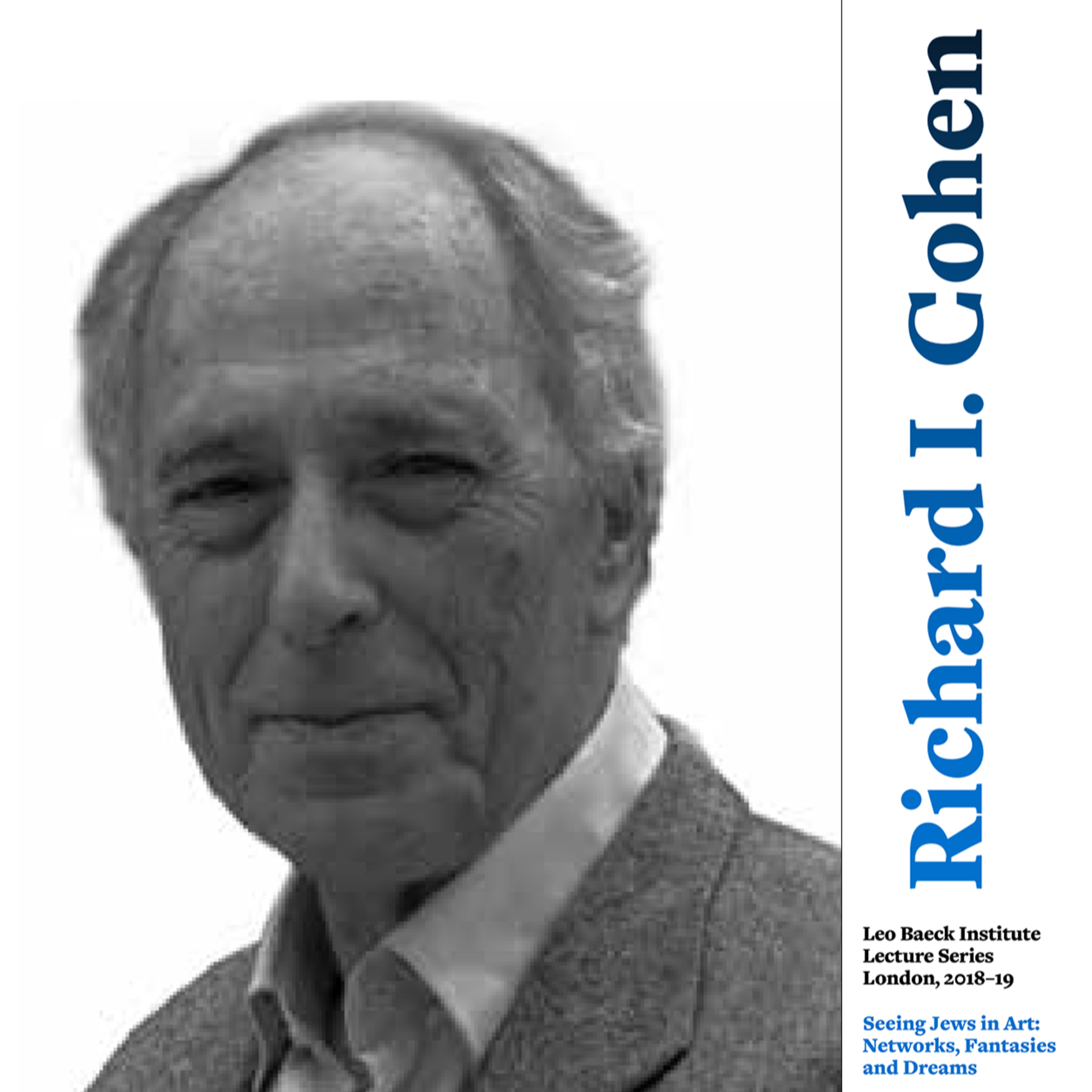 Leo Baeck Institute LondonMoses Mendelssohn – The German-Jewish Icon of Modernity (1780s-2019)Prof Richard I. Cohen
(Hebrew University of Jerusalem, Israel)
6.30pm, 14 February 2019
Moses Mendelssohn has engaged artists of Jewish and non-Jewish origin from his lifetime until today. The lecture will show how, over this long period, Mendelssohn has been turned into the icon of German-Jewish modernity by being represented in a myriad of ways and techniques.
Richard I. Cohen is the academic director of the Israel Center of Research Excellence (ICore) for the Study of Cultures of Place in the Modern Jewish World. Formerly the Paulette and Claude Kelman Chair in French J...2019-02-141h 24
Leo Baeck Institute LondonMoses Mendelssohn – The German-Jewish Icon of Modernity (1780s-2019)Prof Richard I. Cohen
(Hebrew University of Jerusalem, Israel)
6.30pm, 14 February 2019
Moses Mendelssohn has engaged artists of Jewish and non-Jewish origin from his lifetime until today. The lecture will show how, over this long period, Mendelssohn has been turned into the icon of German-Jewish modernity by being represented in a myriad of ways and techniques.
Richard I. Cohen is the academic director of the Israel Center of Research Excellence (ICore) for the Study of Cultures of Place in the Modern Jewish World. Formerly the Paulette and Claude Kelman Chair in French J...2019-02-141h 24 Leo Baeck Institute LondonJewish Museums between Self-Assertion and Self-DefenceCilly Kugelmann
(Jewish Museum Berlin, Germany)
6.30pm, 24 January 2019
In the 19th century Jews gradually began to free themselves from their ambivalence towards the fine arts. rabbis repeatedly placed the depiction of people in pictures and sculptures close to idolatry and viewed it with reservations. The discovery of a visual culture in Judaism by the Haskala, the Jewish Enlightenment, fulfilled a double function: it was intended to strengthen a new Jewish self-confidence internally and at the same time to ward off the anti-Semitic prejudice that Jews were incapable of artistic expression. This process will...2019-01-241h 25
Leo Baeck Institute LondonJewish Museums between Self-Assertion and Self-DefenceCilly Kugelmann
(Jewish Museum Berlin, Germany)
6.30pm, 24 January 2019
In the 19th century Jews gradually began to free themselves from their ambivalence towards the fine arts. rabbis repeatedly placed the depiction of people in pictures and sculptures close to idolatry and viewed it with reservations. The discovery of a visual culture in Judaism by the Haskala, the Jewish Enlightenment, fulfilled a double function: it was intended to strengthen a new Jewish self-confidence internally and at the same time to ward off the anti-Semitic prejudice that Jews were incapable of artistic expression. This process will...2019-01-241h 25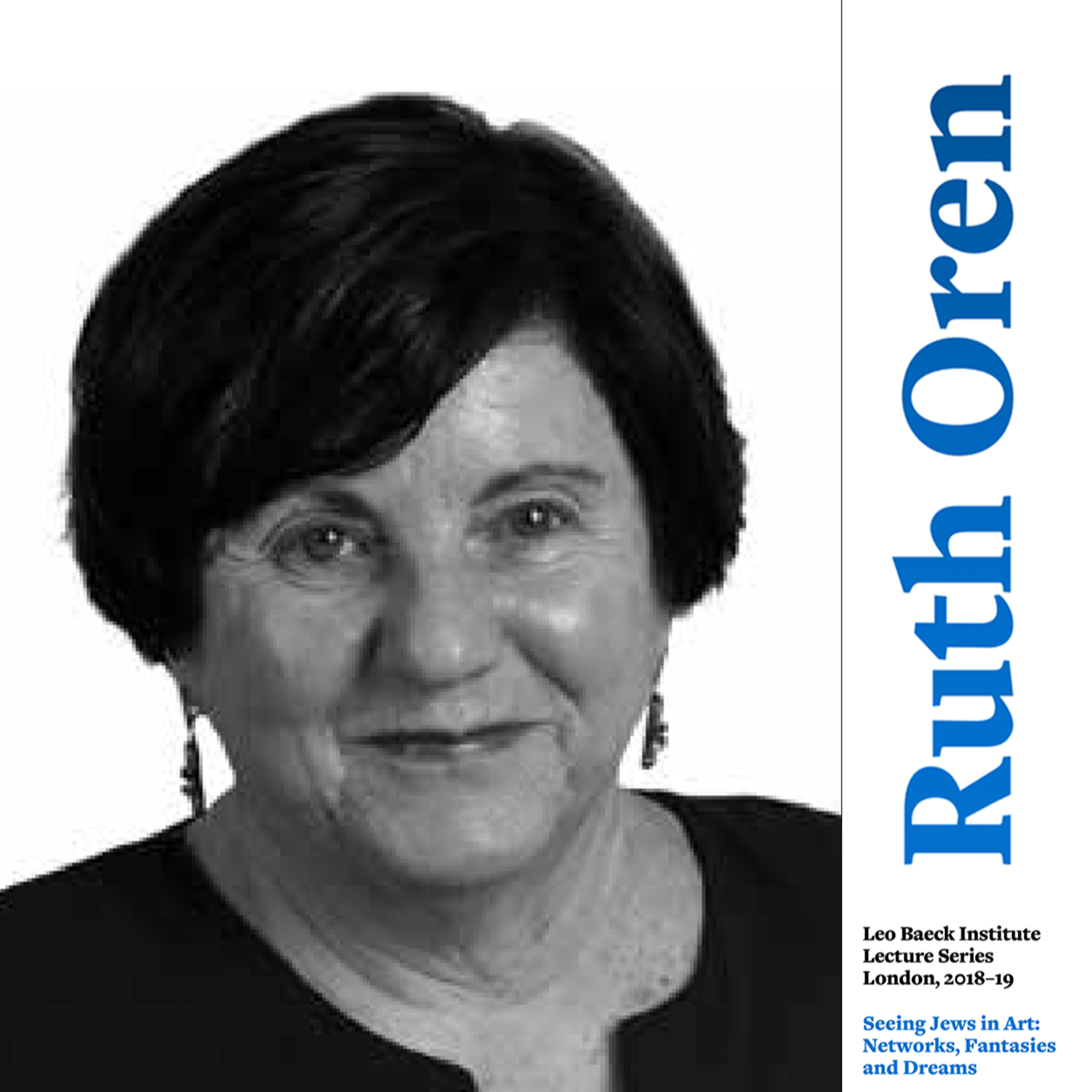 Leo Baeck Institute London‘Coming back to History’ –The Jewish Image in Landscape Photographs of ‘Eretz-Israel’, 1898-1961Dr Ruth Oren
(University of Haifa, Israel)
6.30pm, 6 December 2018
The visual presentation about Zionist landscape photography in Palestine (Eretz-Israel), from its beginning in 1898 until 1961, explores the 'returning' of the Jews to modern history and geography and the formation of the 'mental landscape' of Israel as it was created in the Zionist photographic narrative. Landscape photography, produced and consumed within the National Zionist Institutions, created a utopian image of the Jewish environment by developing a coherent iconography rooted in the hegemonic ideology of cultivating and 'building' a country for the Jewish nation.
2018-12-061h 23
Leo Baeck Institute London‘Coming back to History’ –The Jewish Image in Landscape Photographs of ‘Eretz-Israel’, 1898-1961Dr Ruth Oren
(University of Haifa, Israel)
6.30pm, 6 December 2018
The visual presentation about Zionist landscape photography in Palestine (Eretz-Israel), from its beginning in 1898 until 1961, explores the 'returning' of the Jews to modern history and geography and the formation of the 'mental landscape' of Israel as it was created in the Zionist photographic narrative. Landscape photography, produced and consumed within the National Zionist Institutions, created a utopian image of the Jewish environment by developing a coherent iconography rooted in the hegemonic ideology of cultivating and 'building' a country for the Jewish nation.
2018-12-061h 23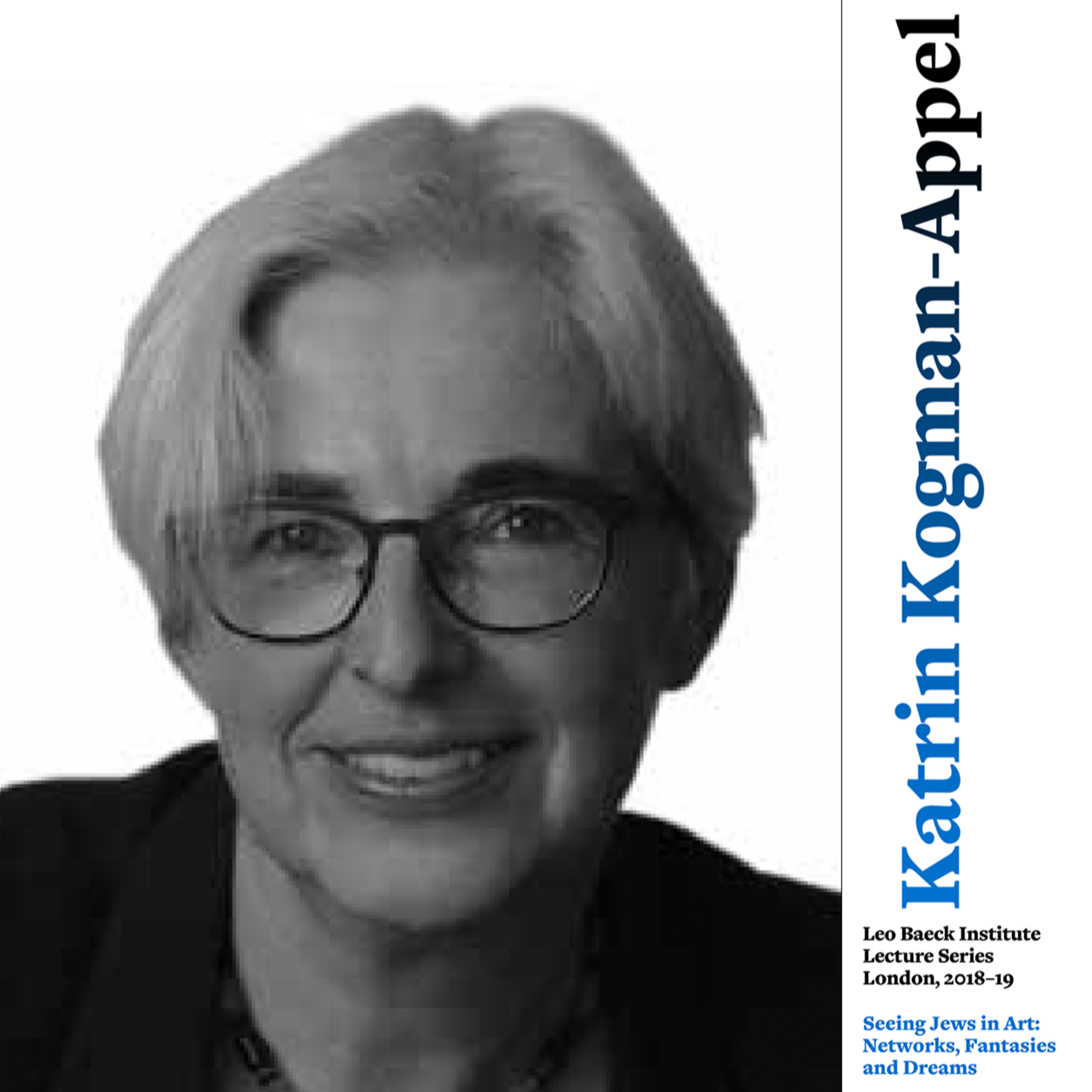 Leo Baeck Institute LondonA Jewish Look on World Politics: The Catalan Mappamundi (1375)Prof Katrin Kogman-Appel
(University of Münster, Germany)
6.30pm, 1 November 2018
The richly illustrated Catalan Mappamundi is among the most celebrated medieval maps surviving to this day. Commissioned by Peter IV of Aragon as a gift to Charles V of France it was put to parchment by Elisha Cresques, a Jewish scribe, illuminator, and cartographer in the City of Majorca. The talk explores how Elisha, from his delicate position as a Sefardi intellectual in the service of the Court coped with his patron’s agendas while, at the same time, voiced his own views of the p...2018-11-011h 15
Leo Baeck Institute LondonA Jewish Look on World Politics: The Catalan Mappamundi (1375)Prof Katrin Kogman-Appel
(University of Münster, Germany)
6.30pm, 1 November 2018
The richly illustrated Catalan Mappamundi is among the most celebrated medieval maps surviving to this day. Commissioned by Peter IV of Aragon as a gift to Charles V of France it was put to parchment by Elisha Cresques, a Jewish scribe, illuminator, and cartographer in the City of Majorca. The talk explores how Elisha, from his delicate position as a Sefardi intellectual in the service of the Court coped with his patron’s agendas while, at the same time, voiced his own views of the p...2018-11-011h 15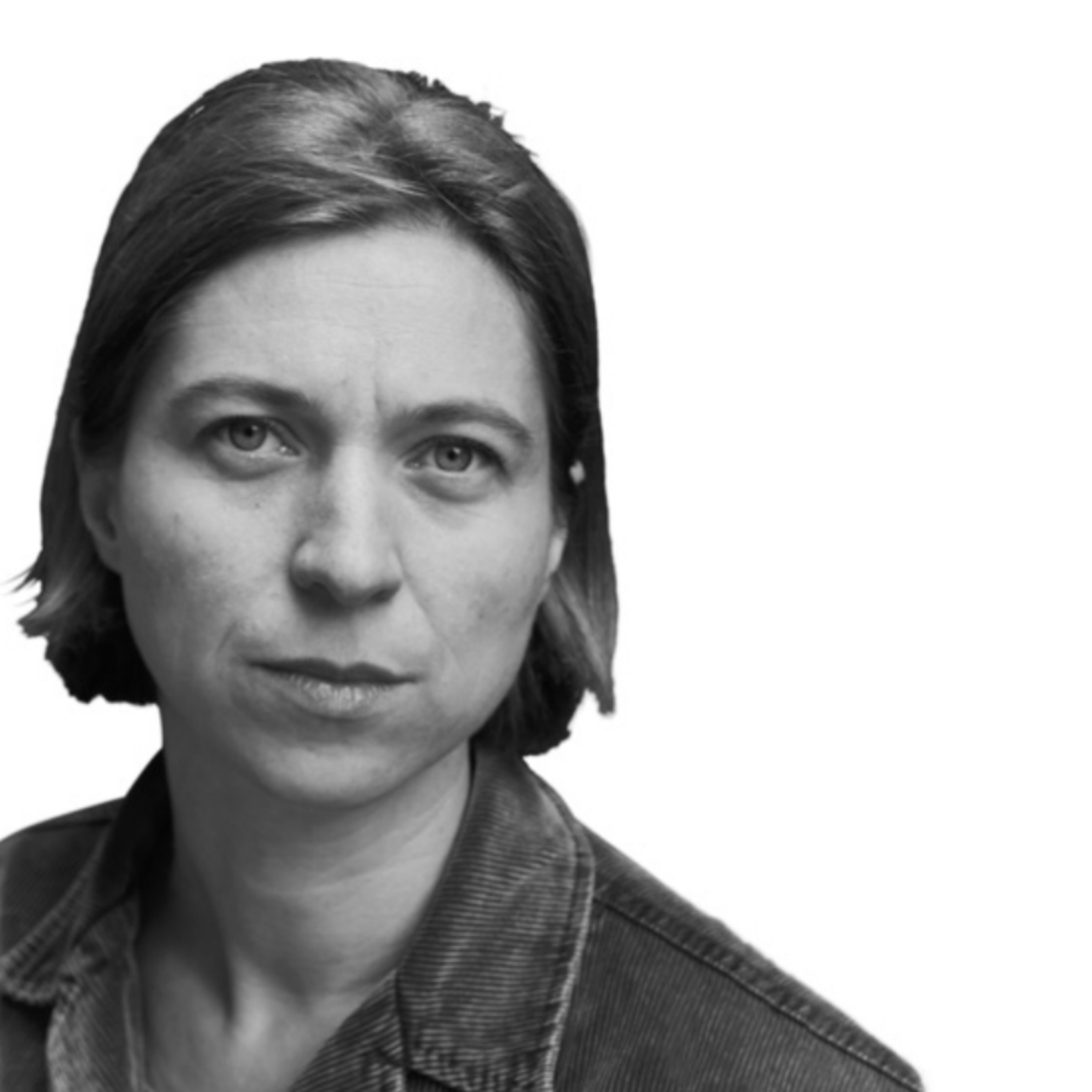 Leo Baeck Institute LondonIn conversation: Philippe Sands and Katrin HimmlerThursday, May 17, 2018 - 18:30
Prof. Philippe Sands, QC
(University College London, UK)
East West Street: A Personal History of Genocide and Crimes Against Humanity
In his short lecture and subsequent conversation with Katrin Himmler, Philippe Sands explores how personal lives and history are interwoven. Drawing from his prize-winning book East West Street – part historical detective story, part family history, part legal thriller – he connect his work on ‘crimes against humanity’ and ‘genocide’, the events that overwhelmed his family during the Second World War, and an untold story at the heart of the Nuremberg Tria...2018-05-171h 49
Leo Baeck Institute LondonIn conversation: Philippe Sands and Katrin HimmlerThursday, May 17, 2018 - 18:30
Prof. Philippe Sands, QC
(University College London, UK)
East West Street: A Personal History of Genocide and Crimes Against Humanity
In his short lecture and subsequent conversation with Katrin Himmler, Philippe Sands explores how personal lives and history are interwoven. Drawing from his prize-winning book East West Street – part historical detective story, part family history, part legal thriller – he connect his work on ‘crimes against humanity’ and ‘genocide’, the events that overwhelmed his family during the Second World War, and an untold story at the heart of the Nuremberg Tria...2018-05-171h 49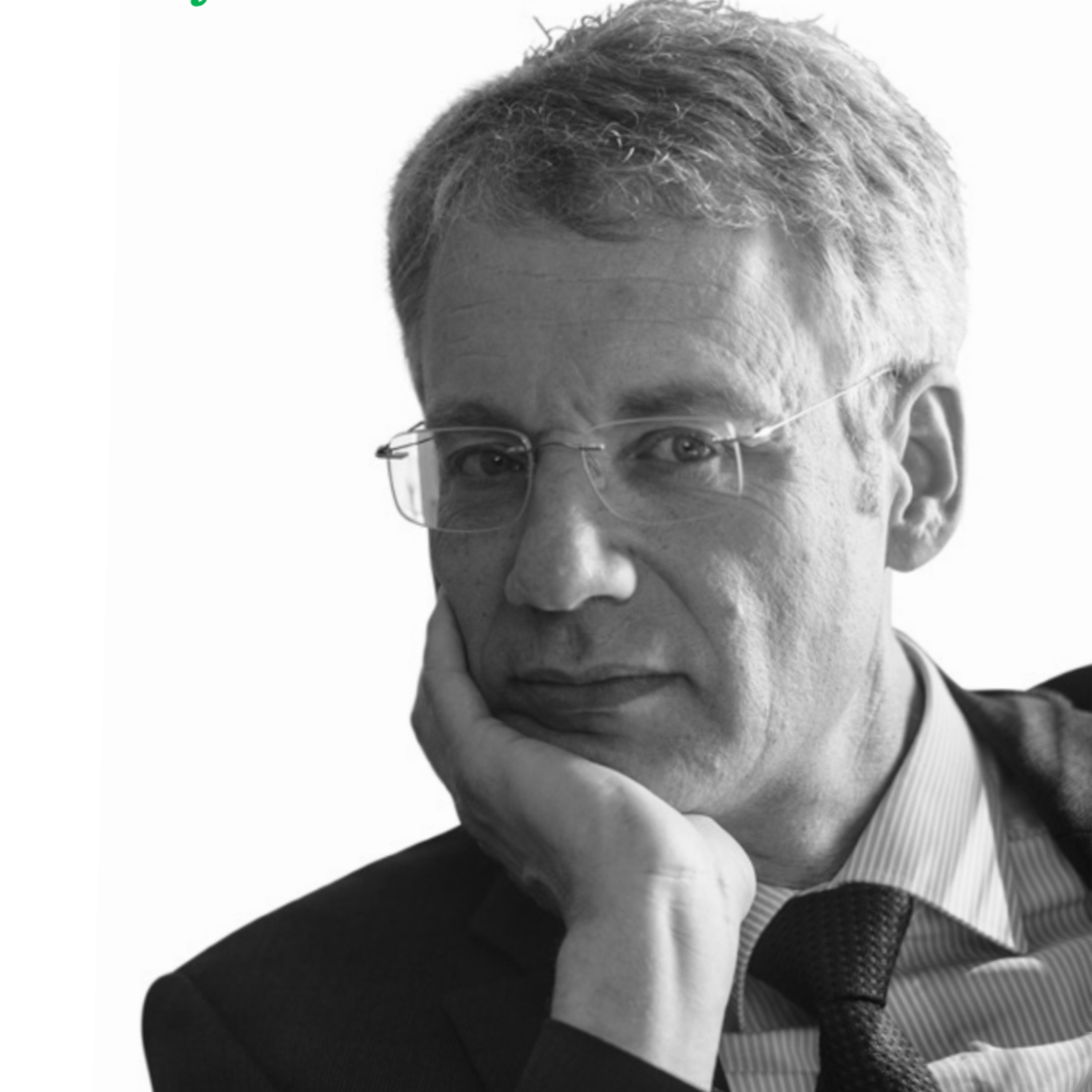 Leo Baeck Institute LondonLifting a Taboo: The Story of a Holocaust victim which has never been told beforeMartin Doerry
(Der Spiegel, Germany)
6.30pm, 12 April 2018
After the death of German politician Gerhard Jahn in 1998, his four sisters found hundreds of letters in his house, which they had written during the war to their Jewish mother Lilli, who had been detained in a labour camp and, finally, killed in Auschwitz in 1944. Fifty years of silence had followed but now, for the first time, the family was able to talk about Lilli once again. But should the letters be published? Lilli’s grandson Martin Doerry undertook the tasks of both convincing his family th...2018-04-121h 24
Leo Baeck Institute LondonLifting a Taboo: The Story of a Holocaust victim which has never been told beforeMartin Doerry
(Der Spiegel, Germany)
6.30pm, 12 April 2018
After the death of German politician Gerhard Jahn in 1998, his four sisters found hundreds of letters in his house, which they had written during the war to their Jewish mother Lilli, who had been detained in a labour camp and, finally, killed in Auschwitz in 1944. Fifty years of silence had followed but now, for the first time, the family was able to talk about Lilli once again. But should the letters be published? Lilli’s grandson Martin Doerry undertook the tasks of both convincing his family th...2018-04-121h 24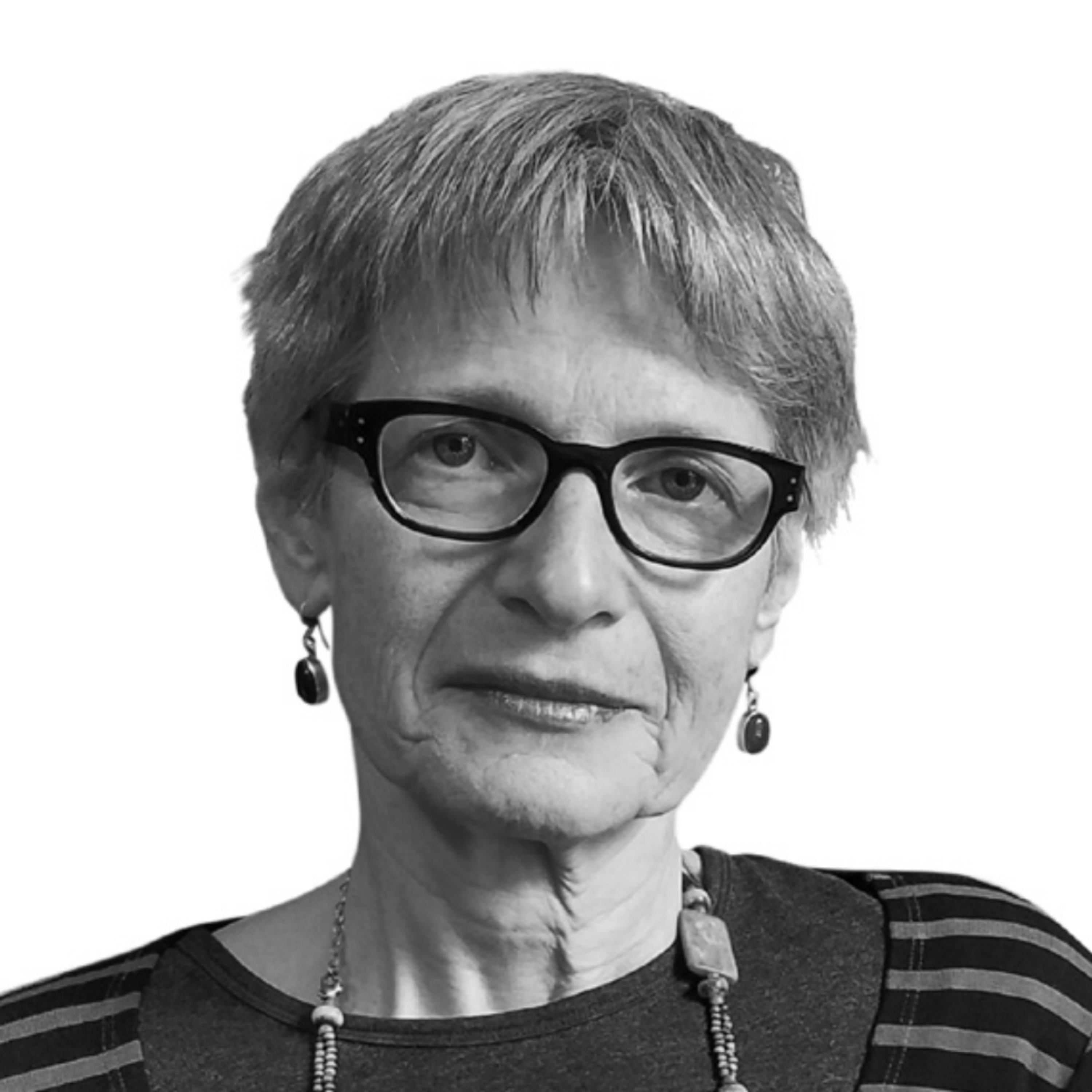 Leo Baeck Institute LondonTrauma, Privilege and Adventure in the “Orient”: A Refugee Family ArchiveProf Atina Grossmann
(The Cooper Union for the Advancement of Science and Art)
6.30pm, 8 March 2018
The talk examines, through the intimate – yet also distant – lens of family history, the ambivalent and paradoxical experiences, sensibilities, and emotions of bourgeois Berlin Jews who found refuge and romance in the ‘Orient’ of Iran and India after 1933. Drawing on an extensive collection of family correspondence and memorabilia from Iran and India (1935-1947), Grossmann probes her own parents’ understanding of their unstable position as well as the perils and pleasures of writing a ‘hybrid’ border-crossing family story folded into a larger...2018-03-081h 51
Leo Baeck Institute LondonTrauma, Privilege and Adventure in the “Orient”: A Refugee Family ArchiveProf Atina Grossmann
(The Cooper Union for the Advancement of Science and Art)
6.30pm, 8 March 2018
The talk examines, through the intimate – yet also distant – lens of family history, the ambivalent and paradoxical experiences, sensibilities, and emotions of bourgeois Berlin Jews who found refuge and romance in the ‘Orient’ of Iran and India after 1933. Drawing on an extensive collection of family correspondence and memorabilia from Iran and India (1935-1947), Grossmann probes her own parents’ understanding of their unstable position as well as the perils and pleasures of writing a ‘hybrid’ border-crossing family story folded into a larger...2018-03-081h 51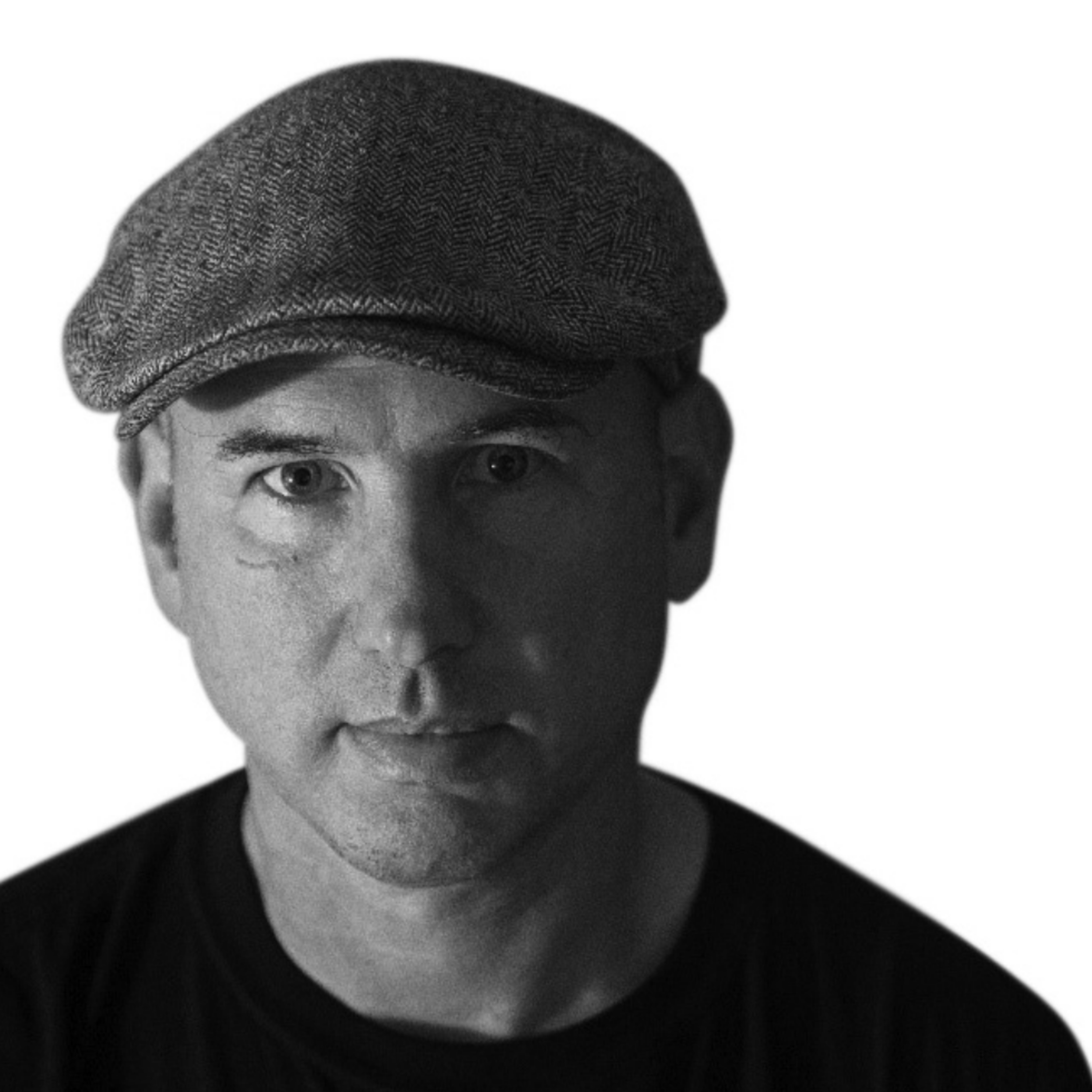 Leo Baeck Institute LondonYou’re doing what?” - My family’s response to my trying to save the house stolen by the NazisThomas Harding
6.30pm, 1 March 2018
In 2013, Thomas Harding visited his Jewish family’s old weekend house outside of Berlin. He found it shrouded in a jungle of bushes and trees, its windows broken, graffiti painted across its walls and that it was destined for demolition. When he told his family that he wanted to work with the locals to save the house they reacted with intense emotion, triggering a debate about memories, the value of history and the possibility of reconciliation.
Thomas Harding is an international bestselling author and journalist who has written for the Fi...2018-03-011h 26
Leo Baeck Institute LondonYou’re doing what?” - My family’s response to my trying to save the house stolen by the NazisThomas Harding
6.30pm, 1 March 2018
In 2013, Thomas Harding visited his Jewish family’s old weekend house outside of Berlin. He found it shrouded in a jungle of bushes and trees, its windows broken, graffiti painted across its walls and that it was destined for demolition. When he told his family that he wanted to work with the locals to save the house they reacted with intense emotion, triggering a debate about memories, the value of history and the possibility of reconciliation.
Thomas Harding is an international bestselling author and journalist who has written for the Fi...2018-03-011h 26 Leo Baeck Institute LondonLosing the Dead – Before and AfterProf Lisa Appignanesi (King's College, London)
Losing the Dead – Before and After
6.30pm, 7th December 2017
Lisa Appignanesi teases out some of the hurdles she encountered researching her critically acclaimed family memoir, Losing the Dead. These extended post publication: memoir writing elicits the kinds of responses historical texts rarely do.
Please note: A short 15 minute film called: Ex Memoria, directed by Josh Appignanesi and starring Sarah Kestleman, will also be shown.
Lisa Appignanesi OBE is a writer and novelist. She is a Visiting Professor at King’s College...2017-12-071h 21
Leo Baeck Institute LondonLosing the Dead – Before and AfterProf Lisa Appignanesi (King's College, London)
Losing the Dead – Before and After
6.30pm, 7th December 2017
Lisa Appignanesi teases out some of the hurdles she encountered researching her critically acclaimed family memoir, Losing the Dead. These extended post publication: memoir writing elicits the kinds of responses historical texts rarely do.
Please note: A short 15 minute film called: Ex Memoria, directed by Josh Appignanesi and starring Sarah Kestleman, will also be shown.
Lisa Appignanesi OBE is a writer and novelist. She is a Visiting Professor at King’s College...2017-12-071h 21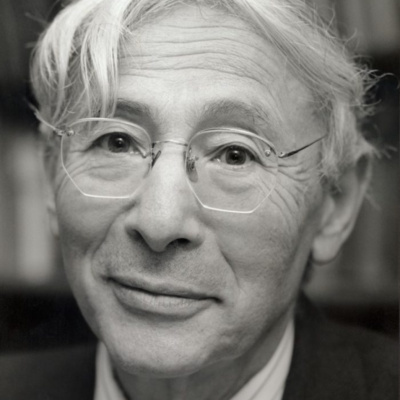 Leo Baeck Institute LondonArno Paucker - Scholar and FriendA memorial event in honour of the Leo Baeck Institute’s esteemed, longstanding former director Dr Arnold Paucker OBE
Opening Words by
Pauline Paucker
Lecture by
Peter Pulzer (Oxford):
‘Arno Paucker, A Scholar Who Reached Out’
Panel: ‘Arno Paucker and German-Jewish History’
Peter Alter (Cologne)
Simone Erpel (Berlin)
Raphael Gross (Leipzig)
Chair: Daniel Wildmann(London)
The event was organized jointly by the Leo Baeck Institute London and the German Historical Institute London and took place at the German His...2017-03-301h 43
Leo Baeck Institute LondonArno Paucker - Scholar and FriendA memorial event in honour of the Leo Baeck Institute’s esteemed, longstanding former director Dr Arnold Paucker OBE
Opening Words by
Pauline Paucker
Lecture by
Peter Pulzer (Oxford):
‘Arno Paucker, A Scholar Who Reached Out’
Panel: ‘Arno Paucker and German-Jewish History’
Peter Alter (Cologne)
Simone Erpel (Berlin)
Raphael Gross (Leipzig)
Chair: Daniel Wildmann(London)
The event was organized jointly by the Leo Baeck Institute London and the German Historical Institute London and took place at the German His...2017-03-301h 43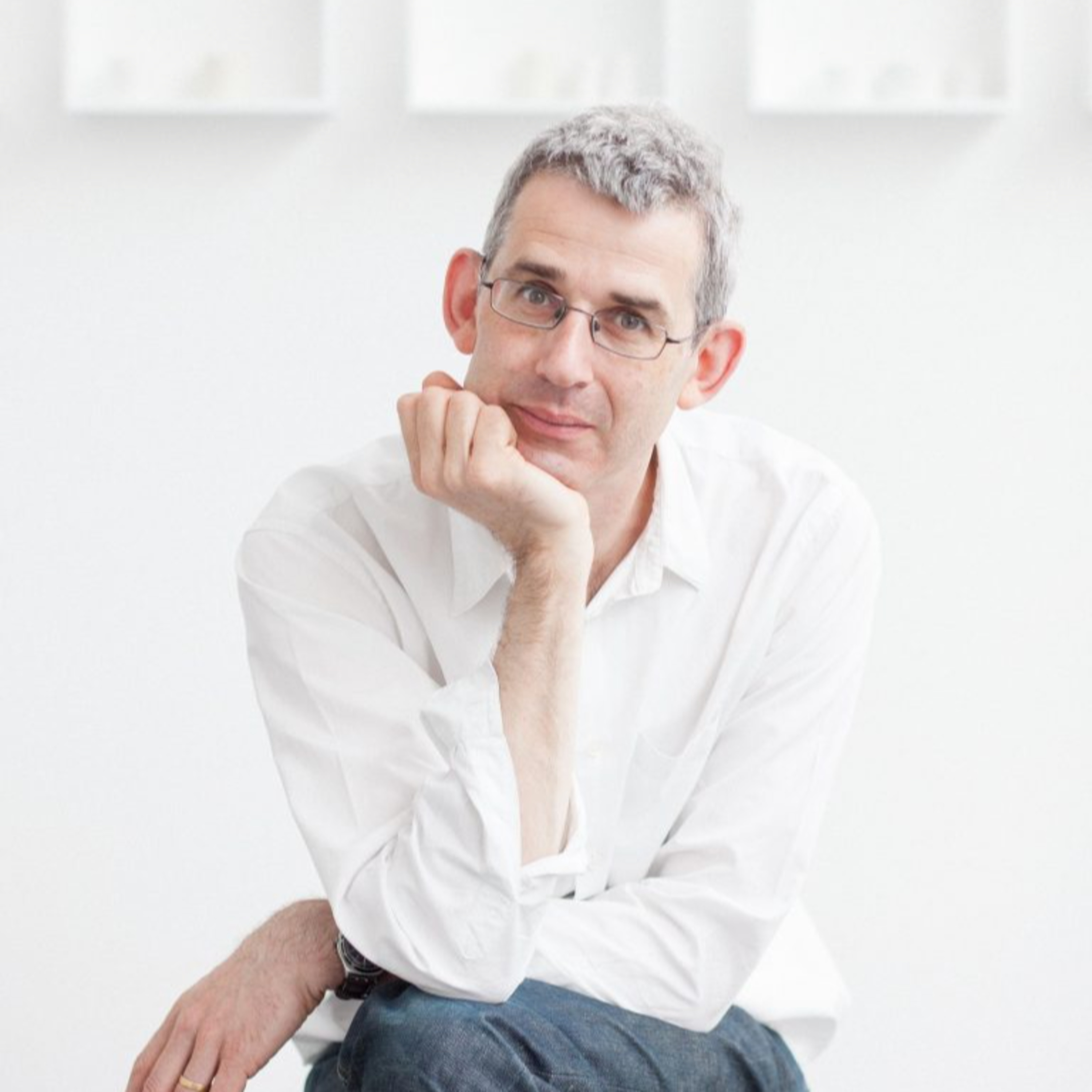 Leo Baeck Institute LondonThe 3rd Leo Baeck Institute Biennial LectureEdmund de Waal
Artist and author of The Hare with Amber Eyes
On the Eve of Departure: Art and Exile
During the talk Edmund de Waal discussed the telling of family stories through words and sculpture, touching on his writing of The Hare with Amber Eyes and works by Paul Celan and Walter Benjamin.
Organised by the Leo Baeck Institute London in collaboration with Queen Mary University of London, School of History. The lecture took place at Queen Mary University of London, Arts Two Lecture Theatre, Mile End Road, E1 4NS...2017-03-231h 14
Leo Baeck Institute LondonThe 3rd Leo Baeck Institute Biennial LectureEdmund de Waal
Artist and author of The Hare with Amber Eyes
On the Eve of Departure: Art and Exile
During the talk Edmund de Waal discussed the telling of family stories through words and sculpture, touching on his writing of The Hare with Amber Eyes and works by Paul Celan and Walter Benjamin.
Organised by the Leo Baeck Institute London in collaboration with Queen Mary University of London, School of History. The lecture took place at Queen Mary University of London, Arts Two Lecture Theatre, Mile End Road, E1 4NS...2017-03-231h 14 Leo Baeck Institute LondonCosmopolitanism – Jewish and Postcolonial PerspectivesPanel Discussion
Leo Baeck Institute London in partnership with the Pears Institute for the study of antisemitism
‘If you believe you are a citizen of the world, you are a citizen of nowhere.’ Prime Minister Theresa May, November 2016
In the aftermath of the vote for Brexit in 2016, Prime Minister Theresa May controversially broached a key issue of our times: how do we identify ourselves, and must our sense of belonging be defined by national borders? These questions are closely connected to the term cosmopolitanism, which has long been the subject of scholarly debate. Cosm...2017-03-161h 35
Leo Baeck Institute LondonCosmopolitanism – Jewish and Postcolonial PerspectivesPanel Discussion
Leo Baeck Institute London in partnership with the Pears Institute for the study of antisemitism
‘If you believe you are a citizen of the world, you are a citizen of nowhere.’ Prime Minister Theresa May, November 2016
In the aftermath of the vote for Brexit in 2016, Prime Minister Theresa May controversially broached a key issue of our times: how do we identify ourselves, and must our sense of belonging be defined by national borders? These questions are closely connected to the term cosmopolitanism, which has long been the subject of scholarly debate. Cosm...2017-03-161h 35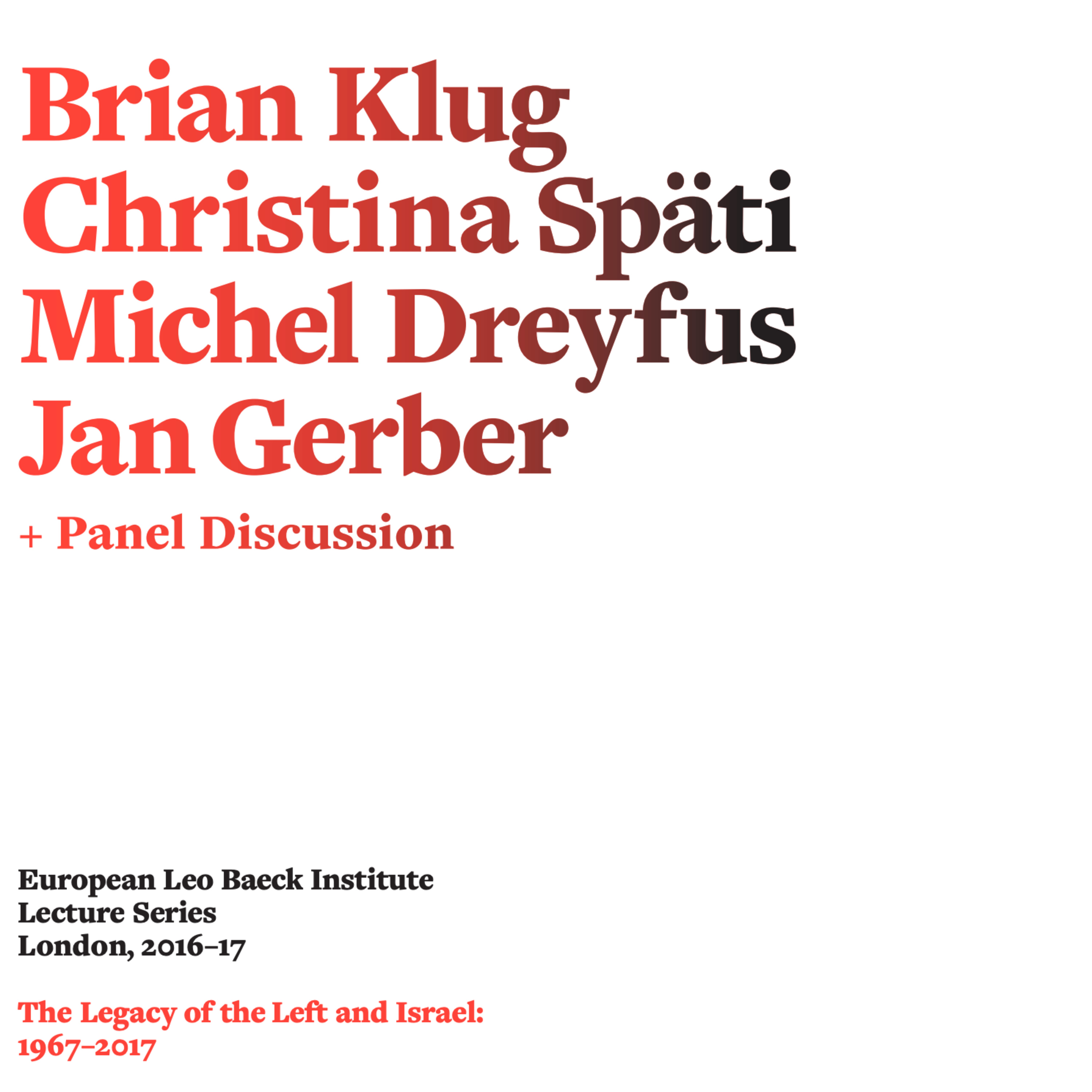 Leo Baeck Institute LondonPanel discussion: The Legacy of the Left and Israel: 1967-2017Panel discussion as a part of the Leo Baeck Institute Lecture Series: The panel discuss the complicated and multi-layered relationship of the European left with Zionism and the State of Israel, examining this broad subject from a historical perspective and shedding light on the different debates on various European countries.
Panelists
Nick Cohen The Observer and The Spectator
Prof David Feldmann Birckbeck University of London
Prof Christina Späti University of Fribourg, Switzerland
Dr Peter Ullrich Technische Universität Berlin, Germany
Chair: Dr Daniel Wildmann, Le...2017-03-161h 57
Leo Baeck Institute LondonPanel discussion: The Legacy of the Left and Israel: 1967-2017Panel discussion as a part of the Leo Baeck Institute Lecture Series: The panel discuss the complicated and multi-layered relationship of the European left with Zionism and the State of Israel, examining this broad subject from a historical perspective and shedding light on the different debates on various European countries.
Panelists
Nick Cohen The Observer and The Spectator
Prof David Feldmann Birckbeck University of London
Prof Christina Späti University of Fribourg, Switzerland
Dr Peter Ullrich Technische Universität Berlin, Germany
Chair: Dr Daniel Wildmann, Le...2017-03-161h 57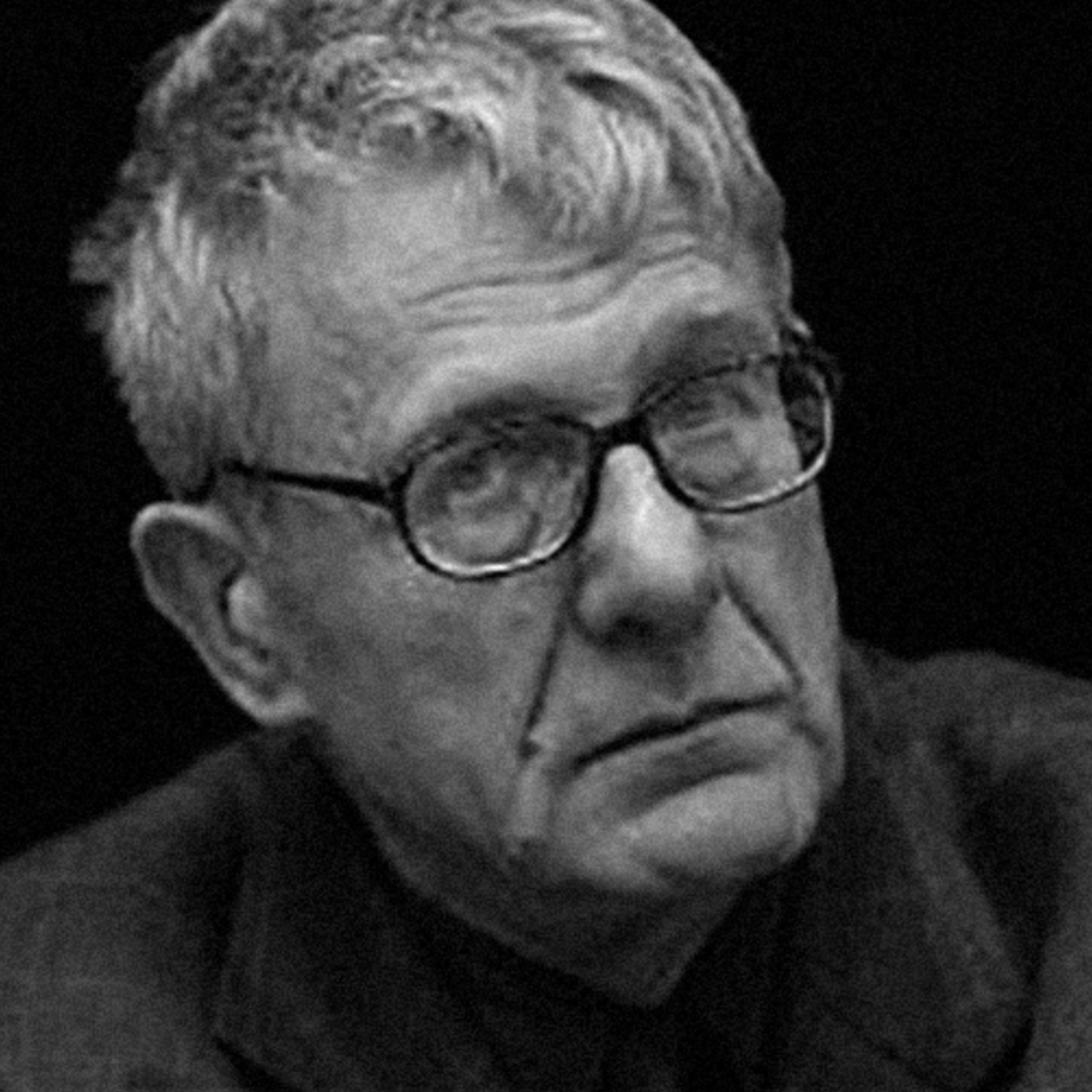 Leo Baeck Institute LondonTwo Lefts in France: Divisions over Zionism and IsraelDr Michel Dreyfus (University of Paris)
6.30pm, 26th January 2017
The Balfour Declaration (1917) boosted Zionism in France. Although the movement enjoyed the support of the Socialists in the inter-war period, it was denounced by the Communist Party (CP) and the ultra-left. The creation of the State of Israel marked the beginning of a new era. While support for Israel grew strongly among French socialists from 1954 due to their opposition to Nasser’s politics in Algeria, the CP took a more critical stance. Post 1967 changes in the French-Israeli relationship left the left sharply divided: While the Socialists continu...2017-01-261h 43
Leo Baeck Institute LondonTwo Lefts in France: Divisions over Zionism and IsraelDr Michel Dreyfus (University of Paris)
6.30pm, 26th January 2017
The Balfour Declaration (1917) boosted Zionism in France. Although the movement enjoyed the support of the Socialists in the inter-war period, it was denounced by the Communist Party (CP) and the ultra-left. The creation of the State of Israel marked the beginning of a new era. While support for Israel grew strongly among French socialists from 1954 due to their opposition to Nasser’s politics in Algeria, the CP took a more critical stance. Post 1967 changes in the French-Israeli relationship left the left sharply divided: While the Socialists continu...2017-01-261h 43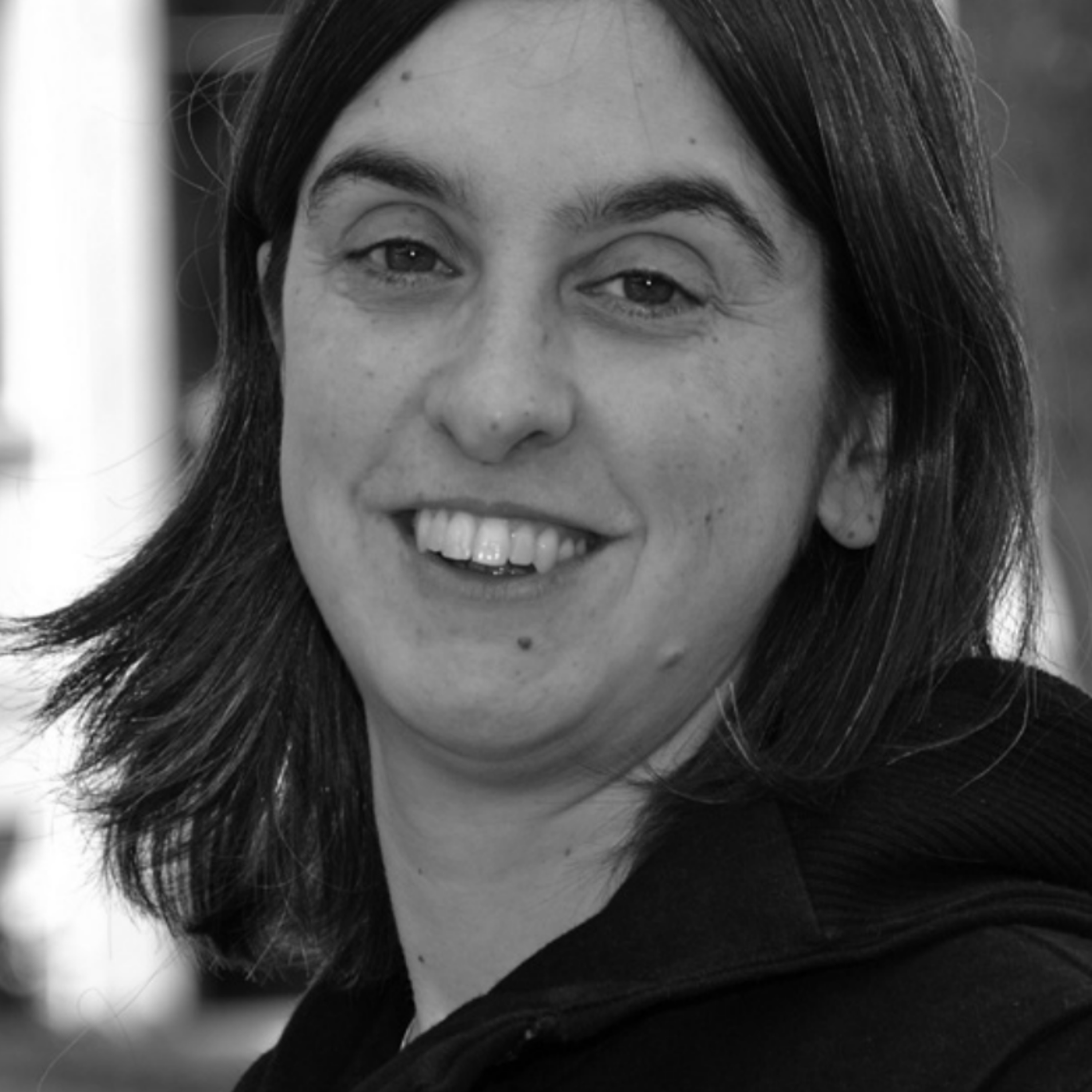 Leo Baeck Institute LondonThe German-speaking Left and Israel: Legacies and Developments since 1948Prof Christina Späti (University of Fribourg, Switzerland) 6.30pm, 8 December 2016
The positions and attitudes of the political left in Germany, Austria and Switzerland towards Israel have undergone many changes since 1948. If the 1950s and 1960s were characterized by a romanticizing, pro-Zionist alignment with Israel, mainly expressed by Social-democratic parties and trade unions, the rise of the New Left after 1968 considerably changed the perspectives on the Middle East conflict and eventually had an impact on wider sections of the political left. The lecture also looked into the various legacies, ranging from Holocaust to Internationalism, which influenced this development.
Chr...2016-12-081h 35
Leo Baeck Institute LondonThe German-speaking Left and Israel: Legacies and Developments since 1948Prof Christina Späti (University of Fribourg, Switzerland) 6.30pm, 8 December 2016
The positions and attitudes of the political left in Germany, Austria and Switzerland towards Israel have undergone many changes since 1948. If the 1950s and 1960s were characterized by a romanticizing, pro-Zionist alignment with Israel, mainly expressed by Social-democratic parties and trade unions, the rise of the New Left after 1968 considerably changed the perspectives on the Middle East conflict and eventually had an impact on wider sections of the political left. The lecture also looked into the various legacies, ranging from Holocaust to Internationalism, which influenced this development.
Chr...2016-12-081h 35 Leo Baeck Institute LondonMein Kampf Today: Ideology, Memory and the Question of Censorship – Panel DiscussionThursday, December 1, 2016 - 18:45
Panellists are Prof Neil Gregor, David Aaronovitch, and Prof Maiken Umbach, and the panel will be chaired by Dr Daniel Wildmann and Prof David Feldman.
In Germany, until this year, it was illegal to print copies of Adolf Hitler's Mein Kampf. The State of Bavaria held the copyright and banned publication of the book. In January 2016 the copyright expired and the Institute for Contemporary History in Munich published a scholarly edition which runs to two enormous volumes, complete with a lengthy introduction and copious annotation. The first print run was sold out before...2016-12-011h 41
Leo Baeck Institute LondonMein Kampf Today: Ideology, Memory and the Question of Censorship – Panel DiscussionThursday, December 1, 2016 - 18:45
Panellists are Prof Neil Gregor, David Aaronovitch, and Prof Maiken Umbach, and the panel will be chaired by Dr Daniel Wildmann and Prof David Feldman.
In Germany, until this year, it was illegal to print copies of Adolf Hitler's Mein Kampf. The State of Bavaria held the copyright and banned publication of the book. In January 2016 the copyright expired and the Institute for Contemporary History in Munich published a scholarly edition which runs to two enormous volumes, complete with a lengthy introduction and copious annotation. The first print run was sold out before...2016-12-011h 41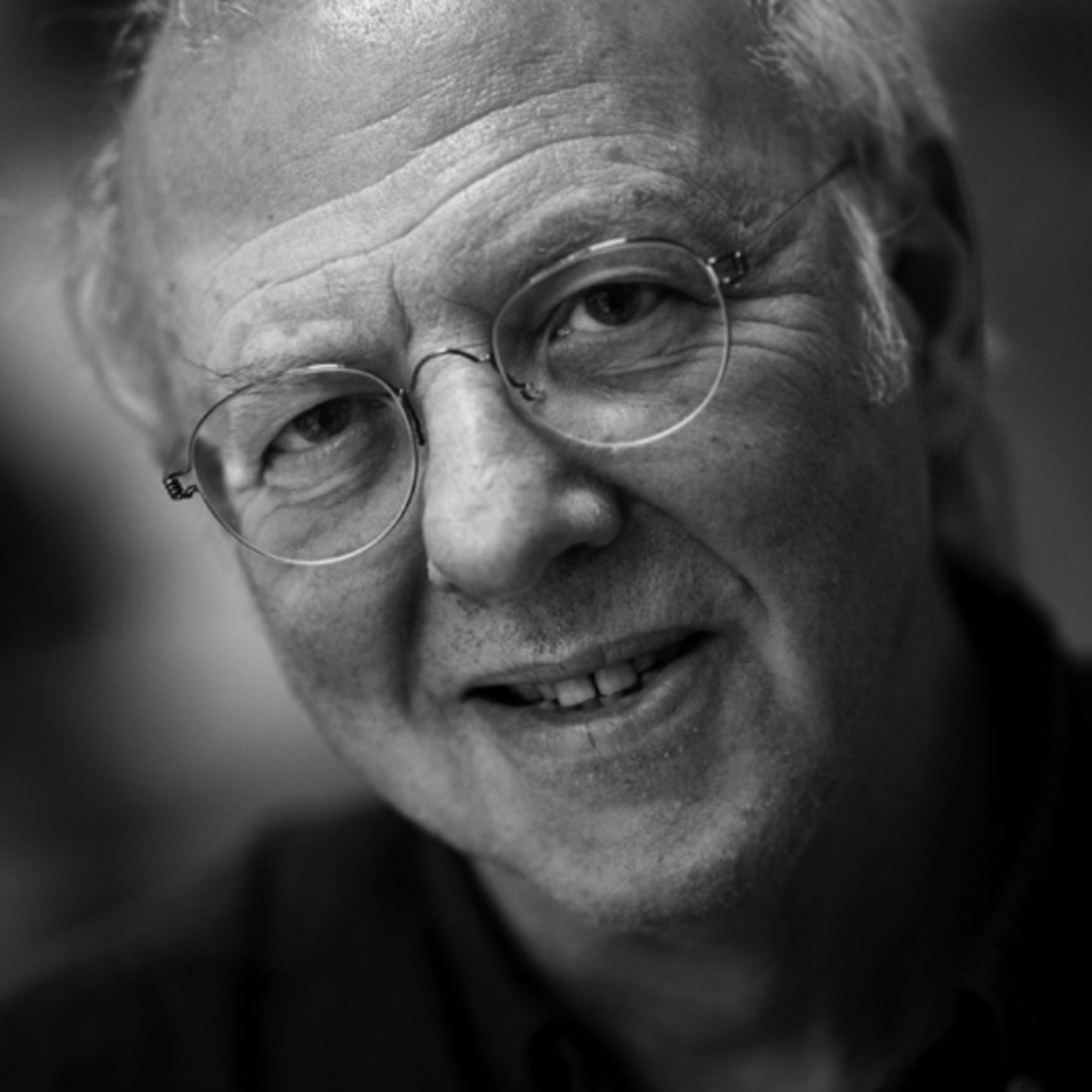 Leo Baeck Institute LondonDenouncing Israel: Anti-colonialism or Antisemitism on the British Left?Dr Brian Klug (University of Oxford, UK)
6.30pm, 24 November 2016
A significant part of the British left, especially since the June 1967 war, tends to denounce Israel as a state and Zionism as an idea. Ostensibly, these attitudes are grounded in the anti-colonialism and anti-racism which have been staple causes for the British left since the sun began to set on the Empire. These grounds, however, are called into question by those who detect the hidden hand of antisemitism at work. The lecture will examine key concepts and arguments in this controversy, seeking to bring the issues i...2016-11-241h 47
Leo Baeck Institute LondonDenouncing Israel: Anti-colonialism or Antisemitism on the British Left?Dr Brian Klug (University of Oxford, UK)
6.30pm, 24 November 2016
A significant part of the British left, especially since the June 1967 war, tends to denounce Israel as a state and Zionism as an idea. Ostensibly, these attitudes are grounded in the anti-colonialism and anti-racism which have been staple causes for the British left since the sun began to set on the Empire. These grounds, however, are called into question by those who detect the hidden hand of antisemitism at work. The lecture will examine key concepts and arguments in this controversy, seeking to bring the issues i...2016-11-241h 47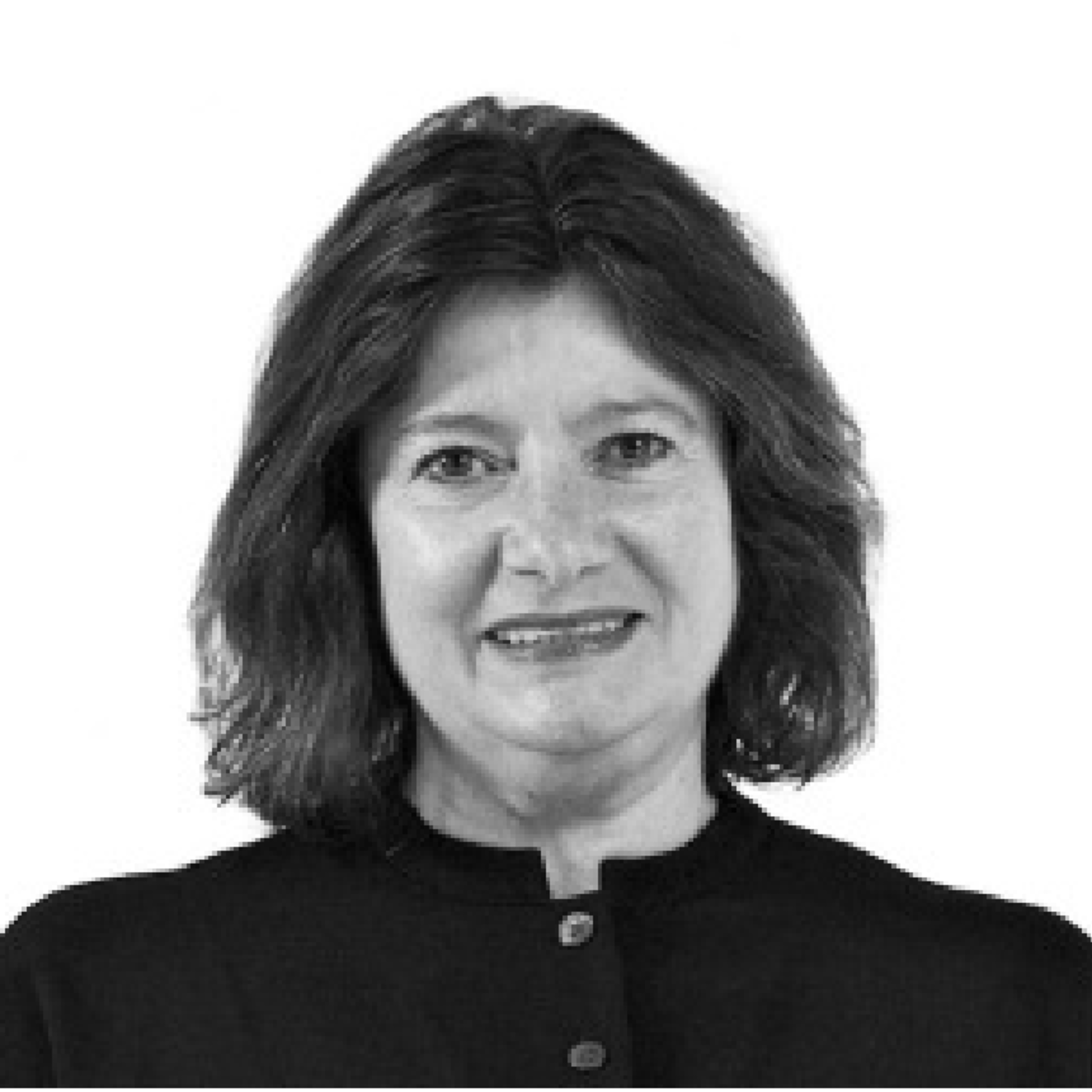 Leo Baeck Institute LondonIn the Shadow of the Wall: Icon and Identity in Jerusalem’s Separation BarrierThursday, April 14, 2016 - 18:30
Dr Wendy PullanUniversity of Cambridge
German Historical Institute
In Jerusalem, the separation barrier has galvanized public opinion, both in its role as a hard barrier inside a divided city and as the visible ‘tip of the iceberg’ that reflects only a fraction of the political and military regime supporting the occupation. This lecture will acknowledge the wall’s political status but focus on issues to do with the iconicity of such a structure, including its power in situ in the human landscape, in the media and in its...2016-04-141h 48
Leo Baeck Institute LondonIn the Shadow of the Wall: Icon and Identity in Jerusalem’s Separation BarrierThursday, April 14, 2016 - 18:30
Dr Wendy PullanUniversity of Cambridge
German Historical Institute
In Jerusalem, the separation barrier has galvanized public opinion, both in its role as a hard barrier inside a divided city and as the visible ‘tip of the iceberg’ that reflects only a fraction of the political and military regime supporting the occupation. This lecture will acknowledge the wall’s political status but focus on issues to do with the iconicity of such a structure, including its power in situ in the human landscape, in the media and in its...2016-04-141h 48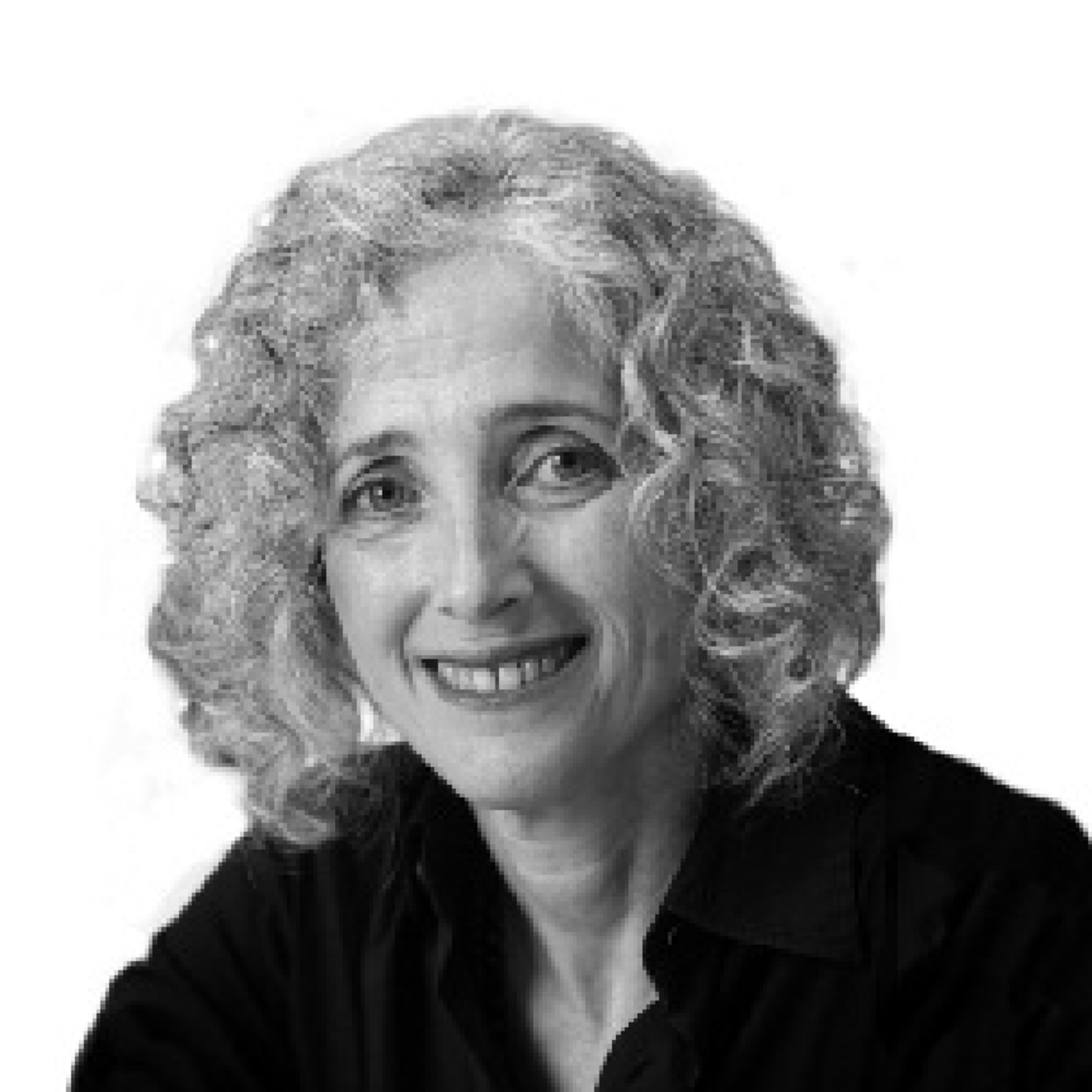 Leo Baeck Institute LondonPolitical Sovereignty and Cultural Property: The Mount Scopus Enclave in JerusalemProf Yfaat WeissThe Hebrew University of Jerusalem, Israel
German Historical Institute
6.30pm, 11th February 2016
The UN Partition Plan for Palestine known as UN Resolution 181 envisioned Jerusalem as a Corpus Separatum, an international city open and accessible to believers of the three monotheistic religions. This did not materialize. While the city was divided as a result of the 1948 War, Mount Scopus in its northern part acquired an exceptional status. Until 1967 it existed as an enclave amid Jordanian territory, divided into a Jordanian and an Israeli part under UN control. This lecture will...2016-02-111h 30
Leo Baeck Institute LondonPolitical Sovereignty and Cultural Property: The Mount Scopus Enclave in JerusalemProf Yfaat WeissThe Hebrew University of Jerusalem, Israel
German Historical Institute
6.30pm, 11th February 2016
The UN Partition Plan for Palestine known as UN Resolution 181 envisioned Jerusalem as a Corpus Separatum, an international city open and accessible to believers of the three monotheistic religions. This did not materialize. While the city was divided as a result of the 1948 War, Mount Scopus in its northern part acquired an exceptional status. Until 1967 it existed as an enclave amid Jordanian territory, divided into a Jordanian and an Israeli part under UN control. This lecture will...2016-02-111h 30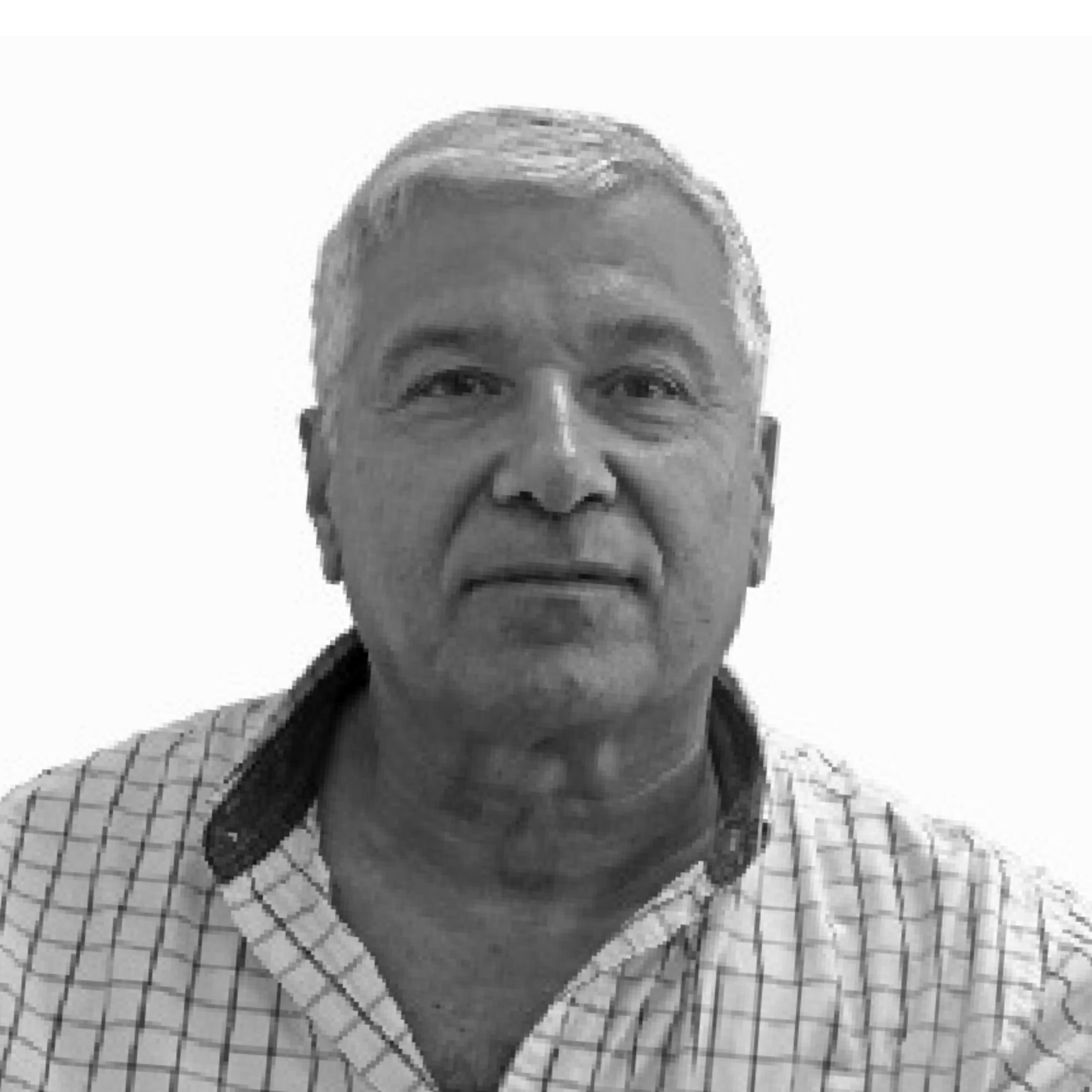 Leo Baeck Institute LondonLand, Power and Resistance in Israel: The Case of the Bedouins of the NegevDr Thabet Abu Rass
German Historical Institute London
In this lecture the state policies toward tens of thousands of the indigenous inhabitants of the Negev region in Israel who live in ‘unrecognized villages’, will be highlighted. Militarizing space to secure land has always been one of the means tocontrol land. The Prawer Plan is the current attempt of displacing the Bedouins to finalize their land claims and urbanize them against their will. The landowners have tried all means of resistance including the legal and political ones, however, they didn’t succeed. Therefore, they returned to their...2015-12-031h 37
Leo Baeck Institute LondonLand, Power and Resistance in Israel: The Case of the Bedouins of the NegevDr Thabet Abu Rass
German Historical Institute London
In this lecture the state policies toward tens of thousands of the indigenous inhabitants of the Negev region in Israel who live in ‘unrecognized villages’, will be highlighted. Militarizing space to secure land has always been one of the means tocontrol land. The Prawer Plan is the current attempt of displacing the Bedouins to finalize their land claims and urbanize them against their will. The landowners have tried all means of resistance including the legal and political ones, however, they didn’t succeed. Therefore, they returned to their...2015-12-031h 37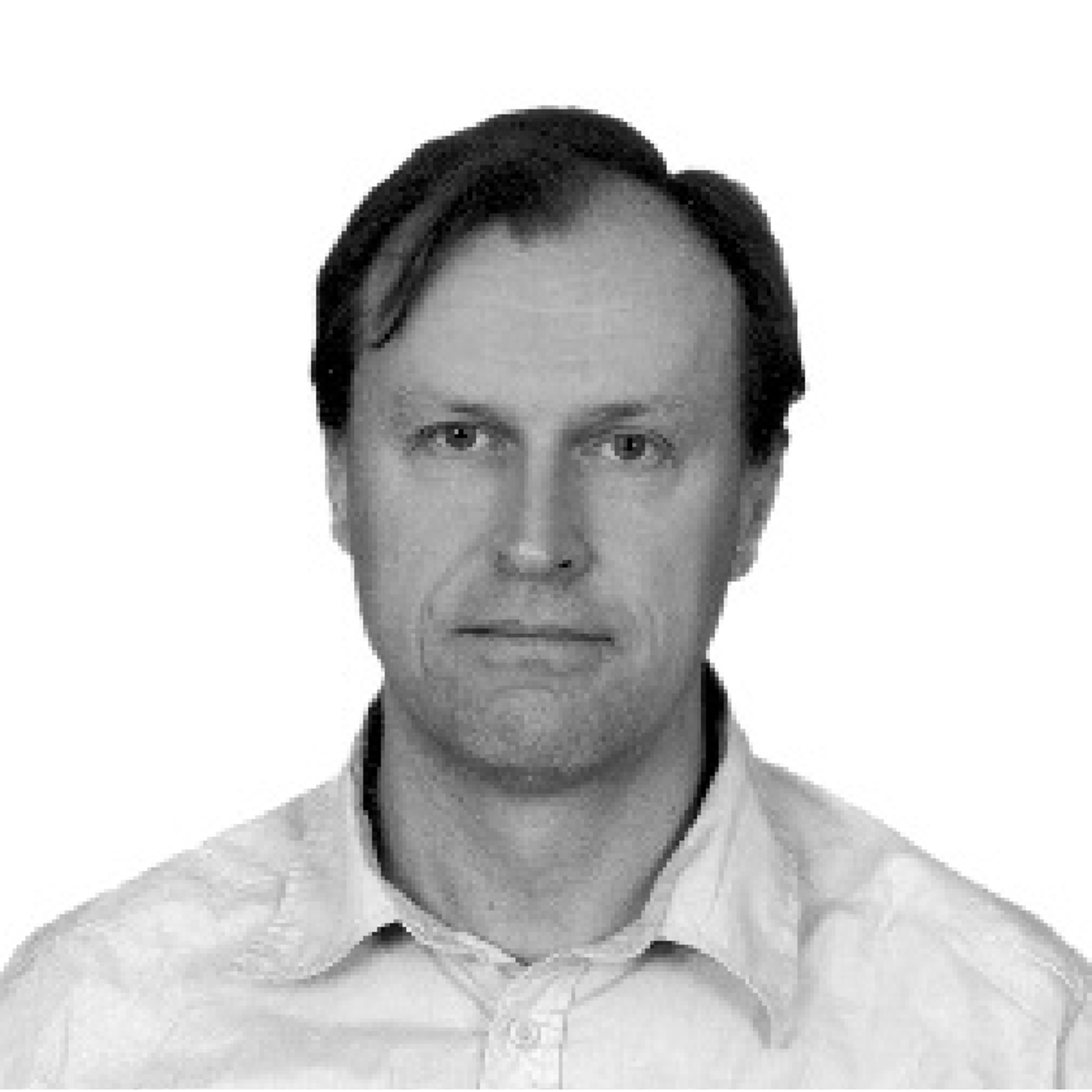 Leo Baeck Institute LondonPast and Politics in the Archaeology of IsraelProf Gunnar LehmannBen Gurion University of the Negev, Israel
German Historical Institute London
The different concepts of the past are an integral part of Israeli politics today. Jewish politics in Israel often seek legitimation through a connection with the physicalremains of the past. As stones do not speak, their presence and their past meanings are explained within the present political discourse of the Israeli society. In some sense, every generation creates its own past. While the national religious and right wing secular sections of the Jewish society have a deep interest in connecting...2015-11-051h 22
Leo Baeck Institute LondonPast and Politics in the Archaeology of IsraelProf Gunnar LehmannBen Gurion University of the Negev, Israel
German Historical Institute London
The different concepts of the past are an integral part of Israeli politics today. Jewish politics in Israel often seek legitimation through a connection with the physicalremains of the past. As stones do not speak, their presence and their past meanings are explained within the present political discourse of the Israeli society. In some sense, every generation creates its own past. While the national religious and right wing secular sections of the Jewish society have a deep interest in connecting...2015-11-051h 22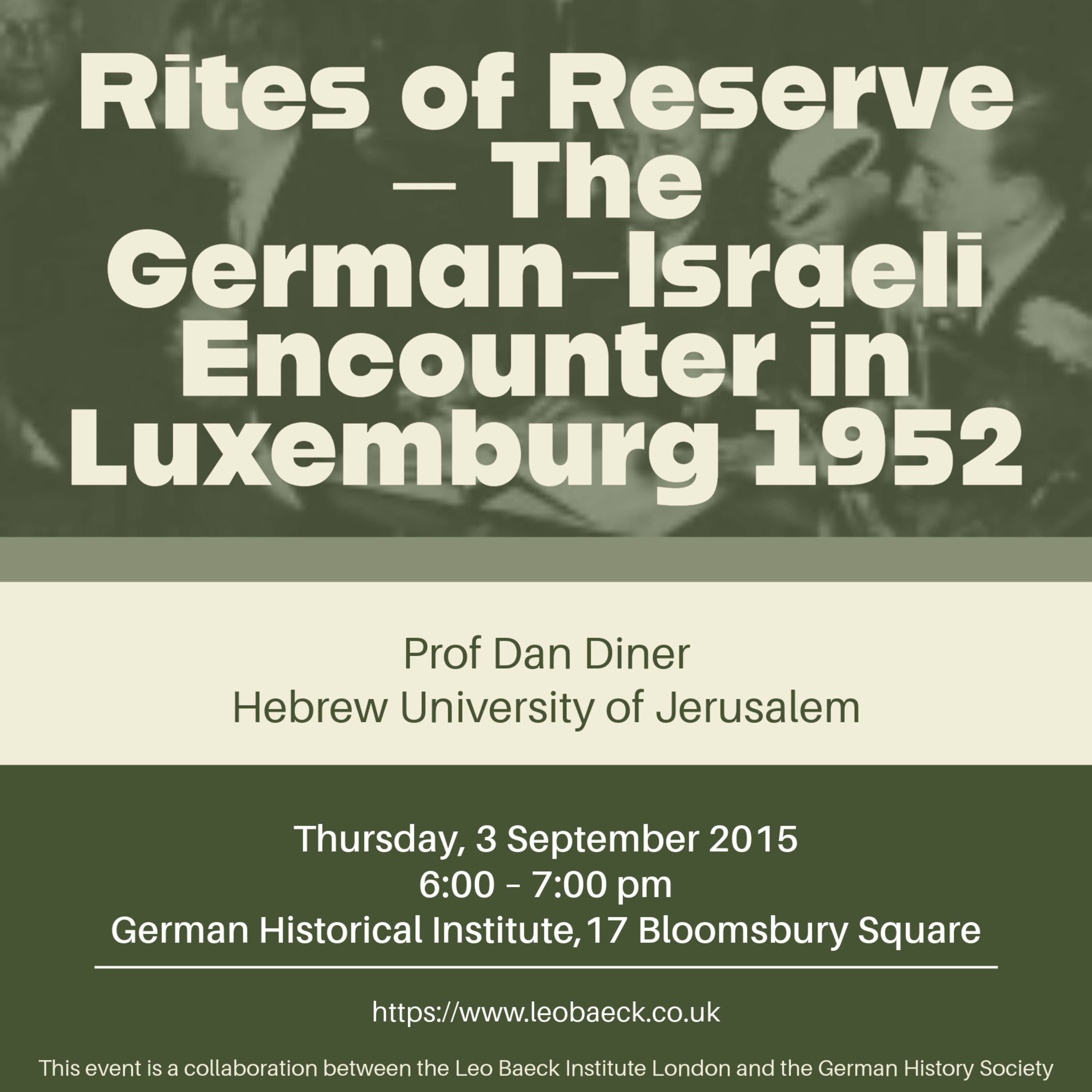 Leo Baeck Institute LondonRites of Reserve – The German-Israeli Encounter in Luxemburg 1952Prof Dan Diner (Hebrew University of Jerusalem)Dr Daniel Wildmann (Acting Director Leo Baeck Institute London) and Prof Elizabeth Harvey (Chair German History Society) are delighted to invite you to a lecture by Prof Dan Diner (Hebrew University of Jerusalem) as part of the German History Society Annual Conference.Rites of Reserve: The German-Israeli Encounter in Luxemburg 1952 The lecture presents, using historical-anthropological 'thick description', the diplomatic scene in Luxemburg on 10 September 1952, at the point when the treaty on restitution was signed between Germany and Israel. It interprets this short scene a...2015-09-0355 min
Leo Baeck Institute LondonRites of Reserve – The German-Israeli Encounter in Luxemburg 1952Prof Dan Diner (Hebrew University of Jerusalem)Dr Daniel Wildmann (Acting Director Leo Baeck Institute London) and Prof Elizabeth Harvey (Chair German History Society) are delighted to invite you to a lecture by Prof Dan Diner (Hebrew University of Jerusalem) as part of the German History Society Annual Conference.Rites of Reserve: The German-Israeli Encounter in Luxemburg 1952 The lecture presents, using historical-anthropological 'thick description', the diplomatic scene in Luxemburg on 10 September 1952, at the point when the treaty on restitution was signed between Germany and Israel. It interprets this short scene a...2015-09-0355 min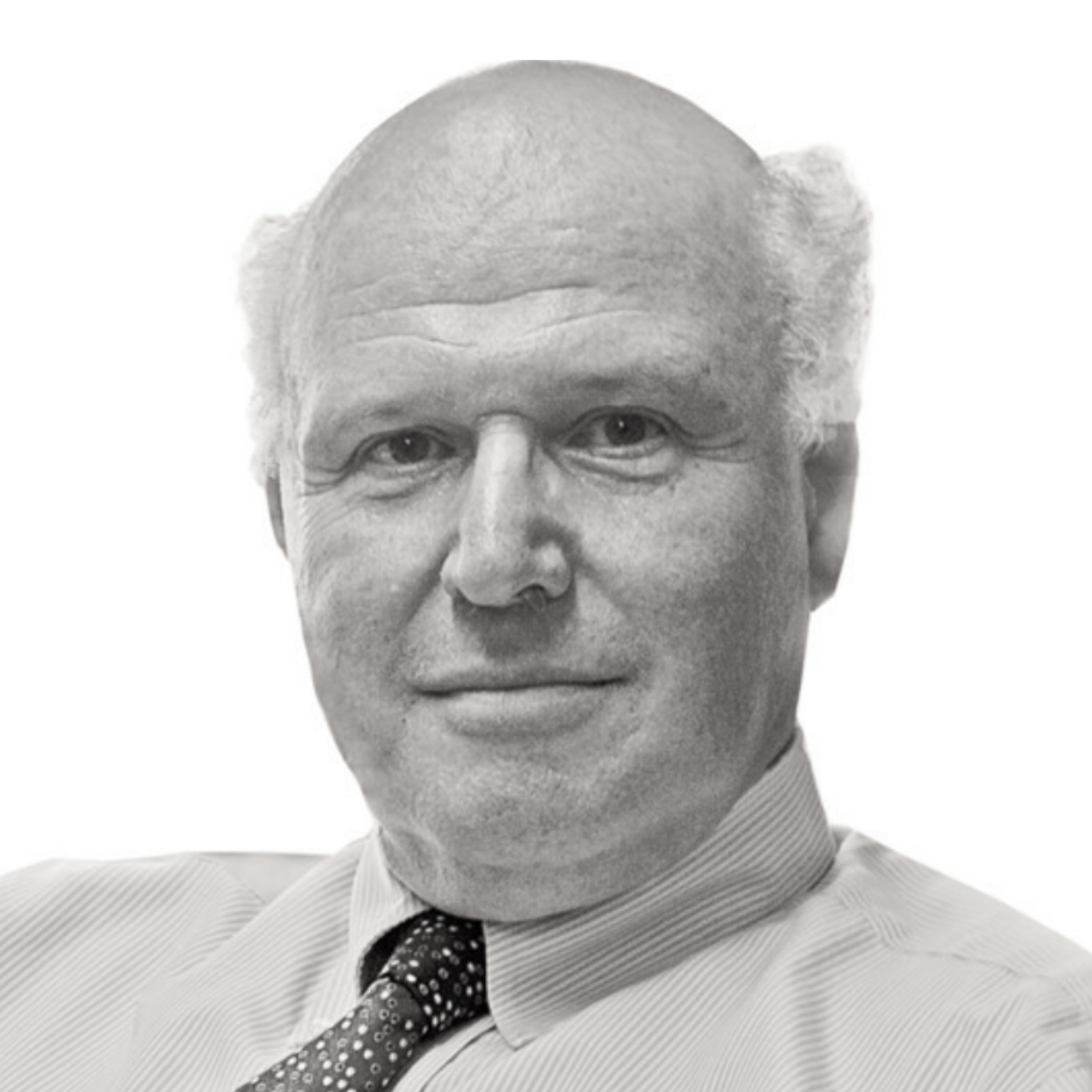 Leo Baeck Institute LondonThe Great War and Jewish MemoryProf. Jay Winter (Yale University, USA)The Great War and Jewish Memory
The Great War shattered Yosef Hayim Yerushalmi’s celebrated distinction between history and memory in Jewish cultural life. Jay Winter argues that Jewish history and Jewish memory collided between 1914 and 1918 in ways which transformed both and created a new category he terms ‘historical remembrance’.
The war unleashed both, centripetal forces, moving Jews to the core of their societies and centrifugal forces, dispersing huge populations of Jews in Eastern Europe and Russia, creating terrifying violence, the appearance of which was a precondi...2014-07-031h 40
Leo Baeck Institute LondonThe Great War and Jewish MemoryProf. Jay Winter (Yale University, USA)The Great War and Jewish Memory
The Great War shattered Yosef Hayim Yerushalmi’s celebrated distinction between history and memory in Jewish cultural life. Jay Winter argues that Jewish history and Jewish memory collided between 1914 and 1918 in ways which transformed both and created a new category he terms ‘historical remembrance’.
The war unleashed both, centripetal forces, moving Jews to the core of their societies and centrifugal forces, dispersing huge populations of Jews in Eastern Europe and Russia, creating terrifying violence, the appearance of which was a precondi...2014-07-031h 40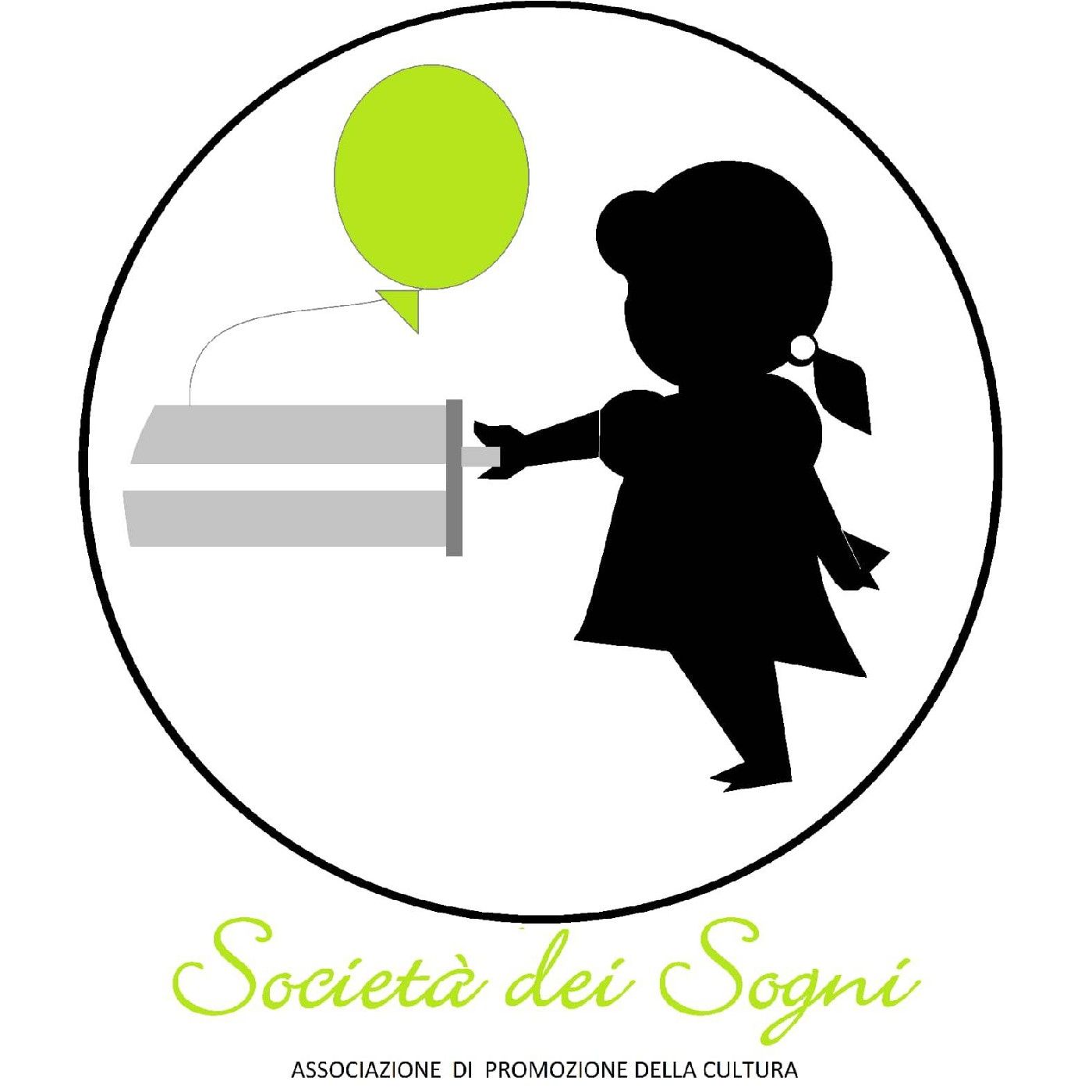 RSDS RADIO SOCIETÀ DEI SOGNIThe TalmudMelvyn Bragg and his guests discuss the history and contents of the Talmud, one of the most important texts of Judaism. The Talmud was probably written down over a period of several hundred years, beginning in the 2nd century. It contains the authoritative text of the traditional Jewish oral law, and also an account of early Rabbinic discussion of, and commentary on, these laws. In later centuries scholars wrote important commentaries on these texts, which remain central to most strands of modern Judaism.With:Philip AlexanderEmeritus Professor of Jewish Studies at the University of...2014-05-2947 min
RSDS RADIO SOCIETÀ DEI SOGNIThe TalmudMelvyn Bragg and his guests discuss the history and contents of the Talmud, one of the most important texts of Judaism. The Talmud was probably written down over a period of several hundred years, beginning in the 2nd century. It contains the authoritative text of the traditional Jewish oral law, and also an account of early Rabbinic discussion of, and commentary on, these laws. In later centuries scholars wrote important commentaries on these texts, which remain central to most strands of modern Judaism.With:Philip AlexanderEmeritus Professor of Jewish Studies at the University of...2014-05-2947 min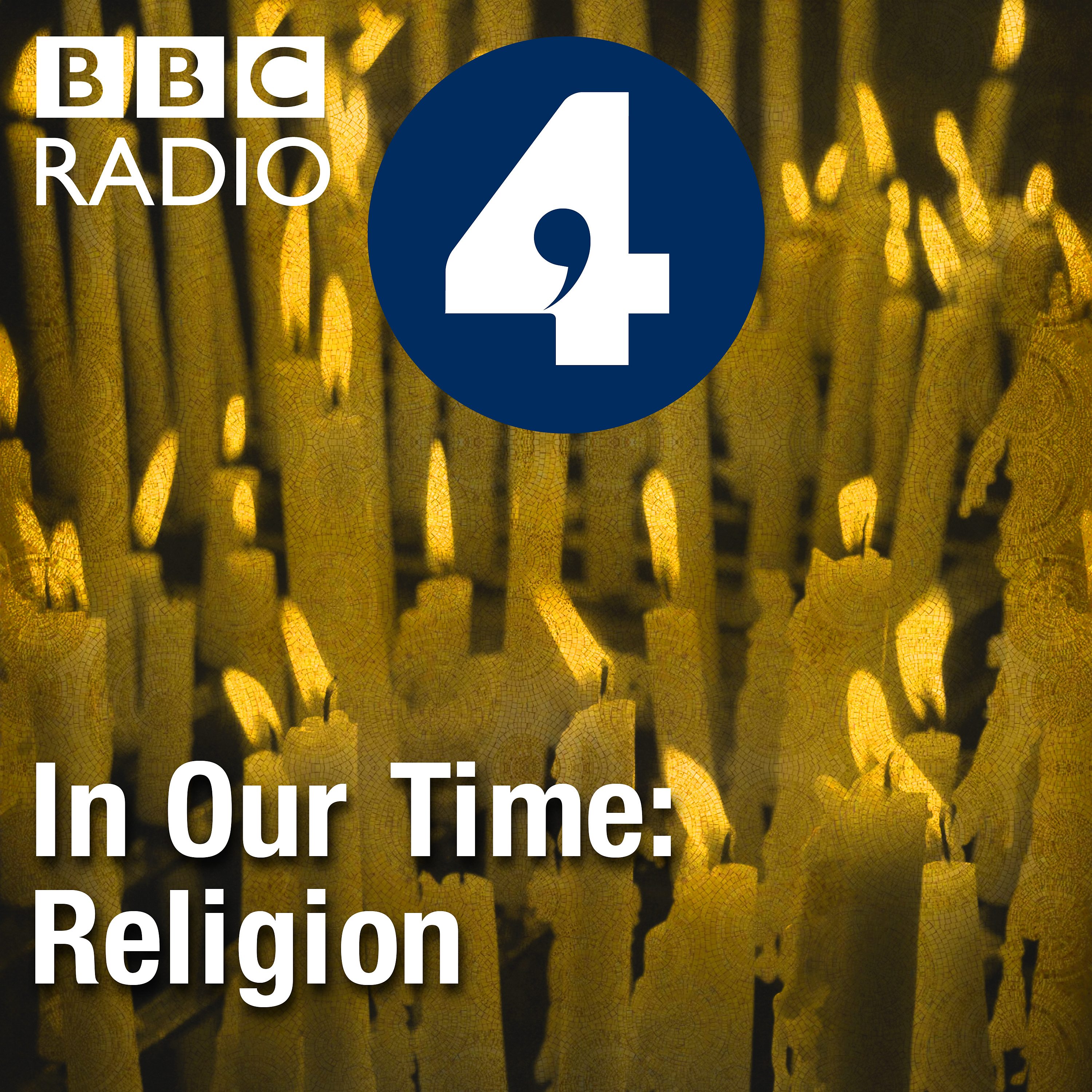 In Our Time: ReligionThe TalmudMelvyn Bragg and his guests discuss the history and contents of the Talmud, one of the most important texts of Judaism. The Talmud was probably written down over a period of several hundred years, beginning in the 2nd century. It contains the authoritative text of the traditional Jewish oral law, and also an account of early Rabbinic discussion of, and commentary on, these laws. In later centuries scholars wrote important commentaries on these texts, which remain central to most strands of modern Judaism.With:Philip Alexander
Emeritus Professor of Jewish Studies at the University of...2014-05-2947 min
In Our Time: ReligionThe TalmudMelvyn Bragg and his guests discuss the history and contents of the Talmud, one of the most important texts of Judaism. The Talmud was probably written down over a period of several hundred years, beginning in the 2nd century. It contains the authoritative text of the traditional Jewish oral law, and also an account of early Rabbinic discussion of, and commentary on, these laws. In later centuries scholars wrote important commentaries on these texts, which remain central to most strands of modern Judaism.With:Philip Alexander
Emeritus Professor of Jewish Studies at the University of...2014-05-2947 min In Our TimeThe TalmudMelvyn Bragg and his guests discuss the history and contents of the Talmud, one of the most important texts of Judaism. The Talmud was probably written down over a period of several hundred years, beginning in the 2nd century. It contains the authoritative text of the traditional Jewish oral law, and also an account of early Rabbinic discussion of, and commentary on, these laws. In later centuries scholars wrote important commentaries on these texts, which remain central to most strands of modern Judaism.With:Philip Alexander
Emeritus Professor of Jewish Studies at the University of...2014-05-2947 min
In Our TimeThe TalmudMelvyn Bragg and his guests discuss the history and contents of the Talmud, one of the most important texts of Judaism. The Talmud was probably written down over a period of several hundred years, beginning in the 2nd century. It contains the authoritative text of the traditional Jewish oral law, and also an account of early Rabbinic discussion of, and commentary on, these laws. In later centuries scholars wrote important commentaries on these texts, which remain central to most strands of modern Judaism.With:Philip Alexander
Emeritus Professor of Jewish Studies at the University of...2014-05-2947 min In Our TimeThe TalmudMelvyn Bragg and his guests discuss the history and contents of the Talmud, one of the most important texts of Judaism. The Talmud was probably written down over a period of several hundred years, beginning in the 2nd century. It contains the authoritative text of the traditional Jewish oral law, and also an account of early Rabbinic discussion of, and commentary on, these laws. In later centuries scholars wrote important commentaries on these texts, which remain central to most strands of modern Judaism.
With:
Philip Alexander
Emeritus Professor of Jewish Studies at the University of Manchester
Rabbi Norman Solomon
Former...2014-05-2948 min
In Our TimeThe TalmudMelvyn Bragg and his guests discuss the history and contents of the Talmud, one of the most important texts of Judaism. The Talmud was probably written down over a period of several hundred years, beginning in the 2nd century. It contains the authoritative text of the traditional Jewish oral law, and also an account of early Rabbinic discussion of, and commentary on, these laws. In later centuries scholars wrote important commentaries on these texts, which remain central to most strands of modern Judaism.
With:
Philip Alexander
Emeritus Professor of Jewish Studies at the University of Manchester
Rabbi Norman Solomon
Former...2014-05-2948 min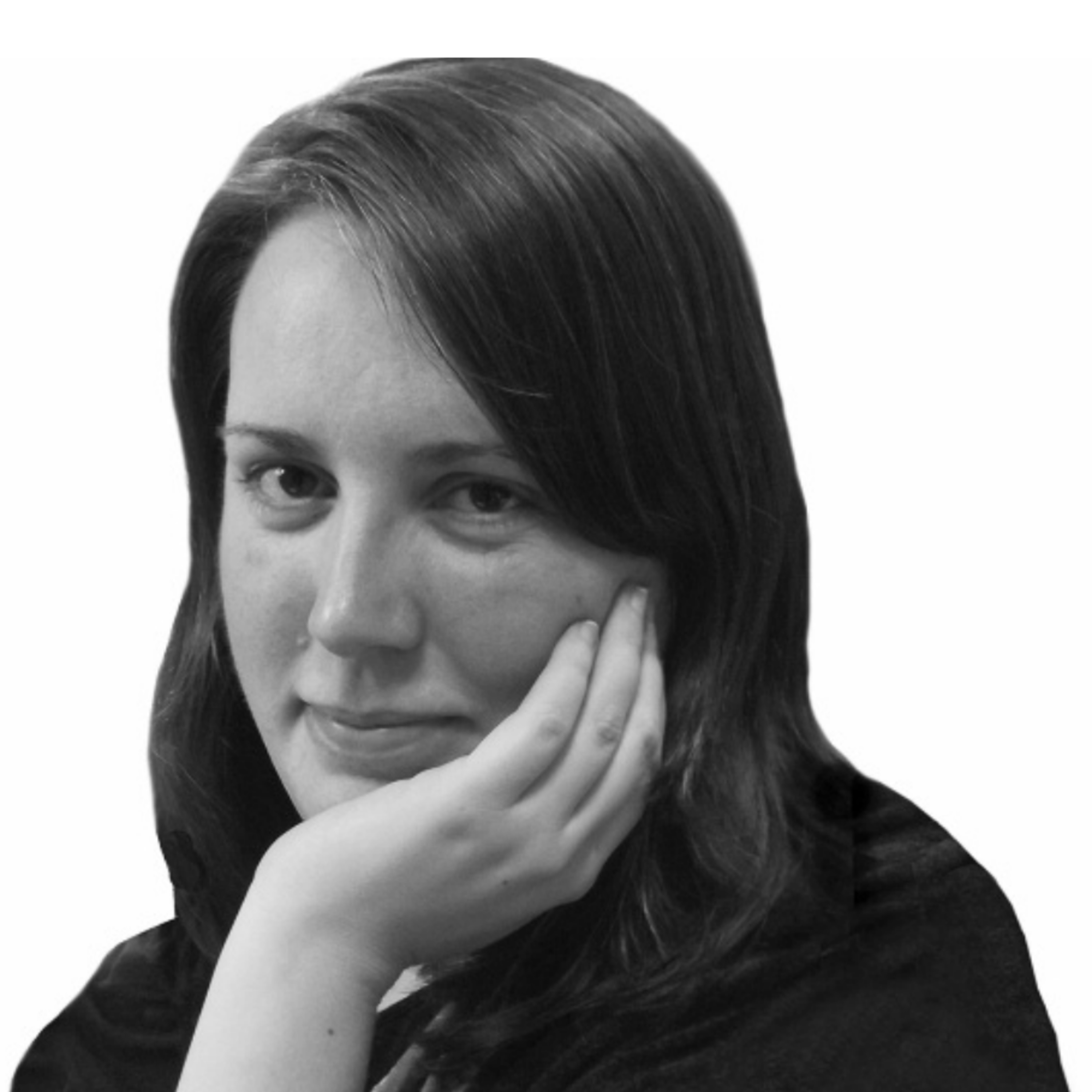 Leo Baeck Institute LondonCurating the Jewish Experience of the First World WarRoz CurrieJewish Military Museum, London
The First World War was a pivotal time of change forthe Jewish community in Britain and indeed throughout Europe and the Middle East. Roz Currie has curated the Jewish Military Museum and Jewish Museum London joint exhibition on this subject. This lecture will discuss the challenges behind telling this story, it will touch on newly uncovered narratives of those at war and also question what it meant to be a British Jew at the outbreak of war.
Roz Currie earned an MA in Japanese and Chinese archaeology at S...2014-04-021h 15
Leo Baeck Institute LondonCurating the Jewish Experience of the First World WarRoz CurrieJewish Military Museum, London
The First World War was a pivotal time of change forthe Jewish community in Britain and indeed throughout Europe and the Middle East. Roz Currie has curated the Jewish Military Museum and Jewish Museum London joint exhibition on this subject. This lecture will discuss the challenges behind telling this story, it will touch on newly uncovered narratives of those at war and also question what it meant to be a British Jew at the outbreak of war.
Roz Currie earned an MA in Japanese and Chinese archaeology at S...2014-04-021h 15 Leo Baeck Institute LondonAnti-Judaism as a System of ThoughtProf David Nirenberg (University of Chicago)
Presented by the Leo Baeck Institute London, in cooperation with QMUL, School of History
In his recent book "Anti-Judaism: The History of a Way of Thinking," David Nirenberg argued that Anti-Judaism should not be thought of as some archaic or irrational closet in the vast edifices of Western thought. Instead, he suggested, it was a powerful conceptual tool, one that played an important role in helping many people make sense of the complex world they lived in. In this lecture he will explain how Anti-Judaism became so central, and de...2014-03-131h 20
Leo Baeck Institute LondonAnti-Judaism as a System of ThoughtProf David Nirenberg (University of Chicago)
Presented by the Leo Baeck Institute London, in cooperation with QMUL, School of History
In his recent book "Anti-Judaism: The History of a Way of Thinking," David Nirenberg argued that Anti-Judaism should not be thought of as some archaic or irrational closet in the vast edifices of Western thought. Instead, he suggested, it was a powerful conceptual tool, one that played an important role in helping many people make sense of the complex world they lived in. In this lecture he will explain how Anti-Judaism became so central, and de...2014-03-131h 20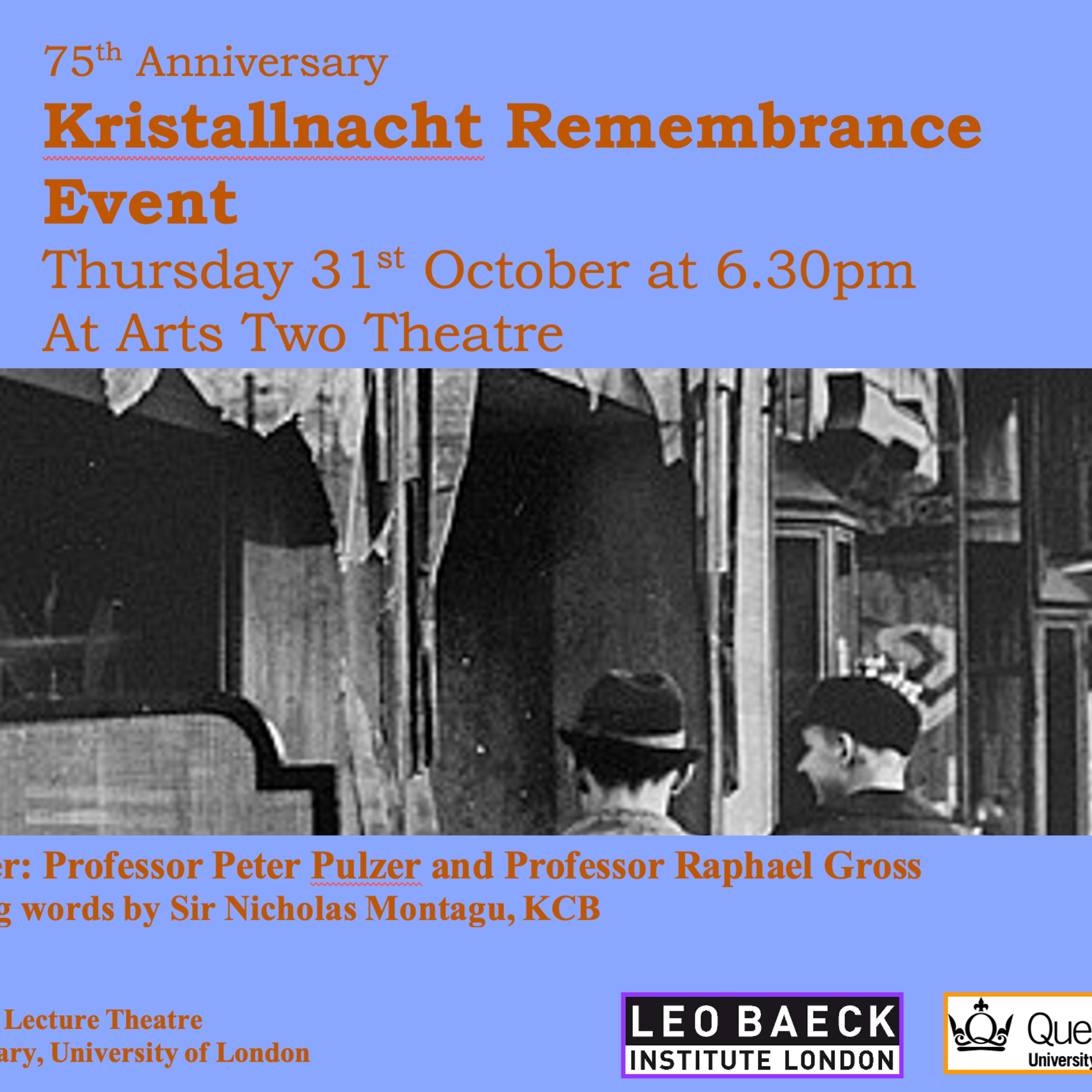 Leo Baeck Institute LondonKristallnacht Remembrance Lecturehttps://www.leobaeck.co.uk/events/special-events/kristallnacht-remembrance-lecture
Opening words by Sir Nicholas Montagu KCB
November 1938: The Story of Herschel Grynszpan
Raphael Gross's talk focuses on Herschel Grynszpan and the diverse reactions to his assassination of the German diplomat Ernst vom Rath. It tells the story of Grynszpan’s background and examine the various responses to and consequences of his action which was used by the Nazis as an excuse for the most significant pogrom against German Jews in history.
The Night of Broken Glass: Looking back...2013-10-312h 00
Leo Baeck Institute LondonKristallnacht Remembrance Lecturehttps://www.leobaeck.co.uk/events/special-events/kristallnacht-remembrance-lecture
Opening words by Sir Nicholas Montagu KCB
November 1938: The Story of Herschel Grynszpan
Raphael Gross's talk focuses on Herschel Grynszpan and the diverse reactions to his assassination of the German diplomat Ernst vom Rath. It tells the story of Grynszpan’s background and examine the various responses to and consequences of his action which was used by the Nazis as an excuse for the most significant pogrom against German Jews in history.
The Night of Broken Glass: Looking back...2013-10-312h 00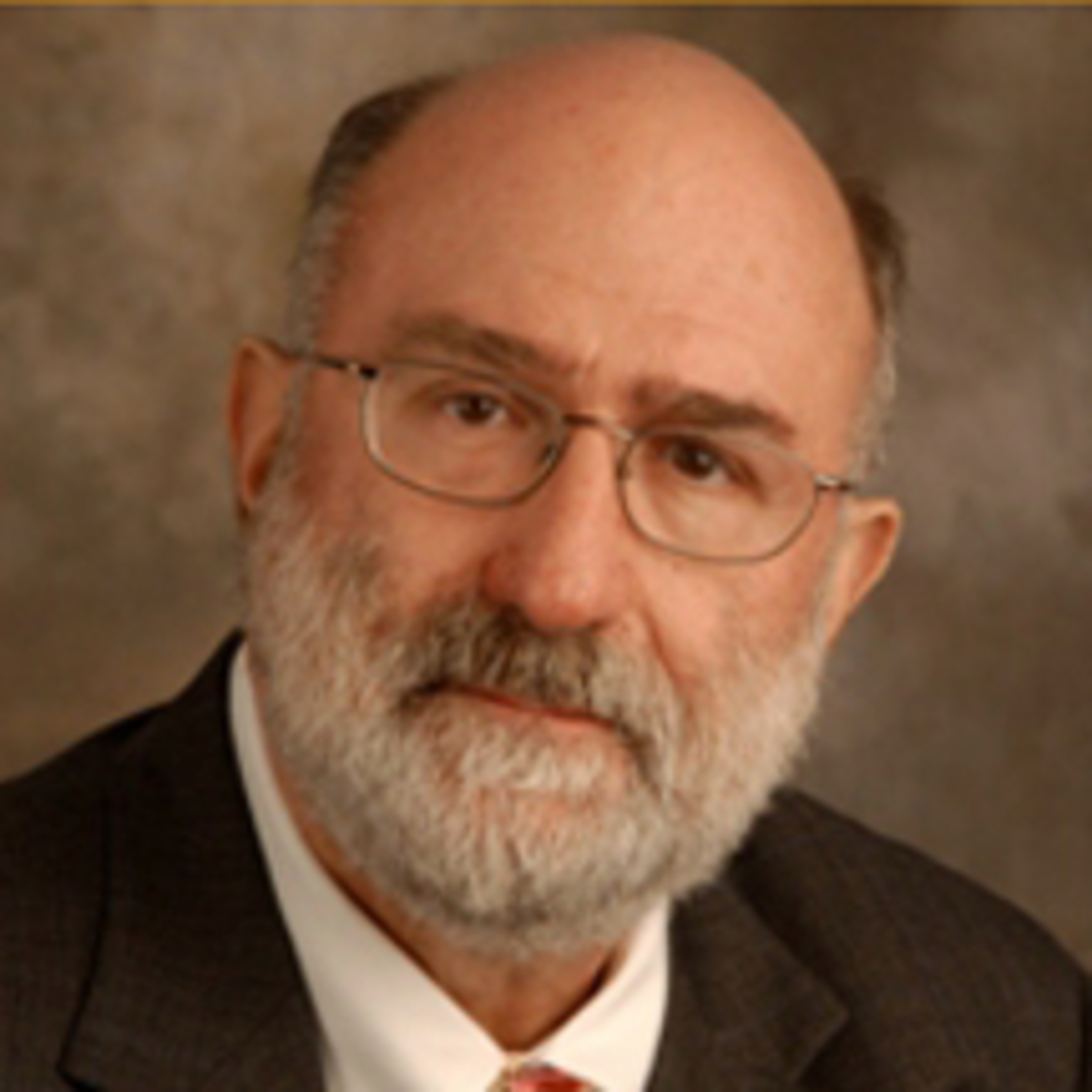 Leo Baeck Institute LondonCosmopolitanism and the JewsProf. Sander L Gilman Chairman, LBI London
Distinguished Professor of the Liberal Arts and Sciences; Professor of Psychiatry Emory University
A lecture organized by the Leo Baeck Institute.
Cosmopolitanism and the Jews
The newest buzzword for globalization is cosmopolitanism. As with many such reuses of older concepts, cosmopolitanism has a complex history, specifically in the German-speaking lands. It is this history and its relationship to the history of German Jewry from the Enlightenment to the Holocaust that will be examined – in a global and perhaps even cosmopolitan manner.
Wednesday, 2nd O...2013-10-021h 10
Leo Baeck Institute LondonCosmopolitanism and the JewsProf. Sander L Gilman Chairman, LBI London
Distinguished Professor of the Liberal Arts and Sciences; Professor of Psychiatry Emory University
A lecture organized by the Leo Baeck Institute.
Cosmopolitanism and the Jews
The newest buzzword for globalization is cosmopolitanism. As with many such reuses of older concepts, cosmopolitanism has a complex history, specifically in the German-speaking lands. It is this history and its relationship to the history of German Jewry from the Enlightenment to the Holocaust that will be examined – in a global and perhaps even cosmopolitan manner.
Wednesday, 2nd O...2013-10-021h 10 Leo Baeck Institute LondonApocalypse Now: Walter Benjamin and the Legacy of Jewish Political MessianismProf Richard Wolin (City University of New York)
CCLS Lecture Theatre (Queen Mary, University of London, Lincoln’s Inn Fields Campus)
How can one explain the fact that Walter Benjamin’s youthful essay on political violence, “The Critique of Violence” (1921), has, among representatives of the post-political “academic left” (Derrida, Zizek, Agamben), acquired canonical status? What did Benjamin mean when, referring to the Old Testament (Numbers 16, 1-32), he praised the expiatory powers of “divine violence,” which, as he puts it, “strikes privileged Levites, strikes them without warning . . . and does not stop short of annihilation”? Lastly, how might one explain the...2013-06-051h 44
Leo Baeck Institute LondonApocalypse Now: Walter Benjamin and the Legacy of Jewish Political MessianismProf Richard Wolin (City University of New York)
CCLS Lecture Theatre (Queen Mary, University of London, Lincoln’s Inn Fields Campus)
How can one explain the fact that Walter Benjamin’s youthful essay on political violence, “The Critique of Violence” (1921), has, among representatives of the post-political “academic left” (Derrida, Zizek, Agamben), acquired canonical status? What did Benjamin mean when, referring to the Old Testament (Numbers 16, 1-32), he praised the expiatory powers of “divine violence,” which, as he puts it, “strikes privileged Levites, strikes them without warning . . . and does not stop short of annihilation”? Lastly, how might one explain the...2013-06-051h 44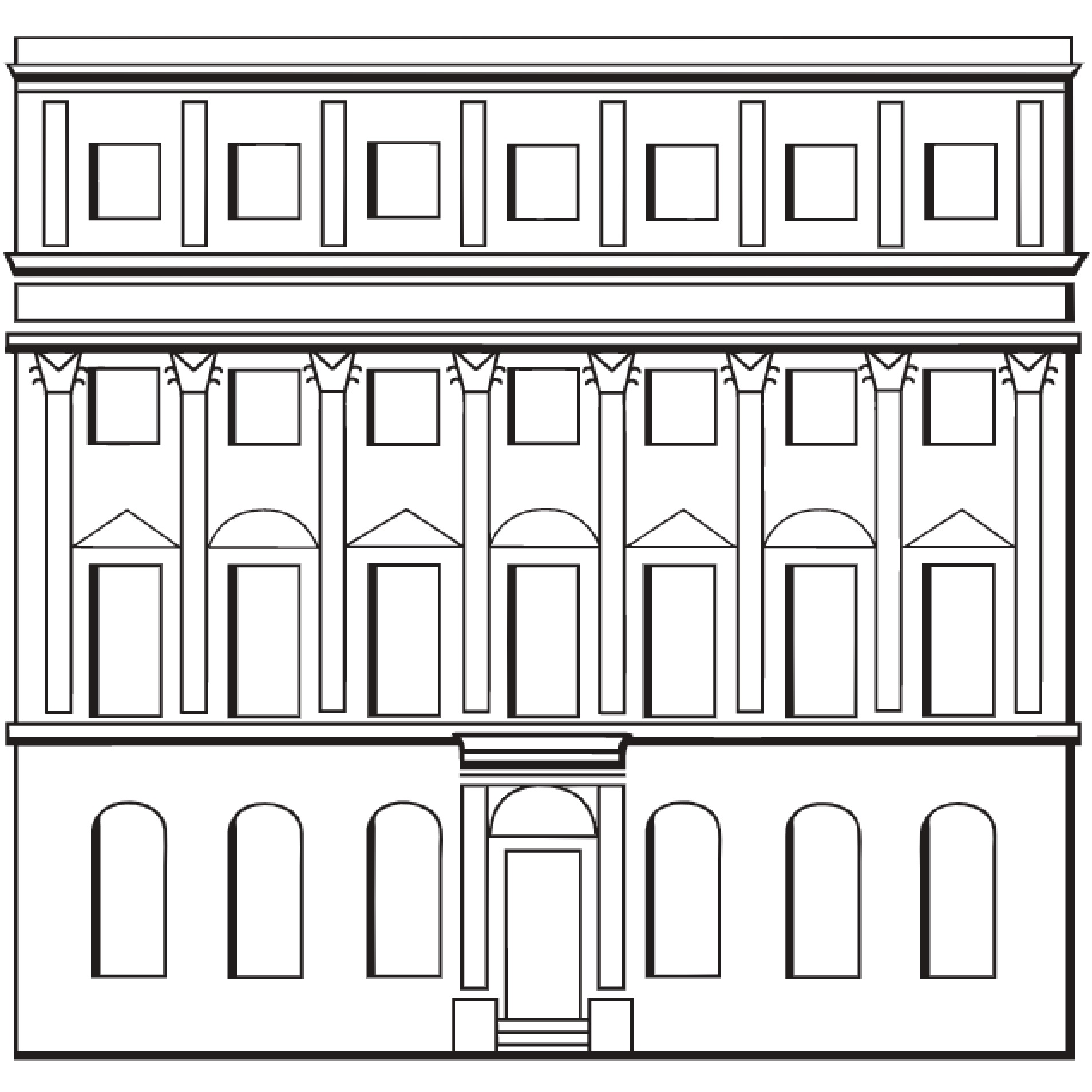 German Historical Institute London PodcastDavid Fraser: ‘Quite Contrary to the Principles of British Justice’: The Jews of the Channel Islands 1940-1945From 1940 to 1945 the Channel Islands were the only part of Britain to fall under Nazi occupation. German anti-Jewish decrees became part of the Islands’ legal structures. Local police and government officials identified and registered the few remaining Jews. Jewish property was Aryanized and Jews were deported, all with the knowing involvement of government officials who remained officially loyal to the British Crown. This lecture examines both the legal and moral failures and the ambiguities which surrounded this little known part of British Jewish history. (This paper was given on 7 March 2013 at the German Historical Institute London as part of the Eu...2013-05-2845 min
German Historical Institute London PodcastDavid Fraser: ‘Quite Contrary to the Principles of British Justice’: The Jews of the Channel Islands 1940-1945From 1940 to 1945 the Channel Islands were the only part of Britain to fall under Nazi occupation. German anti-Jewish decrees became part of the Islands’ legal structures. Local police and government officials identified and registered the few remaining Jews. Jewish property was Aryanized and Jews were deported, all with the knowing involvement of government officials who remained officially loyal to the British Crown. This lecture examines both the legal and moral failures and the ambiguities which surrounded this little known part of British Jewish history. (This paper was given on 7 March 2013 at the German Historical Institute London as part of the Eu...2013-05-2845 min German Historical Institute London PodcastBrian Klug: Dealing with Difference: Jews, Muslims and the British Left TodayGenerally speaking, the British left has been on the side of the disadvantaged and the oppressed. For this reason, socialists, radicals and liberals have instinctively rallied to the cause of newcomers in an increasingly multicultural society. But circumstances have changed and the waters now are muddied. This lecture will explore the reasons why it is difficult for the left today, given its origins and orientations, to deal with Muslim and Jewish difference when that difference is asserted by Jews and Muslims themselves. (This paper was given on 16 May 2013 at the German Historical Institute London as part of the European Leo...2013-05-2858 min
German Historical Institute London PodcastBrian Klug: Dealing with Difference: Jews, Muslims and the British Left TodayGenerally speaking, the British left has been on the side of the disadvantaged and the oppressed. For this reason, socialists, radicals and liberals have instinctively rallied to the cause of newcomers in an increasingly multicultural society. But circumstances have changed and the waters now are muddied. This lecture will explore the reasons why it is difficult for the left today, given its origins and orientations, to deal with Muslim and Jewish difference when that difference is asserted by Jews and Muslims themselves. (This paper was given on 16 May 2013 at the German Historical Institute London as part of the European Leo...2013-05-2858 min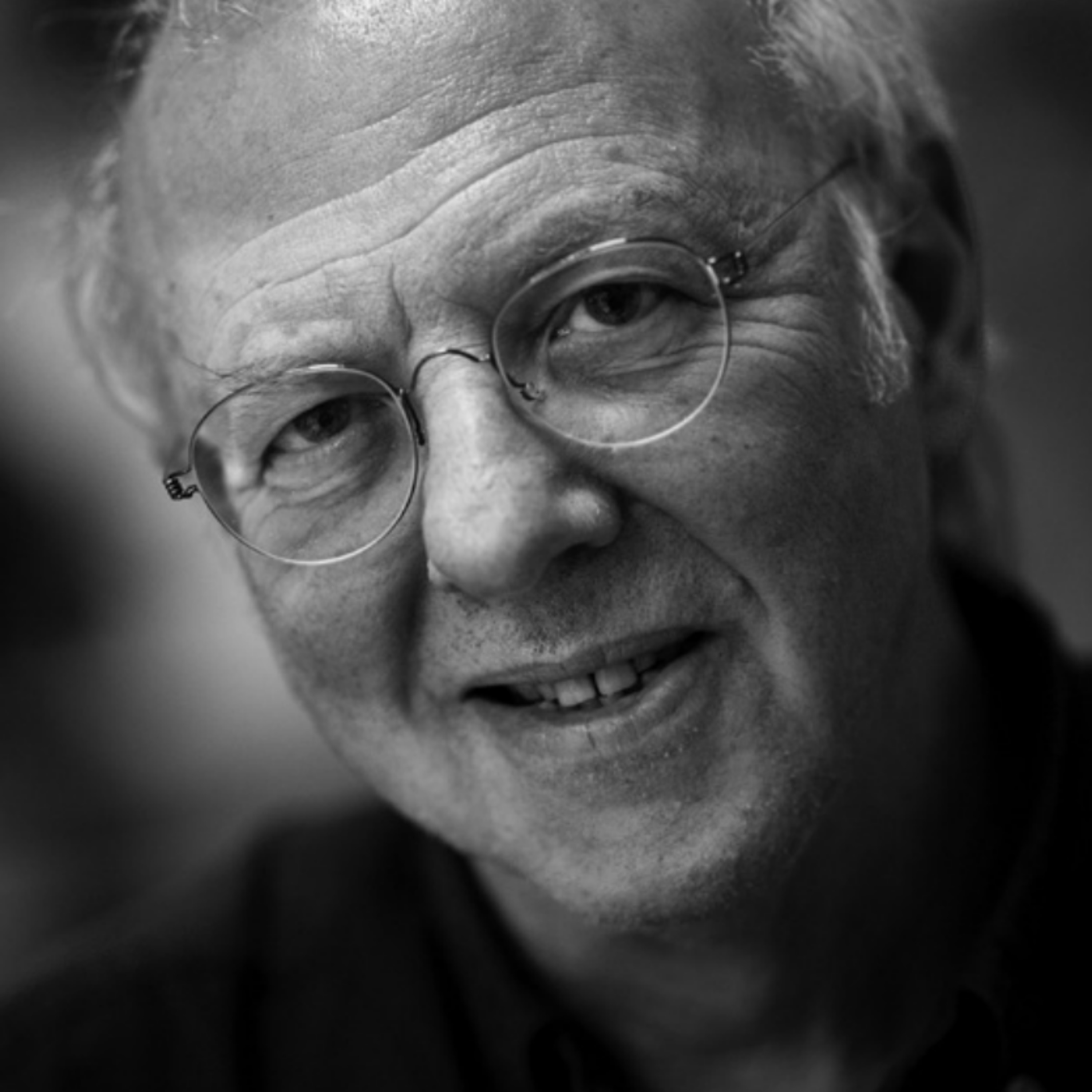 Leo Baeck Institute LondonDealing with Difference:Jews, Muslims and the British Left TodayDr. Brian Klug
University of Oxford, UK
Generally speaking, the British left has been on the side of the disadvantaged and the oppressed. Forthis reason, socialists,radicals and liberals have instinctively rallied to the cause of newcomers in an increasingly multicultural society. But circumstances have changed and the waters now are muddied.
This lecture will explore the reasons why it is difficult forthe left today, given its origins and orientations, to deal with Muslim and Jewish difference when that difference is asserted by Jews and Muslims themselves.
Brian Klug is Senior Res...2013-05-161h 40
Leo Baeck Institute LondonDealing with Difference:Jews, Muslims and the British Left TodayDr. Brian Klug
University of Oxford, UK
Generally speaking, the British left has been on the side of the disadvantaged and the oppressed. Forthis reason, socialists,radicals and liberals have instinctively rallied to the cause of newcomers in an increasingly multicultural society. But circumstances have changed and the waters now are muddied.
This lecture will explore the reasons why it is difficult forthe left today, given its origins and orientations, to deal with Muslim and Jewish difference when that difference is asserted by Jews and Muslims themselves.
Brian Klug is Senior Res...2013-05-161h 40